#the dramedy takes a heartbreaking turn
Text
'It's been five years since Phoebe Waller-Bridge and Andrew Scott positively demolished all of our hearts in a mere six episodes of Fleabag, via the exceptionally unlikely pairing of the show's sex-obsessed protagonist and the "hot priest" she falls for in Season 2. And while both talents have gone on to plenty of other high-profile projects in the half-decade since that heartbreaking bus stop scene, news of a potential reunion between the pair has our Fleabag-loving hearts thumping at the thought.
While promoting Ripley, his new Netflix adaptation of the classic Patricia Highsmith novel, Scott gave eager fans an update on whether he and Waller-Bridge will be collaborating again onscreen anytime soon. He happily told Vogue:
We’ve definitely got things cooking. I’d love to work with her again. She’s just a singular, wonderful person.
Prior to Fleabag, the 47-year-old Irishman was already known to fans for his BAFTA-winning turn as the villainous James Moriarty in the BBC series Sherlock, as well as memorable roles in the James Bond movie Spectre and historical films like Pride and 1917. But playing the man known simply as "Hot Priest" (like "Fleabag" herself, Scott's character actually doesn't have a name) in the Golden Globe-winning dramedy made the actor a household name among fans, earning him a Critics' Choice Award win for "Best Supporting Actor," as well as Golden Globe and SAG Award nominations.
So it's not surprising that Scott would want to see if lightning can strike twice with his former collaborator and longtime friend Phoebe, whom he met while working on the play Roaring Trade at London's Soho Theater 15 years ago. And it sounds like Waller-Bridge — who has been busy with developing that Tomb Raider TV series, starring in an Indiana Jones movie and punching up James Bond scripts — is equally keen to stage a much-anticipated reunion with the actor, calling him "an absolute pixie of mischief" in the Vogue piece. She said of her onscreen love:
I could write a novel [about him]. But I love how naughty he is. He has the magical ability to make you feel instantly present—no matter what’s going on in your life, you’re suddenly there in the moment and feeling joyful. I think that’s what it’s like to watch him as an actor too…like he can stop time with his honesty.
As for what the potential reunion could entail, Waller-Bridge hinted at what she'd want to see acting-wise from Scott next:
I’d love to see him do a fully unhinged slapstick comedy character. Someone who is outraged at everything, all of the time.
Take our money! After making us weep not only with Fleabag but also his recent film, the gorgeously sad All of Us Strangers co-starring Paul Mescal, it would be nice to see Andrew Scott get to brighten up in a comedy. (After all, we don't expect many laughs from the murderous Tom Ripley.)
While you wait to hear about Andrew Scott and Phoebe Waller-Bridge's upcoming collaboration, you can revisit their most famous one as Fleabag and Hot Priest — Fleabag is available to stream now with an Amazon Prime Video subscription.'
#Andrew Scott#Fleabag#Hot Priest#Phoebe Waller-Bridge#Vogue#Paul Mescal#All of Us Strangers#Ripley#Prime Video#BAFTA#Sherlock#Moriarty#Patricia Highsmith#Pride#1917#Golden Globes#Critics Choice#SAG
1 note
·
View note
Text
My 25 Favorite Films of 2020
Well, this was quite the crazy year, especially for movies. While many films that were slated to be released this year were postponed due to the coronavirus pandemic, this year still provided some laughs, tears, and thrills both in theaters and in the living room.
(NOTE: Due to the delayed awards season calendar and postponed Oscar bait films that are unavailable to be seen before the end of 2020, this list will eventually be updated after having seen the following films: The Father, Minari, News of the World, Nomadland, One Night in Miami, Pieces of a Woman, Promising Young Woman)
Here are my 25 favorite films of the year:
25. Kajillionaire
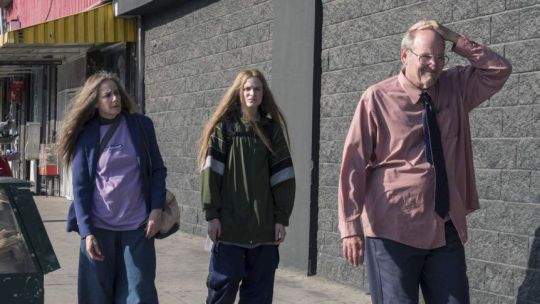
Quirky filmmaker Miranda July is back with her first feature in nearly a decade. Kajillionaire is a bizarre but captivating tale about a family of criminal grifters and how the daughter reevaluates her strained relationship with her parents after an outsider is welcomed into the fold. Evan Rachel Wood takes what could have easily been dismissed as a goofy caricature in Old Dolio (yes, that’s her name) and turns into a heartfelt portrayal of a woman whose lifestyle of freeloading dictated by her parents (played by Debra Winger and Richard Jenkins) becomes her own crisis. In many ways, Kajillionaire feels like a fantasy that keeps people asking, “What on earth is going on?” And this time, it’s for the best.
24. Freaky

Revamping decades-old plots like the body-swapping antics from Freaky Friday can either result in a predictable failure or a surprising success. Thankfully, Freaky falls into the latter category. In this horror comedy, a deranged serial killer (played by Vince Vaughn) swaps bodies with his victim, a timid teen girl (played by Kathryn Newton). What makes the film work though are the dedicated lead performances, particularly by Vaughn, who is pretty convincing as young girl trapped in a grown man’s body. With a few good laughs and decent thrills, Freaky is worth the watch.
23. The Outpost
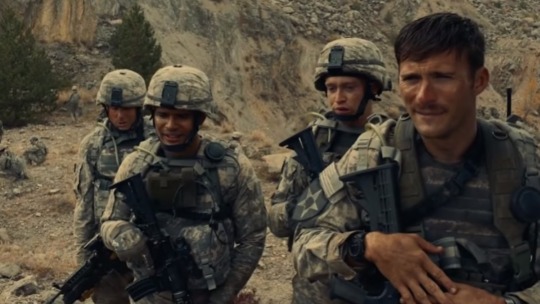
The Outpost is an intense film about the real-life story of small group of US troops isolated by surrounding mountains in Afghanistan, under the constant threat of the Taliban, which ultimately comes to a head in the Battle of Kamdesh. The film captures the harrowing experiences of these soldiers with heart-pounding action sequences, which are fueled by a solid cast including Scott Eastwood, Caleb Landry Jones, and Orlando Bloom.
22. Uncle Frank
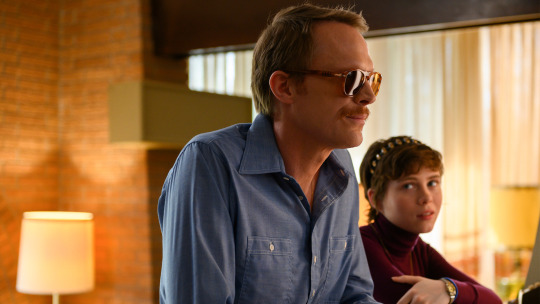
Paul Bettany may be best known for playing The Vision in the Marvel Cinematic Universe, but he should be celebrated as his title character in Uncle Frank, a touching dramedy set in 1973 about an NYU professor who returns home to his estranged family for his father’s funeral while his niece, played by rising star Sophia Lillis, idolizes him for teaching her to be her authentic self while he keeps his sexuality a secret. Bettany brilliantly balances the coolness of his stature with the internal agony that ultimately hits a boiling point, which is counterbalanced by Peter Macdissi’s fun performance as Frank’s happy-go-lucky lover who accompanies him back home despite his wishes.
21. Hillbilly Elegy
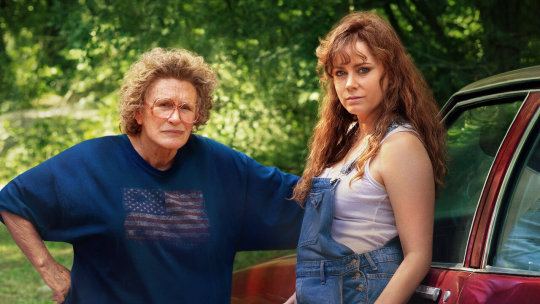
Hillbilly Elegy was panned by critics over politics that had absolutely no role the film. Based on the best-selling memoir by J.D. Vance, the newest feature from Ron Howard shows the journey of a boy who despite all odds growing up in a poor family that constantly struggled with abuse and addition managed to get into Yale Law School and achieve the American dream. While both Gabriel Basso and Owen Asztalos hold the film together as the younger and older Vance in the present and flashback scenes, Amy Adams as the impulsive, irresponsible mother and an unrecognizable Glenn Close as the no-nonsense inspiring grandmother that turn Hillbilly Elegy into an acting tour de force.
20. The Trial of the Chicago 7

Oscar-winning screenwriter Aaron Sorkin sits in the director’s chair once again in this courtroom drama about the real-life protesters who showed up in Chicago during the 1968 Democratic National Convention. With themes that resonate today, The Trial of the Chicago 7 benefits from its sharp screenplay, well-paced editing, and an outstanding ensemble cast that includes Eddie Redmayne, Mark Rylance, Yahoo Abdul-Mateen II, Sacha Baron Cohen, Jeremy Strong, Frank Langella, Joseph Gordon-Levitt, and Michael Keaton.
19. Yellow Rose
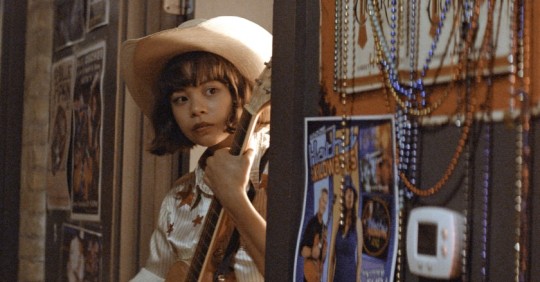
Broadway actress Eva Noblezada makes her film debut as an aspiring country singer on the run after her mother, an illegal immigrant, is obtained for deportation. Yellow Rose presents a nuanced depiction of US immigration, but at the heart of it is a heartbreaking story of a young woman who struggles between putting her family or her dreams first. Between Noblezada’s powerful performance and solid original music, Yellow Rose hits all the right chords.
18. Palm Springs
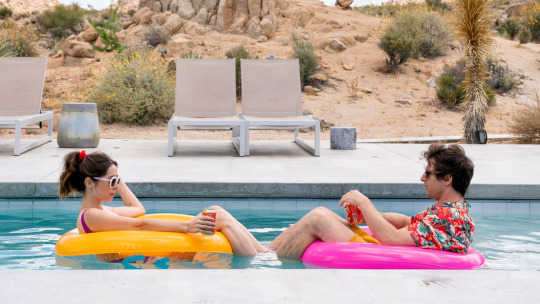
Move over, Groundhog Day. While the Bill Murray classic has largely monopolized the time loop film genre, Palm Springs gives it a run for its money. Andy Sandberg and Cristin Milioti star as the unlikely duo who are stranded reliving the same dreaded wedding day involving mutual acquaintances and their desperate efforts to escape the seemingly inescapable. The Hulu comedy stands on its own two feet for the good laughs, the chemistry between the two leads, and the film’s emotionally-grounded plot.
17. Let Him Go

Kevin Costner and Diane Lane reunite on the big screen after playing farmer parents in Man of Steel to rancher grandparents in Let Him Go, although this time they are able to display their full acting chops. In this period dramatic thriller, they set out to find their only grandchild following the death of their son only to discover that the widowed daughter-in-law remarried into an infamous crime family. While both Costner and Lane tug at the heartstrings, it’s Lesley Manville, who plays the ruthless matriarch of the family, that really takes command of the screen. Ultimately, Let Him Go is all about family and the lengths one is willing to go to protect it.
16. Unhinged

In a year plagued by the pandemic, Unhinged led the way to the revival of movie theaters back in August and perhaps in some ways it was meant to be the film to do so as the themes of a rage-fueled society and the lack of human connection carry weight. Russell Crowe stars, as the title suggests, as an unhinged psychopath whose road rage torments a woman and her adolescent son. Unhinged is the epitome of pure entertainment and is why we go to the movies. While it’s not quite the most sophisticated thriller of the year, it’s still one helluva ride.
15. Emma

Anya Taylor-Joy has had quite the year with both highs (The Queen’s Gambit) and lows (The New Mutants). But it began before the pandemic with the release of Emma, which she stars as the iconic Jane Austen title character, a socialite who meddles in the love life of others while refusing to acknowledge her own shortcomings in that department. Supported with a strong ensemble cast, beautiful production design, and comedic charm, Emma is not to be missed.
14. The Invisible Man

ln the era of remakes and reboots, very few are as good as Universal’s latest monster flick revival of The Invisible Man. Elisabeth Moss stars as a woman who believes she’s being haunted by her abusive ex-husband, someone she becomes convinced faked his own death and is stalking her without being able to be seen. Filmmaker Leigh Whannell, the writer behind the Saw and Insidious horror franchises, generates good thrills and high-wire tension with the help of high production value and a terrifyingly-good performance from Moss.
13. Dick Johnson is Dead

Documentarian Kirsten Johnson filmed a beautiful, intimate tribute to her father Dick Johnson, who has been suffering from Alzheimer's in the final years of his life. However, instead of dreading his death, both daughter and father embrace it by having him acting out several scenes of his over-the-top demises. Dick Johnson is Dead may focus on the subject manner of death, but this documentary actually celebrates life and the laughs that happen along the way.
12. The Wolf of Snow Hollow
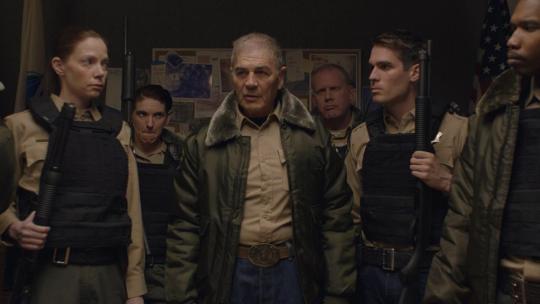
Perhaps one of the littlest-known films of the year, The Wolf of Snow Hollow is not your conventional indie comedy horror flick. Writer/director Jim Cummings stars as an overly-heated police officer who attempts to get to the bottom of a string of murders in his small, snowy Utah town by what appears to be some sort of werewolf, though he remains unconvinced. Featuring one of the final performances from veteran actor Robert Forster, The Wolf of Snow Hollow uses its quirky sense of humor to stand out from the rest of the pack.
11. The Gentlemen

The Gentlemen is a fun, action-packed, crime caper from Guy Ritchie about the London turf war of drug kingpins. Matthew McConaughey, Charlie Hunnam, Henry Goulding, Michelle Dockery, and Colin Ferrell all round out the strong cast, but its Hugh Grant that really steals the show as the comedically manipulative Fletcher, whose only allegiance is to himself. If you like a stylish film with well-choreographed violence and a fast-paced plot, The Gentlemen should be your cup of tea.
10. Ma Rainey’s Black Bottom

Some of the best play-to-film adaptations are the films that feel like you’re watching a play, and Ma Rainey’s Black Bottom is one of them. Produced by Denzel Washington, Viola Davis gives a transformative performance as Ma Rainey, known as the “mother of the blues” and the clash she had with a pair of White music producers, but she also butts heads with her trumpet player (played by the late Chadwick Boseman), who also has his own music ambitions. While Davis obviously gives other Oscar-worthy performance, it was Boseman who was able to show how incredibly gifted he was as an actor. And while the world lost him far too soon, at least his last role ended up being his greatest.
9. The Kid Detective
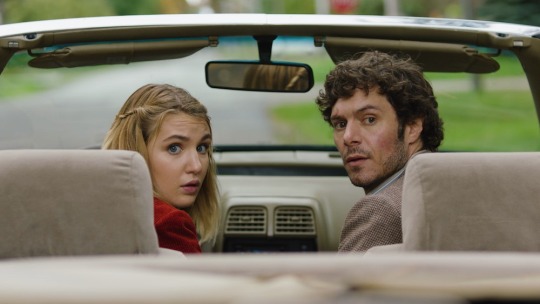
One of the biggest surprises of the year was how good a movie starring and produced by Adam Brody was. Brody plays a washed up former kid detective who attempts to revive his once-celebrated career of solving mysteries by getting to the bottom of a murder in his hometown. The Kid Detective is a brilliant dark comedy from newcomer writer/director Evan Morgan with good laughs, plenty of plot twists, and a career-best performance from Brody, who proves he’s more than just the pretty face from The O.C. we all know him as.
8. Mank
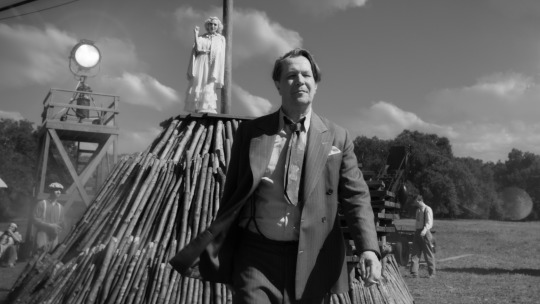
Citizen Kane is widely regarded as one of the greatest films ever made and Mank is a worthy tribute. Gary Oldman stars as the title character Herman “Mank” Mankiewicz, the Oscar-winning screenwriter behind the iconic film. David Fincher (The Social Network, Gone Girl) managed to capture the epic scale of the 1941 classic that would make Orson Welles proud.
7. Soul
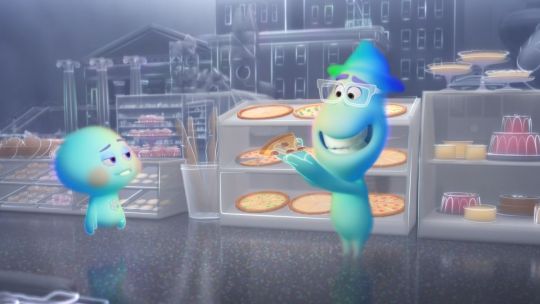
Soul is one of those rare existential Pixar films that goes beyond being children’s entertainment. Following in the footsteps of 2015′s Inside Out, Soul depicts what happens to the soul of a jazz musician who’s convinced his time on Earth isn’t over. While the universe created to explain how souls work and the plot that went along with it falls short of its emotions predecessor, Soul is still high-caliber among Pixar films and a great movie for both kids and adults alike.
6. Another Round

Perhaps the greatest work from Swedish director Thomas Vinterberg to date, Another Round follows four unsatisfied middle aged men who decide to take a theory of task from a Norwegian psychiatrist, who concluded that maintaining a blood alcohol level of 0.050 will enhance their mental and psychological state. Mads Mikkelsen, who’s best known to American audiences as Hannibal Lecter in the short-lived NBC series Hannibal and the Bond villain in Casino Royale, offers a strong, nuanced performance as one of the four educators who embraces this drinking challenge in a film that provides an equal balance of chuckles, cringes, and emotional gut punches.
5. I’m Thinking of Ending Things

From the crazy mastermind of Charlie Kaufman, the writer behind Being John Malkovich, Eternal Sunshine of the Spotless Mind, and Anomalisa, his latest on Netflix is too a mind-bender. I’m Thinking of Ending Things is a surreal, zany, and at times disturbing examination of the human condition as the nameless female protagonist played by an incredible Jessie Buckley mulls over breaking up with her boyfriend (played by Jesse Plemons) while visiting his parents’ house. Accompanied with a stellar production design and a crazy-good performance from Toni Collette as “Mother,” Kaufman newest cerebral feature lives up to his iconic reputation of filmmaking.
4. Da 5 Bloods

Spike Lee is one of the few genius filmmakers who is able to blend multiple genres together and his latest film is no different. Da 5 Bloods is an action adventure, buddy comedy, dramatic character study, and war movie all wrapped up into one about a group of Vietnam War veterans who return to the former battlegrounds to find the remains of one of their fallen soldiers as well as some treasure that they kept hidden years ago. With a strong ensemble cast that includes the late Chadwick Boseman, its longtime character actor Delroy Lindo who steals the show with his powerful performance. Da 5 Bloods is easily one of Netflix’s strongest films to date.
3. The Assistant
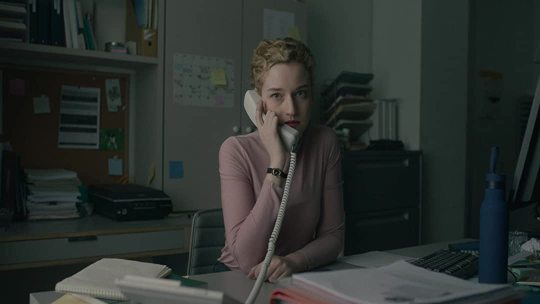
One of the first #MeToo-era films, The Assistant offers the day in the life of a low-level female staffer of a production company who is haunted by the presence of her Harvey Weinstein-like boss (who never actually appears in the film). However, rather than depicting the dramatics of sexual misconduct, The Assistant uses the common subtleties and nuances of the workplace yet maintains the same tension and heartbreak. Anchored by the remarkable, devastating performance by up-and-comer Julia Garner (Ozark), The Assistant is as important as it is well-done.
2. Sound of Metal
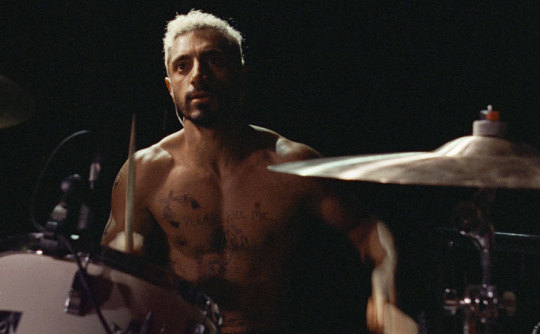
Riz Ahmed gives the performance of his career as a heavy metal drummer and former addict whose sudden battle with going deaf upends his life. Sound of Metal is an incredible experience that gives a rare glimpse in the American deaf community which is enhanced by the remarkable sound design that helps the audience actually hear what the musician is going through. It’s truly one of the most rewarding films of the year.
1. The Climb
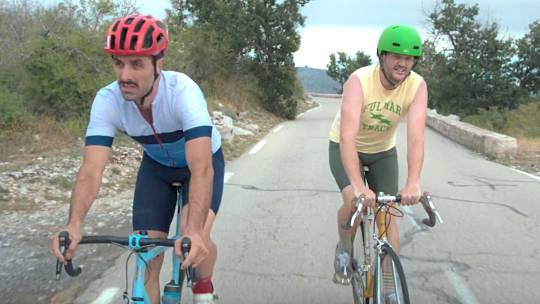
The Climb takes the generic “man sleeps with his best friend’s fiancé” storyline and turns it on its head. In his feature debut as writer and director, Michael Angelo Covino leads as the not-so-apologetic adulterer Mike and Kyle Marvin, who co-wrote the film, is the good-hearted Kyle who struggles to whether or not to forgive his best friend’s ultimately betrayal. Not only is The Climb is quirky and hilariously written, it’s a remarkably well-made comedy with some of the year’s best cinematography. Between a strong cast, a superb screenplay, and the extremely-high production value, The Climb is at the top of the mountain of 2020′s best films.
#The Climb#2020#Soul#riz ahmed#kajillionaire#Da 5 Bloods#Spike Lee#Pixar#I’m Thinking of Ending Things#jessie buckley#The Kid Detective#Adam Brody#Emma#The Queen's Gambit#Unhinged#Elisabeth Moss#Palm Springs#Netflix#ma rainey's black bottom#Chadwick Boseman#viola davis#Uncle Frank#Yellow Rose#Eddie Redmayne#joseph gordon-levitt#Hillbilly Elegy#Amy Adams#Glenn Close#Matthew McConaughey#Jamie Foxx
432 notes
·
View notes
Text
I was listening to Spotify’s Emo Forever playlist, partly to celebrate MCR’s impending return and partly out of pure nostalgia. There’s a lot of good music on there, and the emo era produced a lot of great bands and singles. But something struck me about the content: a good many of the songs included were love songs.
This really isn’t surprising, honestly—probably at least 75 percent of all music produced is about romantic love. I’m not sure how religious songs and hymns would affect that statistic I just pulled out of thin air, so we’ll stick with non-religious music for now. Suffice it to say, romantic love is a popular song topic. It’s been popular in every era and genre—cue up any All Out [Insert Decade Here] playlist on Spotify and love songs will dominate—and emo music is no exception. From early hits about lost love (All-American Rejects’ “Swing Swing”) to peak emo ballads about enforced separation (Paramore’s “crushcrushcrush” or We The Kings’ “Check Yes Juliet”) it’s clear romance was on the minds of many emo bands.
But not MCR’s.
They did write songs about romance, don’t get me wrong. It’s hard to argue that “I Don’t Love You” or “The Ghost of You” are about anything but. And yet they’re not really love songs. “I Don’t Love You” puts the spotlight on a troubled and unhealthy relationship (though whether there’s hope for reconciliation is up for interpretation) while “The Ghost of You” takes us deep into the heartbreak of someone who has lost their partner. Even their more straightforwardly romantic songs contain cracks in that sweet and shiny veneer; “I’ve got a bulletproof heart, you’ve got a hollow-point smile” hints at defensiveness that’s come up against the one person able to crack it in a world demanding you live for the moment because you might not get too many more of them.
But those songs are just blips on the radar. MCR’s real interest lay in other aspects of the human experience—the darker aspects, yes, but often not related to romance. The Black Parade gives us “I Don’t Love You,” but it’s presented alongside songs about self-loathing (“Dead!”, “House of Wolves”) self-destruction and destructive relationships (“The Sharpest Lives”) war (“Mama”) PTSD (“Sleep”) death (“Cancer”) fear that the next generation will self-destruct (“Teenagers”) nihilistic despair (“Disenchanted”) and—finally—acknowledgment that with all its pain and horror and heartache, life is worth continuing (“Famous Last Words”). Even on Three Cheers for Sweet Revenge, where two lovers are shot to death and one returns for vengeance, romance takes a backseat to the all-consuming fury of the main character.
And honestly, I think that’s part of why My Chemical Romance is rightly considered a musical legend.
That isn’t to say I don’t like romance in my fiction, or that I think all stories would work better without it. I love romance, when it’s done well. Big Eden is, at its core, a queer romantic dramedy, and it’s one of my favorite movies. The romances between Klaus and Dave and Hazel and Agnes were high points of the first season of The Umbrella Academy for me. I’m not opposed to romance, and I’m not opposed to a focus on it.
But there’s so much more to life than just romance, and there’s so much more to MCR’s music than romantic songs, tragic or no. Hell, one of their most tragic love songs, “The Light Behind Your Eyes” is about a love that’s completely platonic (“So long to all my friends/Every one of them met tragic ends”). MCR didn’t just write songs about love, or lost love, or unrequited love. They wrote songs about life. They wrote about the darkest aspects of life, the darkest moments of being, and they turned those moments into something magnificent and stark and life-affirming.
The emo era gave us a lot of great songs, and a lot of fantastic bands. But many of them were just that—bands. My Chemical Romance was a phenomenon.
There’s a reason for that.
#my chemical romance#mcr#gerard way#music#emo music#the black parade#three cheers for sweet revenge#danger days#conventional weapons#the umbrella academy#umbrella academy#tua#klaus hargreeves#dave katz#klaus/dave#hazel#agnes rofa#hazel/agnes#romance#love songs#songs that aren't love songs#meta#ramble#music meta#music ramble
8K notes
·
View notes
Text
APRIL PICKS!

And we’re back with new picks for the month!! Man, this has been some strange times we’re living in. I saw a post that said March felt like 300 days, while April feels like 3. I could not agree more. I’ve watched a lot this month, which isn’t a shocker due to our current circumstances. There’s a pretty big range, so there might be something here that you can check out during quarantine.
Here come the spoilers!
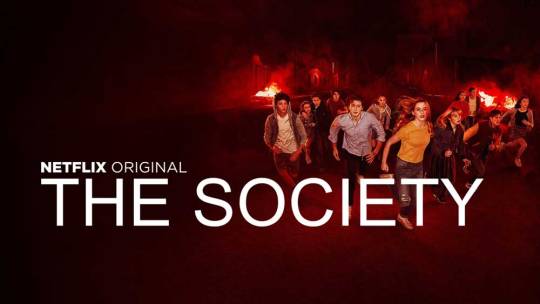
THE SOCIETY
I’m going to start with my latest watch from Netflix, The Society. Wow. I really enjoyed this one. Going into it I knew it would be like a Twilight Zone meets Lord of the Flies show, but there was so much unexpected stuff that occurred. Much like Degrassi the Next Generation, they went there. The students from New Ham, Connecticut go off on a field trip, but the buses don’t get too far due to the storm. This forces them back into town only (maybe) a couple hours from when they left. No one is home when they get back. No adults, kids, or others who were not on the school trip. The town is theirs and there is no way out. At first it’s all partying, but things take a dark turn fast and the teens must come up with laws for there to be some sort of order in this new world if they want to survive and find a way back to their real home. The 10 episodes go by really fast. It leaves a nice cliffhanger for season 2 (which is supposed to be in the works, but I don’t know if Corona affected that at all). This show definitely contains a lot of surprising twists including one very early on that is hard to predict. If you have watched this show previously or are interested in giving it a shot know one important thing.
This is the BEST character on the show.
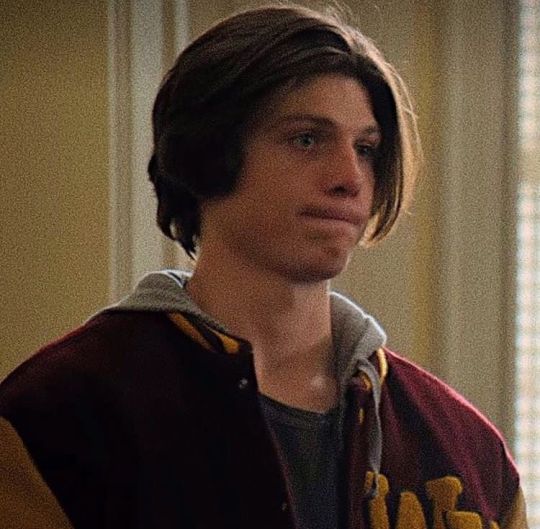
I have not met one person who doesn’t love Grizz. He is the greatest. (The fan love for him really reminds me of the love for Stiles in Teen Wolf.)
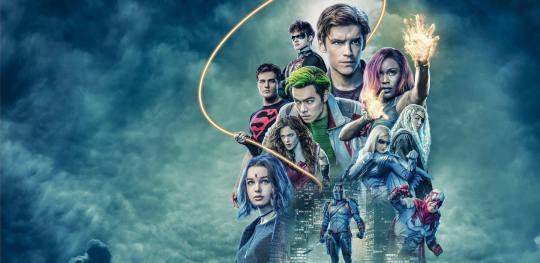
DC’S TITANS- Season 2
At the start of April, I started the second season of Titans. As someone who does not have the DC streaming service I have to wait till the seasons are accessible on DVD. I watched the first season back in December and loved it, so I couldn’t wait to watch season 2. I was excited to see all the characters they were adding to the team. As someone who LOVES superheroes, but gets most of their knowledge through watching TV and movies rather than the comics, I went in not knowing a lot, which made it even more exciting. I would say my only main issue with this season was the staggering of plots. Because there were so many characters to follow and so much going on there were a lot of times when I was excited to start the next episode (because the previous one always ended on the BEST cliffhangers) only to have the episode involve a completely different story-line. While Deathstroke was the main villain for the season, sprinkling in CADMUS and finishing off Raven’s dad at the start felt like a lot for me. Most of the side conflicts added up to involving Slade, but looking back (because I did watch this at the beginning of April) it often felt like a lot in the moment. Some of the moments that were my favorite were finally getting the Nightwing reveal, seeing Bruce and Dick interact, being at Titans tower, hearing Hank sing and all of Connor. I think he was my favorite addition to the show. (I could be biased because I’m a Superman fan.) I’m upset with the ending and they better find a way to reverse it!! I would also like to see more of the team together next season because I really missed that too.
On a lighter note....

NAILED IT!
This is the PERFECT show for the crazy times we are in. It takes your mind off the repetitive news and is a great stress reliever, plus it is super funny and you will find yourself laughing uncontrollable. Maybe more in some episodes than others. Nailed it is the baking game show for people who strive to be better bakers in the kitchen, but are struggling when it comes to appearance (or taste...or both). In the half hour show there are two tasks for the three contestants to perform in order for a chance at the Nailed It trophy and $10,000. They are both often very difficult, with the second creation much harder than the first. Watching the contestants is hilarious as well as their reactions to baking and not having any clue what to do sometimes. I also love the judges. Nicole Byer is too funny and Jacques Torres is one of my new favorite people.
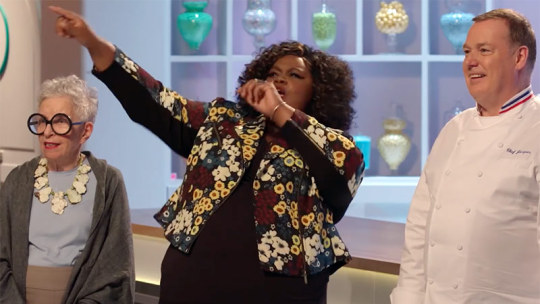
Plus Wes is just beautiful and I loved when Nicole called him the human form of Simba from the Lion King.

Continuing on with more comedy...
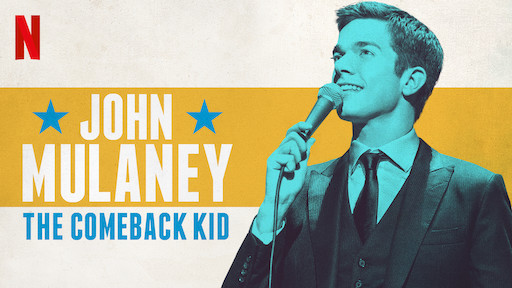
I know of several people who quote John Mulaney’s comedy specials on the regular, plus his gifs are EVERYWHERE. So it was about time I watched his specials and what better time than right now when I can use all the laughs I can get. I watched The Come Back Kid and New in Town and was laughing all the way through. If you’re already familiar with his stand-up you can enjoy some of these moments again below. If you aren’t then I HIGHLY suggest you check them out on Netflix or by simply YouTube-ing some of his best moments. (My computer cannot stop putting them in my suggested now.)


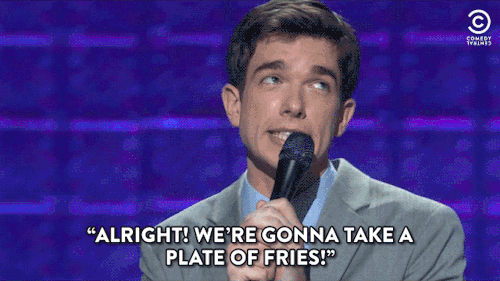

Returning to some of my past favorites this month....
(Some of these should not come as a shocker)

ZOEY’S EXTRAORDINARY PLAYLIST
One of my February Picks is back (not that it ever really left). Zoey’s is the show that I can’t stop talking about and even if this past Sunday’s episode (not the one airing tonight because I obviously haven’t watched it yet-while he’s been bothering me I can’t wait to hear Max’s rendition of ‘Bye, Bye, Bye’) gave me issues because everyone was blowing up at each other and there were times I wanted to shout at the TV, I would still suggest this show to anyone. This dramedy has so much going on from captivating (and sometimes heartbreaking) plots, to realistic and lovable characters and songs you will quickly want to add to your personal playlist. It’s honestly just a feel good show that usually puts me in such a great mood (again, despite last week’s...) With only a few more to this season I cannot wait to see what happens next!! (If you enjoy the show check out my other posts on this page!)

NANCY DREW
The CW retelling of Nancy Drew is in the top 2 of shows that I currently cannot stop talking about. It’s still a little shocking to me that I have grown to like Nancy Drew SO MUCH. If you told me that at the start of the season I would have been like ‘really?’ But as this first season has progressed I really fell in love with the show and the characters. While we ended on an earlier cliffhanger than was intended it was still an AWESOME one that has left me with so many questions. I am so happy this show was renewed and I cannot wait till they can start filming the second season. Because I need more of these kinds of moments:
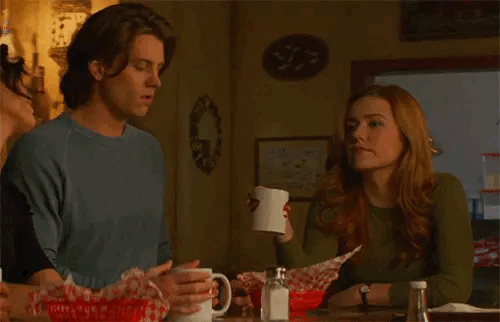
I’m pretty sure I ended my last post this way too. But come on these two are the cutest and deserve to be endgame!
Just like with Zoey’s check out this page for more detailed reviews if you are also a Nancy Drew fan!
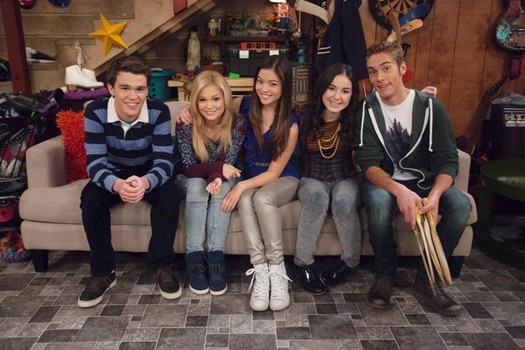
I DIDN’T DO IT
I am SO HAPPY that this show is now on Disney Plus. I have talked about this show since it got canceled from Disney Channel far too soon (much like many of their great shows on that channel). But at least they had gotten 2 seasons and both are now available to watch on the streaming service as much as you’d like. (I think I already made it up to episode 12). In my personal opinion season 2 is stronger than season 1 mainly because it doesn’t follow the classic structure of the “I didn’t do it” episode. What I mean by this is starting the episode out with some sort of hi-jinks and having the 5 best friends exclaim they “didn’t do it” or this isn’t how they thought things would go. Then we flashback to events either earlier in the day or week, etc, leading up to the first scene’s events. This style can get very repetitious, but with funny plots and likable characters certain episodes work better than others. However, by season 2 this structure was gone completely and I think the show strongly benefited from it. I truly believe this group of friends felt like a teenage “Friends” sitcom. They had a hang out at a smoothie cafe, two of them were siblings (here twins) and each member of the group resembled a character from the classic NBC show. They even had the two that felt like Ross and Rachel like each other romantically. Who knows where the show would have gone if it wasn’t cancelled. Check it out and let me know if you find more comparisons.
And Last But Not Least...
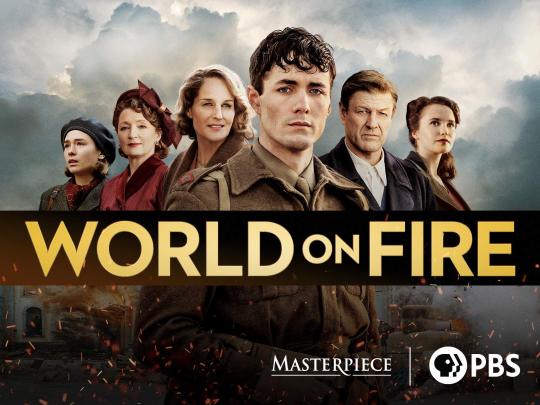
WORLD ON FIRE
The most recent show I’ve started watching is currently airing on PBS after previously airing on the BBC. This drama throws us into the beginnings of WWII as we follow several characters from different parts of the globe, from England to Germany and Poland. I’m really loving the diverse cast and seeing through the eyes of so many characters during this turning point of history. While I have only watched 2 episodes so far, I already feel very invested in each of their lives and cannot wait to see what happens next. Already so many twists and turns have occurred in such a short amount of time. The episodes go by really fast and will have you thinking a lot after. If you are a fan of a lot of other Masterpiece’s Classics I would highly suggest checking it out.
I hope everyone is staying safe and well!
#april picks#tv shows#quarantine#the society#netflix the society#grizz#grizz x sam#jack mulhern#dc titans#dc titans season 2#connor kent#nailed it#nailed it netflix#nicole byer#jacques torres#john mulaney#zoey's extraordinary playlist#Nancy Drew#cw nancy drew#nancy x ace#disney plus#i didn't do it#olivia holt#world on fire
70 notes
·
View notes
Text
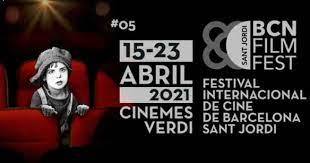
THE St. Jordi BCN Film Festival ’21 FILM REVIEWS, VOL. II: What’s Fine…and not!
by Lucas Avram Cavazos
YOUR #VOSE take on upcoming international cinema premiering in Catalonia & Spain soon!
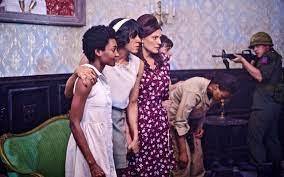
Hotel Coppelia by Jose Maria Cabral ###-1/2
As I screened Hotel Coppelia at this year’s festival, I was rather taken aback by how little I knew about the history behind the Dominican Republic and the US involvement/engagement/disruption of the island country. It is 1965 as the film commences and the ladies of the bordello and hotel, Coppelia, attend to their clientele with razor sharp precision and beguiling ways that aim to keep a roaring crowd coming back to fill the coffers, run by the icy and fierce bish, Judith (Lumi Lizardo). While the film mostly follows young server/performer Gloria, played with mild perfection by actress Nashla Bogaert, it’s the intermingling of the ladies at the brothel that aids in building an emotional response to the characters rather quickly. And when the US army invades the coastal town and ensconce themselves within the confines of the hotel to “fight the communists,” we see yet another heinous example of why so many despise the guise with which the US army lies with it appearance of helping by taking with force. This, incidentally, is exactly how every modern power on Earth has taken their stance to get to whatever they perceive they are. Hotel Coppelia, and a new student I’m teaching, has made my new history study a waltz around this incredible island, rumoured to be where Columbus actually landed as his furthest Northern reach. Lovely and necessary film…
Where to watch: TBA
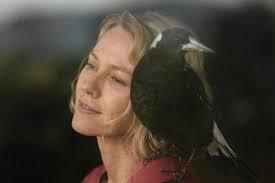
Penguin Bloom by Glendyn Ivin ###-1/2
Not knowing what to expect with an Aussie film with the word ‘penguin’ in it, I was mostly moved to screen it because who doesn’t dig Naomi Watts? But what a lovely if heartbreaking tale of truth turned celluloid treasure with this unexpected, wee gem of a film. Oscar-nominated actress Watts plays Sam Bloom, a mum vacationing with her family in Thailand when a terrible accident leaves her paralysed from the waist down. Feeling like a burden to her husband (Andrew Lincoln) and her kids, when one of them rescues a little magpie chick and the parents decide the kiddos can keep it, what ends up happening is a bond between the depressed, defeated mother and the little bird with a broken limb. You can probably imagine what happens but the easy nature of this true tale leaves you feeling grateful, happy with perhaps a few tears of joy rolling down your lovely cheeks.
Where to watch: will be in local cinemas 10/9/21
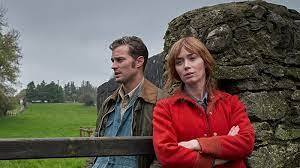
Wild Mountain Thyme by John Patrick Shanley ##
I really can’t begin to explain how much I couldn’t believe I was watching Emily Blunt cop to an attempt at an Irish accent in this blasé, Nicholas Sparks-style romance. Starring Blunt and Christian Grey-typecast character actor Jamie Dornan, this film tells the story of the selling-off of an Irish family’s farm to a wealthy US-American nephew (read: the asshole and he is Jon Hamm...yum yum) instead of the family’s son (Dornan). What I also found most odd was watching Christopher Walken try and feign being an Irish patriarch. Could we not cull together Colm Meaney or Brendan Gleeson or ANY wonderful Irish actor above 65 to play this role? At one point around the middle juncture of the film, I actually found myself counting cliches of too many modern romance dramedies, and I eventually became perplexed as to how this was greenlit in the first place for production and why Blunt and Dornan would have signed up for this trite shite…absolutely no idea.
Where to watch: in local cinemas 23/07/21
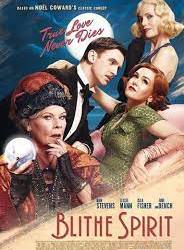
Blithe Spirit by Edward Hall ##
Part of the comedy lineup at this year’s BCN Film Festival, Blithe Spirit is based upon the like-titled 1941 comical play by Noel Coward. Screening the film on a smaller room at Cines Verdi BCN, I really did find it strange that top actors’ actors like Judi Dench and Isla Fisher would sign up for what turned out to be a sad sap of a film. Telling the story of Charles (Dan Stevens) who’s a wealthy writer embroiled in a bad case of writer’s block who takes his wife (Fisher) to see a medium (Dench), whose performance goes madly awry and so Charles decides to commission the older medium to perform a session in his home, but this seems to summon Charles ex-wife (played beyond annoyingly so by Leslie Mann). Jokes that fail, overacting and weak scripting made this particular comedy a dud on arrival.
Where to watch: in local cinemas on 22/10/21
Last Call by Steven Bernstein ##
This film marks a moment when an accomplished cinematographer finally brings a long-desired project to fruition and onto screens. Director Bernstein has been working behind the scenes for over 35 years on innumerable movies, but he actually released an unfinished draft of this film entitled Dominion and also starring Rhys Ifans and John Malkovich back in 2016. With Last Call, a full-length feature film starring the aforementioned actors come together to tell the story of the final hours of Welsh poet Dylan Thomas’ final day. It’s a grim day where he downs eighteen shots, chats up a myriad of people, who may or may not be there, and that is until the seizure that eventually brought about his death. What Bernstein serves up however is a choppy story with certain scenes that throw continuity to the wind, but you can tell the director is a true fan of the poet and desired to create a testament to the man for whose name ‘Bob Dylan’ was transformed from Robert Zimmerman. Alas, no wannabe deep conversations or great actors can save this MEH! piece…sorry!
Where to watch: TBA
#ABitterLifeThroughCinema#BCNFilmFestival2021#CinesVerdiBarcelona#HotelCoppelia#JoseMariaCabral#LumiLazardo#NashlaBogaert#PenguinBloom#NaomiWatts#GlendynIvin#WildMountainThyme#EmilyBlunt#JamieDornansexsymbol#BlitheSpirit#JudiDench#EdwardHall#LastCallFilm#StevenBernstein#JohnMalkovich#RhysIfans#DylanThomas#HistoryCinema#LITcinema#Indiefilm#UniversalLanguage#SupportLocalFilmFests#SupportIndieCinema#SupportLocalMovieTheatres#THEARTS
2 notes
·
View notes
Text
Jill Fields, "Where my dreidel at?": Representing Jewish Identity in Orange Is the New Black, 13 J Jewish Identities 1 (2020)
The Netflix original series Orange Is the New Black ranks among the most watched shows available for streaming online or on cable. In June 2016, the first episode of Season 4 drew 6.7 million views in 72 hours, making it second in viewership only to HBO's popular Game of Thrones.1 It also garnered critical acclaim, receiving a Peabody Award in addition to many Golden Globe, Emmy, and Screen Actors Guild nominations and awards.2 The series is based on a memoir by Piper Kerman, who served thirteen months in a minimum security women's prison in Danbury, Connecticut after her conviction on a drug-related offense she had committed ten years earlier. Created by Jenji Kohan, the series is a "dramedy" that mixes comedic touches with poignant stories based upon Piper's prison experiences and those of others she lived with and worked alongside while incarcerated. When the series debuted in 2013, it was lauded for its diverse female cast—in terms of racial, ethnic, and sexual identities—and for its sympathetic depiction of the plight of the primarily poor women who serve time behind bars.3 Orange Is the New Black (OITNB) clearly broke new ground in representing women who are rarely seen in mainstream cultural texts, especially in prominent roles. Kohan revealed in an NPR interview that she used the character of the blonde Piper—whose last name was changed to Chapman in the show and who labels herself a WASP in both her memoir and on screen—as a "Trojan Horse" in order to sell the series to Netflix executives, who green-lighted a project that began with Chapman as the lead, but quickly evolved in an inclusive direction by elevating women of color to co-starring status.4
Academic assessment of OITNB has celebrated aspects of the series, but also critiqued ways in which the show upholds stereotypes about women of color, lesbians, transwomen, and older women, and how it draws upon women's prison film conventions that objectify incarcerated female bodies, albeit at times self-knowingly.5 Less noted thus far by scholars is the prominent attention the show gives to its Jewish characters and themes.6 Though the series deserves praise for shining light on diverse female experiences, its treatment of Jews draws upon long-standing tropes. The show deploys, for example, the classic construction of the interfaith relationship, seen for over a century in American culture; the enduring American television tradition of covert rather than openly Jewish identity; and reliance on the conversion narrative in portraying Jewish beliefs and rituals. These mechanisms highlight, yet also displace, the depiction of Jewishness on the series and the contributions of its Jewish creator, writers, directors, and actors.
Studies of Jewish representation in American popular culture have addressed both the presence and absence of Jewish characters and narratives. Documentation of the Jewish presence in film and television has produced assessments and generated debates about whether particular portrayals draw upon or challenge antisemitic tropes, provide realistic depictions of the Jewish-American experience, or sidestep considerations of what it means to be Jewish.7 Over time, and in tandem with emerging trends in feminist analysis and cultural studies, investigations of the representation of Jews in film and television began to also consider how particular narratives construct Jewish identity, especially in regard to gender, and explore contradictions embedded in mass cultural texts that reference Jewish experiences. Though ire, fear, outrage, and appreciation continue to motivate some research and give it urgency, analysis questioning assumptions about claims to authenticity, acknowledging diversity within Jewish communities, and drawing parallels in addition to contrasts with how a range of minorities are represented both in front of and behind the camera has provided new insights and opened up new ways of thinking about larger frameworks as well as specific texts. Nonetheless, asking whether products of the culture industry such as OITNB are "good for the Jews" remains relevant even when also taking into account a range of Jewish experiences and practices, the potential instability of identity formations, and possibilities for conflicting interpretations.
Important Jewish characters in OITNB include Piper Chapman's fiancé Larry Bloom, inmate Nicky Nichols—who I assert is a crypto-Jew through Season 5—and African-American inmate Cindy Hayes, who converts to Judaism in Season 3. It is significant as well that a number of actors, writers, and directors employed by the show in addition to series creator and producer Kohan are also Jewish. In what follows, I explore relevant aspects of the source material—Kerman's memoir—with a primary focus on how the fictional characters and their stories create Jewish moments in series episodes. I also suggest ways in which the representation of Jews connects with the show's Jewish cast and crew. Moreover, the contrast between the show's groundbreaking status and its employment of practices that date back to earlier periods in the history of television reveal the persistence of problematics for including fully realized Jews and their narratives on the small screen.
Larry Bloom, Masculinity, and Jewish Betrayal
Piper's Jewish fiancé Larry Bloom appears in the first episode of Season 1 and remains in the series through Season 2.8 The real Piper's real-life Jewish fiancé (now husband), who is a successful writer with the far less iconic Jewish last name of Smith, is in Kerman's memoir supportive and loving throughout Piper's prison ordeal, as are his equally wonderful parents. Larry Bloom of the series, an aspiring writer who struggles to get a paying gig, is initially kind and defends Piper to his awful Portnoyesque parents, who try to get him to dump his shiksa girlfriend. Larry has internalized his father's view of the blonde gentile woman as exotic and uses the term himself when proposing to Piper after she is sentenced. "Why would I want a felonious former Lesbian WASP shiksa who is about to go to prison to marry me? Why? Because this underachieving, underemployed Jewboy loves her."9 Larry Smith describes meeting Piper in similar terms: "Piper was pretty by anyone's standards, but blonde, blue-eyed, Waspy girls are catnip for hairy Jewish guys like myself." He further describes "classic Piper: steely and self-contained. I grew up with a different window into the world of women, one where they are a little neurotic and a lot needy."10 This well-worn construction of Jewish women has appeared in a range of media and texts, including interfaith marriage narratives depicted in such films as The Heartbreak Kid (1972) and Along Came Polly (2004), and in the 2015 comment by then-presidential candidate Donald Trump calling Congresswoman Debbie Wasserman Schultz "crazy" and "highly neurotic."11 In OITNB, Larry further demonstrates his assimilationist impulse by preparing roasted pig for the couple's last meal together before Piper's self-surrender at Litchfield prison; their first snack in the prison visiting room is pork rinds.12
Larry is played by actor Jason Biggs, who has portrayed Jewish men in films such as American Pie (1999), though not Jewish himself.13 Soon after OITNB debuted, articles such as "Does Orange Is the New Black Have a Jewish Problem?" expressed concern about yet another iteration of Jewish masculinity as having "that tortured, brooding, nebbish quality we've come to associate with Woody Allen."14 Moreover, as other characters are humanized via flashbacks that reveal their difficult personal histories and draw viewers' sympathies, Larry's weaknesses become more apparent as the narrative unfolds and he draws viewers' disgust. A 2014 article, "A Guide to The Internet's Love of Hating Larry Bloom From 'Orange Is the New Black,'" concluded Larry was so detested he was the object of "world-class hatred."15
Larry's multiple betrayals of Piper propel his development into—or revelation as—a despised, nebbishy Judas. His first step down that path is watching episodes of Mad Men alone, after promising Piper he would wait to watch them with her after her release. To do so guilt-free, he turns over a framed photo of the two of them on his coffee table. As one critic called it, "Only a truly terrible human being would go against his loving girlfriend's wishes and watch their show without her. But turning the frame over? That's just cold-blooded."16 Larry's initial betrayal leads to more. When his only chance to get paid for writing an article requires detailing the prison experiences that Piper has shared with him in phone calls and visits, he goes ahead without her permission.17 She finds out about his New York Times "Modern Love" column from her prison counselor and, after viewers see Larry excitedly buying up copies of the newspaper, we find out that he has revealed information that endangers the tenuous relationships Piper has been building and needs to survive prison.18 In a subsequent episode, despite Piper's distress, Larry cozies up to an NPR reporter he meets at a Thanksgiving dinner, which results in a radio appearance sharing similar stories. Again, Piper only finds out about this after the fact, and listens in horror as Larry further humiliates both her and inmates she knows.19
The real Larry did write a "Modern Love" column about his relationship with an inmate, though it was published well after Piper's sentence ended, and a month before the 2010 publication of her memoir. Likely timed to promote Kerman's book prior to its release, the column most importantly does not betray her or her prison friends. Instead, Larry focuses on his devotion to Piper throughout her incarceration and the men he met who were also visiting their wives or girlfriends. The column ends with claims that his consistent visits and phone calls were not testaments to his character but instead prove how wonderful his fiancée is.20 In contrast, Netflix Larry's multiple betrayals reach their ultimate conclusion when he sleeps with Polly (Maria Dizzia), Piper's married best friend and business partner, and then dumps Piper for her. Larry and Polly even move in together and are shown enjoying their comfortable New York City lives as Larry and Piper used to do.21
Expressing dismay about how the show transformed Larry's character by drawing upon familiar tropes that denigrate Jewish men and Jews generally, and identifying differences between the two portrayals of Larry, is a fair, but ultimately narrow criticism. After all, adapting books into movies or television shows, whether fiction or non-fiction, requires alterations. The real Larry, for example, explains that translating Netflix Larry into what he calls a "schmuck" made the show more interesting.22 Another way to frame that transformation is to ask what purpose the nebbishy Judas/Jewdas performs in the OITNB narrative. I would argue that Larry's betrayal not only relieves the show from an unexciting story of a reliable boyfriend, but also displaces questions about possibly exploitative aspects of Kerman's best-seller and hit series onto the despicable and feminized Jewish man. This narrative turn burnishes the author's—and series creator Kohan's—celebratory claims to tell rather than sell the stories of incarcerated women who will not profit from their commercial dissemination.23
Kohan's OITNB cookbook, which features "Larry's Orange and Black Peppercorn Pulled Pork," is suggestive of her commercial goals and conflicted take on just how seriously the show and the discourse it has generated consider prison conditions.24 In addition, Kerman's former girlfriend, Cleary Wolters, who facilitated Kerman's criminal involvement in the drug trade, states in her memoir that she was never contacted by anyone connected with the book or the series prior to their release. In OITNB, her fictionalized character Alex Vause ends up in the same prison with Piper and their relationship is a central story line. When the Netflix series debuted, Wolters was out of prison and working and, though her employers knew the broad outlines of her criminal past, she had not shared details nor come out as gay at work when outed by the series. Wolters feared for her job security, aware of her tenuous status as an ex-felon. Within one day of the series release, the identity of the "real Alex Vause" was posted online, which caused her anxiety that former inmates might track her down. Ultimately, however, Wolters felt grateful that the success of OITNB allowed her to also share in print the sobering lessons of her criminal past and prison experiences.25 Nonetheless, the risks provoked by Wolters's inclusion in the memoir and series raise the question of exploitation, a charge against the show conceptualized as "trauma porn." Ashleigh Shackleford popularized the term in her assessment, shared by a number of African-American critics, that the show depicted "bleak narratives about the experience of people of color for the entertainment of those who have never lived those experiences."26 Such critiques provide further evidence for reading Larry's many betrayals as a displacement or hedge against similar charges directed toward Kerman or the series creators. As a long-standing trope, Jewish betrayal is easily identifiable and works to distract or absolve others of incriminating behavior.
The Jewish Inmate Problem: Levy
The treatment of a woman who, like Wolters, appears in the memoir but who has drawn less attention because she did not become an easily identifiable character in the show, provides an additional avenue for exploring Jewish identity in OITNB. Kerman's descriptions of Levy, a Jewish inmate, suggests the translation of Larry into a Judas can be indeed identified as a "Jewish problem," and one that originated in the memoir rather than the series. Consideration of the memoir is uncommon in studies of the series; Hilary Malatino's analysis is an important exception that provides a point of comparison below.27 A French Moroccan Jew, Levy is the only inmate whose behavior and demeanor Kerman derides repeatedly in her memoir. Levy is a true "other" in prison. As Kerman explains early on:
When a new person arrived their tribe—white, black, Latino, or the few and far between "others"—would … get them settled and steer them through their arrival. If you fall into that "other" category—Native American, Asian, Middle Eastern—then you got a patchwork welcome committee of … women from the dominant tribes.28
Levy thus falls outside or in between even the "other" category, but her status as a Member of the Tribe without a tribe and the impact her singularity might have had on her ability to in fact "get settled" is not considered by the otherwise compassionate Kerman. Described in the memoir as "tiny," Kerman scorns Levy for being "totally useless at electrical studies" despite "preening about her Sorbonne education."29 She is also criticized for her decision not to allow her children to come visit her because she does not "want them to see her in prison," despite Kerman noting without judgement others who "did not want their people to see them in a place like this."30 Kerman even positions Levy below guards in likeability: "'Zey have no class,'" sneered Levy. I didn't like prison guards, but she was insufferable."31 This excerpt is also an example of how Levy is singled out by Kerman, who reproduces her accent in the text to a greater degree than any other prisoner's. Levy is also ridiculed for crying more often than Kerman deems appropriate, though Kerman writes that when seeing an inmate cry after visiting hours are over, "you smiled sympathetically or touched their shoulder."32 Together, these comments justify Levy's status as:
the unifying factor in the [electrical] shop: the rest of us united against her. She was insufferable, crying daily and complaining loudly and constantly about her measly six-month sentence, asking inappropriate personal questions, trying to boss people around, and making appalling and loud statements about other prisoners' appearance and lack of education sophistication, or "class," as she put it. … Most of the time she was nervous-verging-on-hysterical, which manifested in dramatic physical symptoms; an astonishing hive-like swelling made her look like the Elephant Man, and her always sweating hands made her particularly useless for working with electricity.33
Though we do not learn the specifics regarding the cause of Levy's incarceration, Kerman mentions Levy was "whisked away to testify against her chiseler ex-boyfriend."34 However, the worst offense committed by Levy, according to Kerman, occurs after her release when she is interviewed by the Hartford Courant in September 2004, just before Martha Stewart's incarceration. Kerman reports the "Camp freaked out" that Barbara, as Levy is referred to in the newspaper article, describes the prison as a "big hotel" with "an ice machine, ironing boards," "two libraries" and "amazing food," and that she says she enjoyed not having to cook, clean, drive or buy gas. Kerman responded to the article in her memoir by "pictur[ing] Levy, swollen with hives, looking like the Elephant Man, crying every single day over her six-month sentence and sneering at anyone she thought was not 'classy.'" Though Kerman states the "reporter got many minor facts wrong," she and other inmates who "are outraged by the false claim that [they] could buy Haagen-Dazs ice cream" at the commissary blame Levy for the error. The prisoner in charge of the kitchen, Pop in the memoir and Red in the show, is upset and confused:
Piper, I just don't understand it. Why would she lie? You have the opportunity to get the truth out there about this place, and instead she makes up these lies? We have nothing here, and she makes it sound like a picnic.35
Kerman then explains to her readers that Levy lied because she "didn't want to admit to herself, let alone to the outside world, that she had been placed in a ghetto, just as ghetto as they had once had in Poland." Kerman here assumes that she understands the Jewish ghettos of World War II-era Poland better than Levy. She continues:
It was too painful … for Levy and others (especially the middle-class prisoners) to admit that they had been classed as undesirables, compelled against their will into containment, and forced into scarcity without even the dignity of chosen austerity. So instead, she said it was Club Fed.36
Kerman uses the ghetto metaphor to help her readers understand the "revolving door between our urban and rural ghettos and the formal ghetto of our prison system" in the United States and the difficulty of escaping either.37 However, Kerman, in collapsing distinctions, overlooks differences between Nazi ghettos and those she references, and also ways in which targeted communities form alliances based in shared histories of pain and oppression. Moreover, she does not consider the possibility if not probability that Levy has family members who perished, or who suffered and survived the Holocaust in France and Morocco. In a comparable critique, though one focusing on gender identity, Malatino finds Kerman "lacks a framework for understanding trans subjectivity," and uses "classic othering strategies … [that] serve to de-authenticate transfeminine gender expressions."38 Kerman similarly lacks intersectional frameworks that could account for Levy's status as both wielding middle-class privilege and experiencing her subjectivity as an isolated and vulnerable minority.
Lacking fuller consideration of Levy's multiple facets, Kerman also did not mention that Levy in the interview lauded her fellow prisoners as "classy" and defended them against charges that sexual assault was common. For Levy, "The worst part about being there was being counted. They count you like an animal." Whether intentional or not, her emphasis on this aspect of prison life being exceptionally difficult for her evokes the experiences of Jews in Nazi camps during the Holocaust, an allusion that escapes Kerman. The Courant also sympathetically reported Levy's decision not to see her children, which Levy states was the hardest part of her stay, and an effort to maintain her dignity.39
Levy indeed may have been annoying. But that alone does not explain why Kerman devotes so much attention to her. In assessing what work she performs in the narrative, I argue Levy serves several functions. First, she is a vehicle for the middle-class Kerman to distance herself from those of her own class and to legitimate her claim that she accepts her shared status with poor undesirables, which other middle-class women prisoners like Levy do not. Second, she confirms the view of Jewish women as needy and neurotic, a dominant caricature even promulgated by Kerman's real-life Jewish husband. Levy thus also is a vehicle Kerman uses to elide her possible association with reviled Jewish femininity via her relationship with a Jewish man. Third, Levy translates into Netflix Larry as they are both Judases who in self-interest betray the experiences of incarcerated women in mass media forums. Levy-Larry are categorically unable to truly understand who those women are or identify with them, unlike the transcendent Kerman. Thus Levy-Larry is the mechanism by which Kerman and by default Kohan distance themselves from assessments that they are profiting from the ordeals of women who do not have similar professional opportunities to do so.40 Moreover, the construction of the justifiably hated if not abject Jew that results from Levy's transgressive behavior and Larry's increasingly despicable acts creates more possibilities for the diverse female inmates to be viewed sympathetically by readers and viewers.
OITNB and Television's Crypto-Jews
The portrayal of Jewish identity on the television series OITNB contains further complexities, as Jewish elements beyond the Bloom stereotypes are depicted from its earliest episodes. A mechanism for simultaneously including and excluding Jews in television is the long-standing practice of the crypto-Jewish character. Leslie Fiedler first used the term in 1964 to describe the phenomenon of characters whose Jewish identity is hidden, like the original crypto-Jews, Spanish Jews forced to convert in 1492 whose Mexican and Mexican-American descendants maintained Jewish practices for centuries typically without knowing the origins of their family traditions.41 Fiedler deployed the term critically in analyzing Willy Loman in Arthur Miller's Death of a Salesman and other characters penned by mid-twentieth-century Jewish-American writers such as Paddy Chayefsky, Bernard Malamud, and Norman Mailer. Fielder deplored the effect of "characters who are in habit, speech, and condition typically Jewish American, but who are presented as something else—general American," as "pseudo-universalizing." As a result, "the works … lose authenticity and strength" and constitute a "failure to remember that the inhabitants of Dante's Hell or Joyce's Dublin are more universal as they are more Florentine or Irish."42
Jewish Studies media critics such as Jeffrey Shandler, David Zurawik, and Vincent Brooks found the crypto-Jew concept useful in describing television characters whose Jewish identity is ambiguous, hidden, or suppressed but hinted at through narrative gestures, personal qualities, or physical features and often by being played by a Jewish actor. These critics explain that the crypto-Jew phenomenon was born of concern largely on the part of Jewish television executives that shows that appeared "too Jewish" would not appeal to most Americans and would make them vulnerable to charges of Jewish control of the media. The practice emerged in television's "Golden Era," after the popular radio and then television show The Gold-bergs ended its twenty-six-year run in 1955. The Goldbergs depicted an observant Jewish family of modest means comprised of immigrant parents and America-born children living in New York City. Matriarch Molly Goldberg (Gertrude Berg) was a beloved mass culture icon known for her down-to-earth wisdom and endearing malapropisms. Despite its broad appeal—Berg won the first Emmy awarded for Best Actress in 1950—Jewish television moguls such as William Paley, who headed CBS, made it clear that no new shows with Jewish leading characters would be aired. This attitude has been attributed to television executives' fears that Jewish programming would bring unwanted attention and therefore problems to Jews working in the medium. Occasionally, Jewish characters appeared in Jewish-themed episodes of shows from westerns like Rawhide (1959–1965) and Bonanza (1959–1973) to procedurals such as The F.B.I (1965–1974). However, the maxim "write Yiddish, cast British" became the rule through the 1970s. It was implemented most famously in network discussions about what became The Dick Van Dyke Show (1961–1966). Created by Carl Reiner, who planned to star, the sitcom was based on his life as a television comedy writer and head of a Jewish family living in the suburbs. Innovative in depicting both its main character's home and work life, CBS agreed to put the show in the prime time schedule if Reiner, et al. would step aside for a "less ethnic" cast. The one exception in the final ensemble was supporting character Buddy Sorrel, played by Morey Amsterdam, though his Jewish identity was rarely referenced.43
In the 1970s, "write Yiddish, cast British" remained a guiding principle on network television, though popular shows such as Barney Miller (1974–1982) and Welcome Back Kotter (1975–1979) featured lead characters with familiar Jewish identifiers, such as their New York City origins and speech patterns, and who were played by Jewish actors. Nonetheless, such characters remained crypto-Jews, as story lines never referenced or confirmed their Jewish identity. Rhoda (1974–1978), a spin off from The Mary Tyler Moore Show starring the non-Jewish Valerie Harper as Mary's Jewish friend Rhoda Morgenstern, was an exception, a sitcom about a Jewish woman. Even after the late 1980s and 1990s saw the return of the Jewish female lead in The Nanny (1993–1999) and Will & Grace (1998–2006), and the Jewish leading man in dramas thirtysomething (1987–1991) and Northern Exposure (1990–1995), the crypto-Jew remained an important creature of network television. Crypto-Jews of this era include George Costanza, Kramer, and Elaine on Seinfeld (1989–1998) and Rachel Green, Monica Geller, and Ross Geller on Friends (1994–2004). In an echo of the decision to recast what became The Dick Van Dyke Show, NBC executives insisted the Seinfeld characters, who were created as Jews, not remain so. Only Jerry Seinfeld remained identifiably Jewish, which was unavoidable as his character was based on the already known Jewish comedian's real persona.44
Despite this decades-long context and an emerging self-referential and fearless Jewish sensibility in twentieth-first-century cable programming personified by Jon Stewart on The Daily Show, Larry David's Curb Your Enthusiasm, and Ilana Glazer and Abbi Jacobson's Broad City, and by the Amazon series Transparent, celebrated as the "Jewiest show ever," all of which found broad audiences, Orange Is the New Black features crypto-Jews among its diverse cast.45 Jewish actors in the series in recurring roles that began in the first season include Yael Stone, Constance Shulman, Barbara Rosenblatt, and Natasha Lyonne. Constance Shulman's character Yoga Jones's potential identity as a crypto-Jew is tipped off in a visual cue. As the inmates prepare for the December holidays by decorating the prison, Jones tapes a two-dimensional dreidel decoration to the wall upside down. Whether this indicates ignorance or a sign of Jewish distress (or Jews in distress), like the meaning of flying the American flag upside down, it is significant that this moment precedes, and perhaps precipitates, the scene where Jones's back story is revealed in flashback. Though nothing in the character's background particularly suggests she is Jewish, that she becomes a Buddhist after her conviction for mistakenly shooting and killing a neighbor's child when protecting her remote marijuana crop might be, as so many American Buddhists are Jewish, they are known as "JuBus." Jones's story also evokes the television character Dharma Finkelstein of Dharma & Greg (1997–2002) whose father is a Jewish hippie and befuddled pothead.46
Drug offender Nicky Nichols is the most prominent and clearly identifiable crypto-Jew on OITNB throughout its first five seasons. Yet a case can be made as well for Yael Stone's Lorna Morello. Stone, for example, was originally considered for the part of Nicky Nichols, but instead was cast as the working-class Italian-American Lorna Morello. This cultural slippage between Italian Americans and Jewish Americans has been long noted. In 1964, for example, Leslie Fiedler cited Paddy Chayefsky's Italian American Marty as a Jewish American being "presented as something else."47 More recently, Dominique Ruggieri and Elizabeth Leebron in their research on Jewish- and Italian-American women on television conclude that ever since Mama Rosa debuted in 1950, shortly after the transition of The Goldbergs from radio to television, both Jewish- and Italian-American women have been portrayed as:
selfish, pushy, materialistic, domineering, manipulative, assertive, loud, shallow, whiny, demanding, man-hunting, weight-conscious, high-maintenance, shopping-crazed bargain hunters, possessive, controlling, unmarried, success-oriented, food-oriented, asexual, and unattractive. Physical qualities that epitomize these characters include large noses, big hair, a dark complexion and issues with their bodies. The positive characteristics linked to these ethnic portrayals include strong family orientation, loyalty, and devotion as mothers.48
In addition, several prominent Italian-American television characters, such as Dorothy Petrollo-Zbornak on The Golden Girls (1985–1992) and Marie Barone on Everybody Loves Raymond (1996–2005) were played by Jewish actors, Bea Arthur and Doris Roberts respectively. Some Jewish media journalists have gone a step further and declared the entire Barone family Jewish because the show's Jewish creator, Phil Rosenthal, infused the series with storylines based on his own family.49 Similarly, crypto-Jew Costanza from Seinfeld, who is ostensibly Italian American, is played by a Jewish actor, as are his parents. It works both ways; Italian-American actor John Turturro has played Jews in multiple films.50 Moreover, on OITNB, the connection between Nicky and Lorna is part of the narrative. In the first episode of Season 1, we are introduced to both characters along with Piper, who discovers them having sex in the shower. The amorous relationship between Nichols, who is a lesbian, and Morello, who identifies as heterosexual, continues through the fifth episode, when Morello breaks it off to save herself for her fiancé. Nonetheless, their relationship maintains an emotional and at times physical intimacy. Furthermore, Lorna later reveals her fiancé is Jewish, and decides, "If I marry him, I'll be Jewish too."51
On her own, drug offender Nicky Nichols personifies the typical television crypto-Jew. Natasha Lyonne neé Bronstein's thick, wavy long hair and New York accent are key physical markers. Nicky, an articulate, insightful, and wisecracking lesbian, was raised in Manhattan by her professional, well-to-do, divorced mother. Nicky complains about and blames her mother's absence in her life for some of the psychic distress that undergirds her addiction. Flashbacks depict their difficult relationship; however, as her back story progresses, we see Nicky is an incorrigible addict who uses her smarts and sarcasm to manipulate her mother, who eventually throws up her hands. Nicky's mother's characterization is not stable in the show and there is no evidence to suggest she is a crypto-Jew herself. For example, she is not played by a Jewish actor. Perhaps then it is Nicky's truly absent father who is Jewish. After all, her last name mirrors jokester Joey Nichols, who is Woody Allen/Alvy Singer's father's friend in Annie Hall. As Joey's cultural descendant, Nicky's comedic abilities are more fully evolved: in another marker of Jewish-American identity, she performs stand-up during the prison holiday talent show.52 Moreover, Lyonne makes her own Jewish identity clear in interviews and in the extra feature "Getting to Know the Cast" on the Season 3 DVD, where she talks about living in Israel in the 1980s, and provides the wittiest responses to many of the questions she and the other actors are asked. Nicky is also the first character to use Yiddish words in the series and the first to term a gang of white supremacist inmates as Nazis.53
In critical readings of the show, Nicky has been noted for her non-normative lesbian body, i.e., she is perceived as non-conforming to dominant standards of beauty. Such critiques either laud the show for depicting Nicky enjoying her sexuality despite not being thin and "attractive" or find fault in that the white lesbians with leading roles, Piper and her girlfriend Alex (Laura Prepon), uphold and thus perpetuate these oppressive standards.54 Furthermore Nicky's (crypto-Jewish) hair is unruly, and she does not attend fully to grooming and behavioral practices associated with femininity such as being neat, tidy, and controlled in appearance or speech. Nicky's presentation thus can be seen as conforming to the view of Jewish women as unattractive. Nonetheless, Kyra Hunting finds that:
often it is not Piper, marked by the politics of respectability who is the moral center for the group of white women but drug addict and promiscuous Nicky—whose appearance and lascivious language has rough edges but who consistently provides the most rational advice to other inmates.55
In addition, Nicky articulates incisive feminist critiques. For example, in regard to Lorna's obsession about her future marriage to her fiancé, Nicky comments on "the wedding industrial complex and society's bullshit need to infantilize grown women." Though Nicky demonstrates the benefits of her college education in such comments, she does not use her well-honed analytical skills to assert her superiority in the same manner as Piper's displays of knowledge sometimes do and for which other inmates call her out.56
Claiming Nicky as a crypto-Jew opens up further possibilities for considering her within the genealogy of "tough Jews," who defy stereotypes of Jews as weak, passive, victims or brainy yet nebbishy nerds. Scholars and commentators have deployed the term "tough Jew" to describe a range of real and representational Jewish men, from early twentieth-century Jewish-American gangsters Meyer Lansky and Bugsy Siegel and Holocaust resistance fighters the Bielski Brothers, to the muscular Zionists and Israelis who forged a Jewish state and aim to protect the Jewish people. Nathan Abrams in The New Jew in Film extends the category to include the "tough Jewess with Attitude" seen in a number of turn-of-the-century films such as Miller's Crossing (1990), Homicide (1991), and Mr. & Mrs. Smith (2005). Though Nicky engages in illegal activity, she is not a gangster in the Lansky mold, nor is she a righteous member of anti-fascist resistance. Instead, her brand of Jewish toughness is born of her defiant lesbian identity, rough street life as a junkie, and willingness to speak her mind. These attributes are essential components of her prison survival skills.57
The tough Jew is posited by Abrams as a one-half of a binary paired with the queer Jewish male. In regard to Jewish women, he explains:
the tough Jewess with Attitude not only rebels against stereo(typical) gender roles, demonstrating that she can perform the same roles and tasks as the Jew, but also questions the duality of gender in the first place, confounding both the general and Jewish binary logic.58
As Nicky is queer and tough, she confounds stereotypes about Jewish women's representation on television, and, as I discuss further below, the representation of Jewish women in OITNB. Perhaps Nicky's status as a crypto—rather than "out" Jew—is thus overdetermined because not only does she defy categorization, she is categorically defiant. However, the popular cultural presence of well-known Jews with histories of substance abuse such as Lenny Bruce, Bob Dylan, Hillel Slovak, and Amy Winehouse—and that Natasha Lyonne's own struggles as an addict inform Nicky's narrative—raises additional questions about the reluctance or apparent impossibility of presenting Nicky as Jewish.59
Like many of the inmates, Nicky is not only tough. She displays vulnerability, particularly in her relationship with her prison mother Red (Kate Mulgrew). Yet even crypto-Jew Nicky engages in a Judas betrayal by sharing with a corrupt prison guard her prison mom's secret method of getting in additional culinary supplies. He plans to use the information to smuggle in drugs. This will lead to Nicky's downfall, as she later is found with drugs in her possession and, early in Season 3, gets sent to the nearby higher security prison. The dispatching of Nicky underscores the tenuous status of the television crypto-Jew, whose identity both articulates and avoids representations of Jewishness. Crypto-Jews provide gestures of Jewish representation, however reified—such as physical features, names, personal qualities, comedic sensibilities and intellectual insights—that convey a sense of Jewishness detached from historical contexts and specific experiences. Thus, a crypto character's Jewish attributes can be assigned or withdrawn at will, evading narrative demands for continuity or follow-through. The tattoo of a cross Nicky sports on the inside of her forearm, for example, thus neither confirms nor denies her Jewish identity. Instead it speaks to the shifting construction of the crypto-Jew as both trope and pastiche.60
"Where my dreidel at?" Kosher Food and Conversion Narratives
It is telling that it is only shortly after Nicky leaves, that the first "out" Jewish inmate shows up. Or at least, the first inmate who asks for a kosher meal. It turns out she is not Jewish, but requests kosher meals to get better food. This is a real phenomenon in US prisons. According to a 2012 Forward article, just one-sixth of the 24,000 prisoners receiving kosher meals in America are Jewish.61 On OITNB, the quality of the kosher meals is quickly noticed by other inmates, particularly Cindy (Adrienne C. Moore), who is among the first to request one. By the next episode several other African-American characters whose back stories have been previously highlighted are also eating kosher. However, it is Cindy who most embraces the potential of claiming Jewish identity. When she is accused of not being Jewish, she replies, "You think you know my life? Shabbat Shalom, bitch!" And as one Jewish popular press article on the topic notes, Cindy's "quest for edible food" leads her to other Jewish references, "including 'Shanah tova and hava nagila. It is good to be chosen.'" In response to someone asking if a seat is taken, she replies, "Yeah. We're saving it for Elijah." Cindy pursues her desire to learn more about Jewish culture by checking out Fiddler on the Roof and a Woody Allen movie from the library, which is humorous yet also a self-referential gesture to the importance of popular cultural texts in disseminating information about what it means to be Jewish.62
Up to this point in the series, Cindy's character has largely served as comic relief. She is depicted as a fool and an immature petty thief who is in prison because she abused her position as a TSA officer to steal passengers' belongings at the airport.63 When a rabbi is brought into the now privatized prison to determine if prisoners requesting kosher meals are motivated by "sincerely held beliefs"—an actual legal standard employed to determine the validity of prisoners' claims to kosher meals—his interviews are relayed in a montage of inmates sharing both goofy ideas about what it means to be Jewish and some well-worn stereotypes that are played for laughs: "I think y'all are doing a wonderful job controlling the media. I mean we. We are doing a wonderful job;" and "I call my mother a lot, like every day, and, love a bargain." When asked whether she was raised Jewish, Cindy claims she was "born and bred," and recounts plot points from Annie Hall and Yentl. This strategy fails to keep her on the kosher meal list and Cindy decides to convert, ending the episode with its title question, "Where my dreidel at?"64
In the next episode we discover there actually are Jewish women inmates held at Litchfield; Cindy has sought them out to prepare for her conversion. One is Ginsberg (Jamie Denbo), who sheepishly reveals she has been convicted for money laundering when asked. This is an odd exchange not only because it is rare for a prisoner to be asked that question by another inmate, especially when they have just met, but also because Ginsberg's gesture when revealing the basis for her conviction conveys shame at having been caught both in the crime itself and in a crime that evokes the antisemitic association of Jews with money. However, that same information reassures Cindy that Ginsberg is indeed Jewish, as she was skeptical due to Gins-berg's blonde hair and blue eyes. In the commentary on the episode by its credited writer, who describes herself as an Irish Catholic, she explains that Kohan rewrote Ginsberg's monologue describing the inmate's upbringing. Ginsberg's experiences thus appear grounded in those of Kohan's herself, as when Ginsberg demonstrates she knows her Jewish chops by talking about her bat mitzvah and her Hebrew name, Shayna Malka.65
In the last episode of Season 3, Cindy, with Ginsberg and another Jewish inmate, Rhea Boyle (Yelena Shmulenson) by her side, meets with the rabbi. Rhea opens the conversation: "Why you want to go from a hated minority to a double-hated minority is beyond me," before turning to the rabbi, and vouching for Cindy by asserting, "she's for real." Cindy has chosen the Hebrew name Tovah—"which means good and it's all good now"—and explains she has traded granola bars with Ginsberg and Boyle for Hebrew lessons. The rabbi then asks, "What is this for you?" Cindy's reply, written by Kohan, is conveyed in a truly moving performance by Moore.
Honestly, I think I found my people. I was raised in a church where I was told to believe and pray. And if I was bad, I'd go to Hell. If I was good, I'd go to Heaven. And if I asked Jesus, he'd forgive me and that was that. And here y'all saying there ain't no Hell. Ain't sure about Heaven, and if you do something wrong, you got to figure it out yourself. And as far as God's concerned, it's your job to keep asking questions and to keep learning and to keep arguing. It's like a verb. You do God. … I want to learn more and I think I got to be in it to do that. … Can I be a Jew?
Cindy is ecstatic when he and both witnesses say yes, until she finds out she must also experience ritual immersion in a mikvah to make her conversion official. Ginsberg consoles her by explaining that although she is not a Jew yet, she is "Jew-ish."66
A miracle ensues for all the inmates when the guards go on strike and a construction crew accidentally rips open a hole in the fence, allowing everyone to take a dip in the lake on the other side. Most prisoners run in to enjoy their momentary freedom. Cindy finds Ginsberg, who recites the blessing as Cindy immerses her naked body in the water. Conversion complete, Gins-berg congratulates her with a "mazel tov" and Cindy is all smiles in a closeup shot depicting her deep expression of her new found source of joy. Cindy's transformation during a season in which all sorts of religious identities and meanings are explored is remarkable for her as a character and also for the way it explains the meaning of Judaism, and most importantly, the difference of Judaism, which the show affirms and upholds. Furthermore, the sensitive treatment of her conversion story creates opportunities to depict Jewish community within the prison, and allusions to Jewish community outside it. In so doing OITNB incorporates significant Jewish content that a focus on individuals, especially when occurring in fleeting moments or signaled in quips, cannot accomplish alone. I would argue the brief depiction of Jewish community on the show reveals the fissures of representing Jewishness without that larger communal context, and the potential for greater narrative depth when included.
African Americans and Jews by Choice
Cindy's conversion is credible as a personal journey that concludes the series' prison kosher food narrative, and also because it resonates with the experiences of other well- and lesser-known African-American converts—whether real or imagined—to Judaism. These "Jews by Choice" join a diverse Jewish community: a 1990 study conducted by the Council of Jewish Federations concluded that in the United States 2.4 percent of "self-identified Jews list their race as black," and "about 100,000" additional African Americans "reported having 'connections' to Judaism." In addition, African-born Jews comprise 14.6 percent of Israel's Jewish population.67 Popular entertainer and Rat Pack member Sammy Davis, Jr. was the most well-known African-American Jew for many decades following his 1960 conversion, which occurred after years of study and consultation with Reform rabbis in Los Angeles and Las Vegas. He and his Swedish fiancée, actress May Britt, "formally converted a few weeks before their wedding."68 Other well-known African-American converts include writer Julius Lester, actress Nell Carter, writer Jamaica Kincaid, and rapper Shyne. Convert Alysa Stanton became the first African-American woman rabbi in 2009. She decided to convert when in her twenties, explaining her choice in similar terms voiced by the fictional Cindy, "For me, Judaism was where I found a home." After overcoming initial hesitancy upon her hiring, she ultimately led the Congregation Bayt Shalom in Greenville, North Carolina to great acclaim.69
Fictional African-American Jews have also previously appeared on television. In an episode of the 1970s situation comedy Sanford and Son entitled "Funny, You Don't Look It," patriarch Fred Sanford (Redd Foxx) is told by a genealogist that he is a descendant of Ethiopian Jews. His initial reaction trades in stereotypes in a similar vein to Litchfield inmates' attempts to assert a legitimate claim to their kosher meals, such as articulating his new-found desire for his son to become a doctor. However, like Cindy, Fred then explores more deeply the meaning and history of Judaism and its rituals. When it turns out he was misinformed about his Jewish roots, he celebrates what he learned and appreciates his Jewish teacher's perspective that "Jews and blacks … have a lot in common," hoping that "the similarities will bring us closer together."70
Sammy Davis, Jr.'s conversion was also motivated by sentiments about connections between the two minority groups, in addition to spiritual connections he felt after a 1954 car crash in which he lost one of his eyes. He had become familiar with Jewish teachings and practices after working closely with Jewish entertainers such as Eddie Cantor, whom Davis credited for giving him his first big break. Davis particularly admired and was inspired by the Jewish people's ability to survive adversity.
These are a swinging bunch of people. I mean I've heard of persecution, but what they went through is ridiculous! … They'd get kicked out of one place, so they'd just go on to the next one and keep swinging like they wanted to, believing in themselves and in their right to have rights, asking nothing but for people to leave 'em alone and get off their backs, and having the guts to fight to get themselves a little peace.71
Despite the lengthy period during which Davis considered conversion, when accomplished it was met with some skepticism and criticism. Ribbing from his Las Vegas Jewish comedian friends was to be expected, but he was also the object of charges from some African Americans that he converted to advance his career, and escape from his blackness. Such accusations may explain his 1980 statement in Ebony that "My people are my people and my religion is my religion. My people are first. I happen to be a Black Jew. I am Black first and the religion I have chosen is Judaism."72
African Americans who become or are born as Jews challenge static notions of black and Jewish identity. Popular cultural renditions can further evoke the fluid terms that construct identities generally. African-American inmate Cindy, in OITNB, seeks and finds a spiritual home by converting to Judaism. Moreover, African-American Jews, both real and imagined, create spaces for plural Jewish identities. Yet questions remain about the benefits, costs, and consequences of such transformations, and their meanings in cultural representations.
In Lovesong, Julius Lester's 1988 memoir, he explores his path to conversion and the many dimensions of his Jewish identity. In the book's preface Lester states, "I am no longer deceived by the black face which stars at me from the mirror. I am a Jew."73 This expression of tension between his identities as black and Jewish is articulated by other African-American converts as well. Assumptions when attending services at an unfamiliar congregation that one is a curious visitor and not Jewish, and accusations from African Americans that conversion to Judaism represents a desire to escape blackness and become white, are both common experiences of black Jews by Choice. However, among other diverse Jewish populations, African-American Jews open up conceptions of what an American Jew looks like and point to limitations regarding assumptions about Jews and whiteness. In OITNB, Cindy's character also points to more flexible understandings of Jewish-American identity. Cindy's turn to gospel music after an African-American inmate's death—"I may be a Jew now, but times like this call for some Black gospel no matter what"—is a tribute to the power of that musical form and an expression of her own dual moment when she articulates both her black and Jewish identities. Asserting Jewishness as American in this case is also related to African-American cultural expression. Moreover, as Terry Shoemaker points out, Cindy shows she "is capable of being both Jewish and African American."74
OITNB's deployment of an African-American character's conversion to Judaism to convey Jewish values and depict Jewish rituals without inclusion of a fully realized recurring Jewish-American character and community underscores the problematic representation of Jewish identity in American popular culture. Though Cindy in OITNB tells the visiting rabbi in Season 3 she has "found her people" when professing to the sincerity of her quest to become a Jew, Season 4 depicts her prison experience largely as before, living among and hanging out with her African-American friends, with sparse attention to her new found faith and its meaning for her. Despite her new mezuzah, the Jewish inmates who assisted her conversion have not become a part of her life and no longer appear on the show. Moreover, Cindy's Jewish identity flattens, expressed primarily by her and other inmates in articulations of stereotypical if not antisemitic Jewish avarice. Conflicts with Alison, a newly arrived African-American inmate who is Muslim, wears a hijab, and is assigned to the bunk next to Cindy's, lightly spoof tensions between the two groups, yet mostly at Cindy's expense. In one episode, Alison hopes to trade access to her contraband cell phone for some of Cindy's commissary-purchased tampons during a prison sanitary napkin shortage. When Alison references a Biblical admonition, "If there are poor among you, do not be selfish or greedy towards them" to make her case, Cindy rejects this view as Christian. In addition to demeaning Cindy by showing her to be ignorant of the shared basis of the Abrahamic religions, which Alison understands, the one-dimensional focus on stale jokes about Jewish greed that dominate Jewish references in Season 4 prevents Cindy from articulating deeply-held Jewish values—for example in this moment of potential tzedakah—as she had during the previous season's focus on her conversion.75 Thus, the show's sympathetic portrayal of Jewish faith, values, and identity is short-lived, and its reliance upon an African-American character who converts to convey the authenticity of the Jewish experience most fully proves unstable.
Despite their limitations, a century of cultural texts from The Jazz Singer to OITNB have served as vehicles for disseminating information via mass culture about Jewish practices, values, family life, and community concerns to gentile audiences. Such exposure serves an ongoing need, as African-American actress Yvonne Orji recently demonstrated when she said, "I know what Shabbat is by watching Curb Your Enthusiasm."76 Yet the apparent impossibility for OITNB, despite its well-deserved reputation for inclusivity, to incorporate a Jewish-American inmate, or an ongoing Jewish prison community, however small, for Cindy to continue to interact with, suggests Jewish television creators and writers are still struggling with a revised, contemporary version of the "write Yiddish, cast British" mandate. One expression of that dilemma occurs early in the series when a posted list of religious services is shown to include Catholic, Wiccan and Muslim, but omits a Jewish option.77
Nicky and Cindy: New Information and Missing Connections in Season 6
Six years into the series, Nicky's crypto-Jewish identity resolves via a flashback to her fraught bat mitzvah. Her parents are divorced, squabbling, and more concerned about superficial and materialist aspects of the event than their daughter's achievement. As the second pair of Jewish parents depicted on the show, they are far worse than Larry's, who, however misguided, at least cared about their son's well-being. The bat mitzvah plays out as a teenage revenge fantasy, as Nicky strays from her prepared Torah commentary to excoriate her parents in front of the congregation. Yet the additional details provided about Nicky's self-absorbed and neglectful parents, whose behavior has been referenced previously, though not as Jews, do not further humanize Nicky nor serve to explain in a compassionate manner her drug addiction and criminal behavior because her parents, like Larry's, are one-dimensional. As one reviewer assessed the season, "Nicky Nichol's bat mitzvah is a train wreck with some good laugh lines, but it does not feel like an indispensable part of this show." Rolling Stone's Season 6 review similarly found only one of the season's flashbacks—about two other characters—"worth the bother," and did not mention Nicky's at all.78
The bat mitzvah flashback comes after Nicky, who is facing significant additional prison time in the aftermath of a prison riot, has contacted her father for legal assistance, and he comes through. Themes of Jewish betrayal become central as he urges Nicky to betray Red—again—to save herself. She does, though Red in a Stella Dallas moment of maternal self-sacrifice grants her permission to do so.79 Moreover, Cindy faces a similar high-pressure situation. She contacts her conversion rabbi for legal assistance, which he facilitates. Here too, her lawyer advises her to betray her best friend.80 Though wracked with guilt—a "Jewish thing" another inmate explains—she does.81
Though Cindy asserts the primacy of her Jewish identity in this season by using her Hebrew name when she becomes co-host of a radio show within the prison, she must do so repeatedly to her gentile friends. Other audiences apparently also need convincing; it is interesting that in the closed captions for the show, she is always referred to as Cindy, not Tovah.82 Furthermore, though there are parallels to Nicky's and Tovah's story lines, they seem to exist, like these characters themselves, in separate worlds within the prison. They appear briefly together in a prison wedding scene, where Nicky has donned a yarmulke and prayer shawl to officiate, though the couple, Piper and Alex, are not Jewish and there is no Jewish content to the ceremony. The Jewish objects, which also include a chuppah, add an exotic vibe that liven up the dreary setting, but like Nicky and Tovah, do not connect in any meaningful way with their Jewish character, identity, or values. The cross tattoo on Nicky's forearm is prominently displayed in another indication of her continuing ambivalent status post bat mitzvah flashback. In a measure of the irrelevance of the Jewish components depicted at the wedding, many reviews of the episode do not mention them at all. Thus, the Jewish elements of this season's important final episode—that includes a classic TV series ratings magnet, a wedding—provide color or comic effect, detached from ritual and cultural significance.83
Conclusion
In OITNB's final, seventh season, Nicky retreats to her crypto-Jewish identity. Despite having a loving relationship with a lesbian Egyptian inmate held for an immigration violation, a seeming set up for jokes and storylines like those created for Alison and Cindy in Season 4, there is bupkis about Nicky's Jewishness in any of this season's episodes. In regard to Cindy, the brief references to her being Jewish in Season 7 are few and far between. Though her rabbi comes through for her again in writing an employment reference letter, which secures her a job, he is mentioned only in passing, and Cindy is never depicted interacting with other Jews. These retrenchments once again point to the instability of the crypto-Jew and convert in reliably relating Jewish identity, practices, and sensibilities in television narratives. Erasure and marginalization of Jewish perspectives also appear to be facilitated by the absence of depictions of Jewish community.
Over its seven seasons, OITNB's shifting representations of Jewish identity move from the Bloom stereotypes and crypto-Jew Nicky Nichols, to the inclusion of Ashkenazi Jews in minor supporting roles that are essential in supporting the conversion of higher profile character Cindy. In Season 4, the reversion to stereotypes about Jews accompanies the return of crypto-Jew Nicky, who has been transferred back from a higher security prison. Perhaps the series' success in featuring the stories of women of color, lesbians, and transwomen, and in building a fan base for its diverse cast, created the possibility for the open exploration of what it means to be a Jew, if only temporarily. Nonetheless the instability of Jewish identity in the show may suggest tensions and uncertainties surrounding the relationship of Jewish subjectivity to those more clearly understood as marginalized. Thus it is significant that the character with the most screen time who voices the most endearing and sympathetic Jewish perspective is a convert who expresses her Jewish identity through the lens of her experience as an African American. When Nicky is revealed to be Jewish in Season 6, it makes little difference, as her Jewish identity and that of Cindy/Tovah's typically find expression only in passing verbal quips or visual jokes. These indications are underscored in Season 7, the series' last, in which the Jewish identities of these characters are rarely referenced or elided completely. Like other television shows that only explore Jewish identity in the apparently safer context of interfaith marriages and relationships, Jewish identity in OITNB is most fully realized when linked with someone who is not, at least initially, Jewish, and whose struggles as an incarcerated African-American woman have been depicted previously in the series, though no Jewish inmate's story receives similar treatment. Moreover, the troubling treatment of Levy in Kerman's memoir finds an echo in references to Jewish identity on the series that mine well-worn stereotypes without addressing the consequences, for example, of antisemitism in similar ways that the series addresses racism and homophobia. Yet importantly, Cindy converts and becomes a Jew who is accepted by the Jewish inmates who supported her religious transformation and by the rabbi who authorized it. Her conversion narrative provides opportunities for compassionate expression of Jewish values, conveys information about Jewish rituals, and challenges static notions of Jewish identity.
Though OITNB incorporates if not champions the experiences and perspectives of a range of minority groups, portrays incarcerated women sympathetically, and aims to critically depict the prison-industrial complex, and deserves praise for doing so, the significant Jewish presence on OITNB still bears consideration as simultaneous displacement through deployment of familiar stereotypes, crypto-identities, and conversion narratives. As Malatino also finds in regard to trans issues, "the show subverts certain tropes," yet also relies on "stereotypes."84 Cindy's struggles to be recognized as Tovah are emblematic and suggest that a Jewish problem—the problem of Jewish representation—remains a forceful shaper of narratives and character development on episodic television and streaming series.
Notes
Michael O'Connell, "Nielsen Says 6.7M Watched Orange Is the New Black Premiere in 3 Days," Hollywood Reporter, June 29, 2016, http://www.hollywoodreporter.com/live-feed/orange-is-new-black-ratings-907390; Daniel Holloway, "TV Ratings: Orange Is the New Black Premiere Numbers Revealed by Nielsen," Variety, June 29, 2016, http://variety.com/2016/tv/ratings/tv-ratings-orange-is-the-new-black-premiere-nielsen-1201805991/, accessed December 4, 2016. OITNB is the "most-watched show" on the streaming platform according to Netflix executive Ted Sarandos. Dana Birnbaum, "'Orange Is the New Black': Jenji Kohan, Cast Talks Season 4, Diversity, Binge-Watching," Variety, January 17, 2016, http://variety.com/2016/tv/news/orange-is-thenew-black-season-4-jenji-kohan-1201681782/, cited by Sarah Artt and Anne Schwan, "Screening Women's Imprisonment: Agency and Exploitation in Orange Is the New Black," Television & New Media 17:6 (September 2016): 468.
Suzanne Enck and Megan Morrissey, "If Orange Is the New Black, I Must be Color Blind: Comic Framings of Post-Racism in the Prison-Industrial Complex," Critical Studies in Media Communication 32:5 (October 2015): 303. Piper Kerman, Orange Is the New Black (New York: Random House, 2010). See also Internet Movie Data Base, which notes over 250,00 reviews and an overall viewer rating of 8.1, www.imdb.com, accessed March 14, 2019.
Numerous articles laud the show's diverse cast, even those finding fault with how specific individuals and groups are represented. See for example, Roxanne Gay, "The Bar for TV Diversity Is Way Too Low," Salon, August 22, 2013. Gay notes, "You can't blink without someone celebrating the show's diversity," accessed March 10, 2019, https://www.salon.com/2013/08/22/the_bar_for_tv_diversity_is_way_too_low/.
“Orange Creator Jenji Kohan: Piper Was My Trojan Horse," Fresh Air, National Public Radio, August 13, 2013, accessed December 4, 2016, http://www.npr.org/2013/08/13/211639989/orange-creator-jenji-kohan-piper-was-my-trojan-horse. See also Jason Demers, "Is a Trojan Horse an Empty Signifier? The Televisual Politics of Orange Is the New Black," Canadian Review of American Studies/Revue Canadienne d'Études Américaines 47:3 (2017).
For essay collections with a range of perspectives on the series and how it represents particular groups, see Shirley A. Jackson and Laurie L. Gordy, eds., Caged Women: Incarceration, Representation and Media (New York: Routledge, 2018); April Householder and Adrienne Trier-Bieniek, eds., Feminist Perspective on Orange Is the New Black (Jefferson, NC: McFarland & Co., 2016), and Television & New Media 17:6 (September 2016), special issue, ed. Sarah Artt and Anne Schwan.
Analysis of religion on the show that discuss Jewish themes include Terry Shoemaker, "Escaping Our Shitty Reality: Counterpublics, Orange Is the New Black, and Religion," Journal of Religion and Popular Culture 29.3 (Fall 2017): 217–229, and Terri Toles Patkin, "Broccoli, Love, and the Holy Toast: Cultural Depictions of Religion in Orange Is the New Black," in Shirley A. Jackson and Laurie L. Gordy, eds., Caged Women: Incarceration, Representation and Media (New York: Routledge, 2018), 227–238.
Foundational texts in Jewish television studies include Jonathan and Judith Pearl, The Chosen Image: Television's Portrayal of Jewish Themes and Characters (Jefferson, NC: McFarland & Co., 1999); Vincent Brook, Something Ain't Kosher Here: The Rise of the "Jewish" Sitcom (New Brunswick: Rutgers University Press, 2003); David Zurawik, The Jews of Prime Time (Hanover: Brandeis University Press, 2003). For a critical assessment of the field, see Michele Byers and Rosalin Krieger, "Beyond Binaries and Condemnation: Opening New Theoretical Spaces in Jewish Television Studies," Culture, Theory & Critique 46:2 (2015): 131–145. Some studies incorporate consideration of both television and film. See for example, J. Hoberman and Jeffrey Shandler, Entertaining America: Jews, Movies, and Broadcasting (Princeton: Princeton University Press, 2003); Paul Buhle, ed., Jews and American Popular Culture, vol. 1 (Westport, CT: Praeger, 2007); Joshua Louis Moss, Why Harry Met Sally: Subversive Jewishness, Anglo-Christian Power, and the Rhetoric of Modern Love (Austin: University of Texas, 2017); Michael Renov and Vincent Brook, eds., From Shtetl to Stardom: Jews and Hollywood (West Lafayette, IN: Purdue University Press, 2017).
OITNB, www.imdb.com
"I Wasn't Ready," OITNB season 1, episode 1, Netflix, July 11, 2013. Piper tells Larry not to inform his father about her predicament because "he already hates me."
Larry Smith, "My Life with Piper: From Big House to Small Screen: The Other True Story Behind Orange Is the New Black," Medium, July 14, 2014, accessed December 4, 2016, https://medium.com/matter/my-life-with-piper-from-big-house-to-small-screen-592b35f5af94#.t5josbg1p.
Jeremy Diamond, "Trump: DNC Chairwoman 'Crazy' 'Neurotic Woman,'" CNN, November 2, 2015, https://www.cnn.com/2015/11/02/politics/donald-trump-debbie-wasserman-schultz-crazy-neurotic-woman/index.html; Miriam Levine, "Am I That 'Crazy Neurotic' Jewish Woman Donald Trump Is Describing?" Forward, November 3, 2015, accessed December 4, 2016, http://forward.com/sisterhood/323877/the-crazy-neurotic-jewish-woman/
"I Wasn't Ready," OITNB season 1, episode 1.
13. Biggs also portrayed American Pie character Jim Levenstein in American Pie 2 (2001), American Wedding (2003), and American Reunion (2012).
Sigal Samuel, "Does Orange Is the New Black Have a Jewish Problem?" The Daily Beast, July 18, 2013, accessed December 4, 2016 http://www.thedailybeast.com/articles/2013/07/18/does-orange-is-the-new-black-have-a-jewish-problem.html.
Ashley Burns, "A Guide to the Internet's Love of Hating Larry Bloom from Orange Is the New Black," Uproxx, June 30, 2014, accessed December 4, 2016 http://uproxx.com/tv/aguide-to-the-internets-love-of-hating-larry-bloom-from-orange-is-the-new-black/3/.
Ibid. See also Kimberly Potts, "Orange Is the New Black: You're Not the Only One Who's Not on Team Larry," Yahoo TV, June 20, 2014, accessed December 15, 2016, https://www.yahoo.com/tv/orange-is-the-new-black-youre-not-the-only-one-96478890565.html.
"WAC Pack," OITNB season 1, episode 6, Netflix, July 11, 2013; "Blood Donut," OITNB season 1, episode 7, Netflix, July 11, 2013.
"Moscow Mule," OITNB season 1, episode 8, Netflix, July 11, 2013.
"F … sgiving," OITNB season 1, episode 9, Netflix, July 11, 2013; "Bora, Bora, Bora," OIT NB season 1, episode 10, Netflix, July 11, 2013; "Tall Men with Feelings," OITNB season 1, episode 11, Netflix, July 11, 2013.
Larry Smith, "A Life to Live This Side of the Bars," New York Times, March 28, 2010, accessed December 4, 2016, http://www.nytimes.com/2010/03/28/fashion/28Love.html. He wrote an earlier "Modern Love" column about proposing to marry Piper that did not mention her recent prison experience. Larry Smith, "Hear that Wedding March Often Enough You Fall in Step," New York Times, December 26, 2004.
"Comic Sans," OITNB season 2, episode 7, Netflix, June 6, 2014; "Take a Break from Your Values," OITNB season 2, episode 11, Netflix, June 6, 2014.
Smith, "My Life with Piper."
See for example Yasmin Nair, who states, "White women like Kerman leave prison with book contracts, while others keep moving through its doors, fodder for the expanding Prison Industrial Complex." Idem, "White Chicks Behind Bars," In These Times, July 18, 2013, accessed March 10, 2019, http://inthesetimes.com/article/15311/white_chick_behind_bars/. The term "trauma porn" emerged to signal concerns about the show's exploitative aspects. Ashleigh Shackelford, "Orange Is the New Black Is Trauma Porn Written for White People," June 20, 2016, accessed March 10, 2019, https://wearyourvoicemag.com/culture/orange-is-the-new-black-trauma-porn-written-white-people.
Jenji Kohan, Tara Hermann, Hartley Voss, and Alex Regnery, Orange Is the New Black Presents: The Cookbook (New York: Abrams Image, 2014).
Cleary Wolters, Out of Orange: A Memoir (New York: Harper Collins, 2015), 4–8, 300–303.
Shackelford, "Trauma Porn;" Keah Brown, "Season Four of Orange Is the New Black Has a Race Problem," June 30, 2016, accessed May 14, 2019, https://medium.com/the-establishment/season-four-of-orange-is-the-new-black-has-a-race-problem-159a999dc66c.
Hilary Malatino, "The Transgender Tipping Point: The Social Death of Sophia Burset," in April Householder and Adrienne Trier-Bieniek, eds., Feminist Perspective on Orange Is the New Black (Jefferson, NC: McFarland & Co., 2016), 95–110.
Kerman, Orange Is the New Black, 49; see also "WAC Pack," OITNB season 1, episode 6.
Kerman, Orange Is the New Black, 90.
Ibid., 91, 111.
Ibid., 94
Ibid., 114.
Ibid., 97.
Ibid., 199.
Ibid., 200.
Ibid., 200–201.
Kerman writes: "Prison is quite literally a ghetto in the most classic sense of the world [sic], a place where the US government now puts not only the dangerous but also the inconvenient—people who are mentally ill, people who are addicts, people who are poor and uneducated and unskilled. Meanwhile the ghetto in the outside world is a prison as well, and a much more difficult one to escape from than this correctional compound. … t." Ibid.
Maltino, "Transgender Tipping Point," 101.
Lynne Tuohy, "Don't Worry Martha, It's Like a Big Hotel," Hartford Courant, September 19, 2004. There are Holocaust references in the series; for example, inmate Red refers to Anne Frank in "Blood Donut," OITNB season 1, episode 7.
See for example, Nair, "White Chicks;" Shackelford, "Trauma Porn;" Brown, "Season Four"; Cate Young, "On Orange Is the New Black and the Destruction of Black Bodies," July 14, 2016, accessed March 10, 2019, https://medium.com/the-establishment/season-four-oforange-is-the-new-black-has-a-race-problem-159a999dc66c.
For earlier use of the term, see for example, Lucien Wolf, "Crypto-Jews under the Commonwealth: A Paper Read before the Jewish Historical Society of England on Re-Settlement Day, February 4th, 1894," (London: Jewish Chronicle Office, 1894).
Leslie Fielder, "Jewish-Americans, Go Home!" in Leslie Fielder, ed., Waiting for the End: The American Literary Scene from Hemingway to Baldwin (New York: Stein and Day, 1964), 91. See also Henry Popkin, "The Vanishing Jew of Our Popular Culture: The Little Man Who Is No Longer There," Commentary, July 1952.
Jeffrey Shandler, "At Home on the Small Screen: Television's New York Jews," in J. Hoberman and Jeffrey Shandler, Entertaining America: Jews, Movies, and Broadcasting (Princeton: Princeton University Press, 2003), 244–257; Zurawik, Jews of Prime Time, passim, 51–54; Vincent Brook, Something Ain't Kosher Here: The Rise of the "Jewish" Sitcom (New Brunswick: Rutgers University Press, 2003); Pearl and Pearl, The Chosen Image, 73–4, 155.
Zurawik, Jews of Prime Time, chapters 4 and 6; Brook, Something Ain't Kosher. Also notable is the Jewish family depicted in Brooklyn Bridge, 1991–1993.
Jon Stewart debuted on The Daily Show in 1999; Curb Your Enthusiasm launched the next year. Transparent began streaming in 2014, the year after OITNB's first season. Debra Nussbaum Cohen, "How Jill Soloway Created Transparent—the Jewiest Show Ever," Forward, October 21, 2014, cited by Roberta Rosenberg, "The Importance of Jewish Ritual in the Secular, Postmodern World of Transparent, Jewish Film & New Media 5:1 (Spring 2017): 98.
"Fool Me Once," OITNB season 1, episode 12, Netflix, July 11, 2013. See for example, Emily Sigalow, American JuBu: Jews, Buddhists, and Religious Change (Princeton: Princeton University Press, 2019).
Fielder, "Jewish Americans," 91.
Elizabeth J. Leebron and Dominique G. Ruggieri, "How TV Portrays Jewish and Italian Women," Television Quarterly 34: 3/4 (Spring 2004): 41; Dominique G. Ruggieri and Elizabeth J. Leebron, "Situation Comedies Imitate Life: Jewish and Italian-American Women on Prime Time," The Journal of Popular Culture 43:6 (2010): 1266–1281; 1269. The article cites a 1998 study by Hadassah of portrayals of Jewish women in the media that found similar qualities.
Ellen Sandler, "Raymond Barone, Crypto-Jew?" Jewish Journal, January 24, 2002, accessed December 15, 2016, http://jewishjournal.com/culture/arts/5412/; Tom Teicholz, "The Heroes of Jewish Comedy," Jewish Journal, July 4, 2003, accessed December 15, 2016, http://jewishjournal.com/news/16/the-heroes-of-jewish-comedy/.
Turturro plays Jewish characters in such films as Mo' Better Blues (1990), Miller's Crossing (1990), Barton Fink (1991), and Quiz Show (1994). In The Truce (1997), he portrays Holocaust survivor Primo Levi. It is also worth noting that Jason Biggs is three-quarters Italian American, and Jewish actors James Caan, Henry Winkler, and Edward G. Robinson have portrayed Italian Americans (Sonny Corleone in The Godfather, The Fonz in Happy Days and Rico in Public Enemy, respectively). See Nathan Abrams, The New Jew in Film: Exploring Jewishness and Judaism in Contemporary Cinema (New Brunswick: Rutgers University Press, 2012).
"Fear and Other Smells," OITNB season 3, episode 8, Netflix, June 11, 2015.
"Can't Fix Crazy," OITNB season 1, episode 13, Netflix, July 11, 2013.
See for example, "Take a Break from Your Values," OITNB season 2, episode 11; "It Sounded Nicer in My Head," OITNB season 4, episode 7, Netflix, June 17, 2016.
Sarah Fryett, "'Chocolate and Vanilla Swirl, Swi-irl': Race and Lesbian Identity Politics," in April Kalogeropoulos Householder and Adrienne Trier-Bieniek, eds., Feminist Perspectives on Orange Is the New Black (Jefferson, NC: McFarland, 2016), 16.
Kyra Hunting, "All in the (Prison) Family: Genre Mixing and Queer Representation," in April Kalogeropoulos Householder and Adrienne Trier-Bieniek, eds., Feminist Perspectives on Orange Is the New Black (Jefferson, NC: McFarland, 2016), 120.
Sarah Gibbons, "'Can't fix crazy': Confronting Able-Mindedness," in April Kalogeropoulos Householder and Adrienne Trier-Bieniek, eds., Feminist Perspectives on Orange Is the New Black (Jefferson, NC: McFarland, 2016), 213.
Paul Breines, Tough Jews: Political Fantasies and the Moral Dilemma of American Jewry (New York: Basic Books, 1990); Nathan Abrams, The New Jew in Film: Exploring Jewishness and Judaism in Contemporary Cinema (New Brunswick: Rutgers University Press, 2012).
Abrams, The New Jew, 132.
Ben Stiller played Jewish writer and heroin addict Jerry Stahl in the 1998 film based on his memoir Permanent Midnight. "Fool Me Once," OITNB season 1, episode 12.
"Friends in Low Places," OITNB season 4, episode 8, Netflix, July 17, 2016.
Naomi Zeveloff, "Kosher Prisons in U.S. Spend Millions on Food for Non-Jewish Inmates," Forward, April 30, 2012, accessed December 15, 2016, https://forward.com/news/155363/not-just-jews-eat-kosher-food-in-prison/.
Linda Buchwald, "Orange Is the New Black: The Best Jewish Moments from the New Season," Jewish Telegraph Agency, June 15, 2015, accessed December 15, 2106, https://www.jta.org/2015/06/15/arts-entertainment/orange-is-the-new-black-the-best-jewish-momentsfrom-the-new-season. "Ching Chang Chong," OITNB season 3, episode 6, June 11, 2015; "Tongue-Tied," OITNB season 3, episode 7 Netflix, June 11, 2015; "Fear and Other Smells," OITNB season 3, episode 8.
"Comic Sans," OITNB season 2, episode 7.
“Where My Dreidel At?" OITNB season 3, episode 9, Netflix, June 11, 2015.
"A Tittin and a Hairin'," OITNB season 3, episode 10, Netflix, June 11, 2015.
"Trust No Bitch," OITNB season 3, episode 13, Netflix, June 11, 2015.
Nora Rubel, "Chicken Soup for the Souls of Black Folk: African American Converts to Judaism and the Negotiation of Identity," Social Compass 51:3 (2004): 335–347, accessed June 22, 2018, http://www.academia.edu/5543962/Chicken_Soup_for_the_Souls_of_Black_Folk_African_American_Converts_to_Judaism_and_the_Negotiation_of_Identity_English_Translation_.
Rebecca Davis, "'These Are a Swinging Bunch of People': Sammy Davis, Jr., Religious Conversion, and the Color of Jewish Ethnicity," American Jewish History 100:1 (January 2016): 40.
Amanda Seigel, "Celebrating African American Jews" New York Public Library Blog, February 11, 2016, accessed June 22, 2018, https://www.nypl.org/blog/2016/02/11/celebrating-african-american-jews; Dina Kraft, "Rapper Finds Order in Orthodox Judaism in Israel, New York Times, November 10, 2010, accessed June 22, 2018, http://www.nytimes.com/2010/11/11/arts/music/11shyne.html?pagewanted=all. Stewart Ain, "Pulpit of Col-or," The New York Jewish Week, May 20, 2009, accessed June 22, 2018, https://web.archive.org/web/20110615044723/http://www.thejewishweek.com/features/pulpit_color.
Pearl and Pearl, The Chosen Image, 82–83.
Sammy Davis, Jr., Yes I Can: The Story of Sammy Davis, Jr. (New York: Farrar, Straus and Giroux, 1965), 246–247, emphasis in original, cited by Rebecca Davis, "'These Are a Swinging Bunch of People': Sammy Davis, Jr., Religious Conversion, and the Color of Jewish Ethnicity," American Jewish History 100:1 (January 2016): 36.
"Becoming a Jew Gave New Meaning to Davis' Life" Jet, June 4, 1990, 29. The entire issue was devoted to "Sammy Davis Jr., World's Greatest Entertainer, 1925–1990."
Julius Lester, Lovesong: Becoming a Jew (New York: Arcade Books, 1988), 1, cited in Adam Meyer, "Gee, You Don't Look Jewish: Julius Lester's Lovesong, an African-American Jewish-American Autobiography," Studies in American Jewish Literature 18 (1999): 41–51.
"Toast Can Never Be Bread Again," OITNB season 4, episode 13, Netflix, June 17, 2016. Shoemaker, "Escaping Our Shitty Reality," 225.
"Power Suit," OITNB season 4, episode 2, Netflix, June 17, 2016; "We'll Always Have Baltimore," OITNB season 4, episode 5, Netflix, June 17, 2016.
Sonaiya Kelley, "Yvonne Orji on Dating, Virginity and Playing Sexually Liberated Molly on 'Insecure,'" Los Angeles Times, July 28, 2017.
"The Chickening," OITNB season 1, episode 5, Netflix, July 11, 2013.
"I'm the Talking Ass," OITNB season 6, episode 4, Netflix, July 27, 2018. Kathryn VanArendonk, Orange Is the New Black Season 6 Is Aimless, But Still Compelling," July 18, 2018, accessed May 14, 2019, https://www.vulture.com/2018/07/orange-is-the-new-black-season-6-review.html; Alan Sepinwall, "Orange Is the New Black Season 6 Review: Maximum Security, Medium Payoff," Rolling Stone, July 25, 2018, accessed May 14, 2019, https://www.rollingstone.com/tv/tv-reviews/orange-is-the-new-black-season-6-review-701476/.
"Who Knows Better Than I" OITNB season 6, episode 1; "Sh*tstorm Coming" OITNB season 6, episode 2, Netflix, July 27, 2018; "Look Out for Number One," OITNB season 6, episode 3, Netflix, July 27, 2018; "I'm the Talking Ass," OITNB season 6, episode 4.
"Who Knows Better Than I" OITNB season 6, episode 1; "Sh*tstorm Coming;" OITNB season 6, episode 2.
"Well This Took a Dark Turn," OITNB season 6, episode 11, Netflix, July 27, 2018; "Double Trouble," OITNB season 6, episode 12, Netflix, July 27, 2018.
Cindy asserts her name as Tovah in season 6 episodes, such as episode 6, "State of the Uterus;" OITNB, Netflix, July 27, 2018; episode 7, "Changing Winds," OITNB, Netflix, July 27, 2018; and episode 9, "Break the String," OITNB, Netflix, July 27, 2018.
"Be Free," OITNB Season 6, episode 13, July 27, 2018. VanArendonk, "Season 6 Is Aimless"; Alana Altman, "Alex and Piper's Wedding on Orange Is the New Black Season 6 Was A Bright Light," July 27, 2018, https://www.elitedaily.com/p/alex-pipers-wedding-onorange-is-the-new-black-season-6-was-a-bright-light-9869449; Isabella Silvers, "Here's what the Orange Is the New Black Cast Thought About That Surprise Wedding," Cosmopolitan, August 7, 2018, https://www.cosmopolitan.com/uk/entertainment/a22666213/orange-is-the-new-black-season-6-piper-alex-wedding/. All accessed June 7, 2019.
Maltino, "Transgender Tipping Point," 95.
#jews#jews in entertainment#cultural depictions of jews#orange is the new black#the goldbergs#television#conversion#stereotypes#religion#religion in entertainment#crypto-jews#narrative#character development
2 notes
·
View notes
Text
‘On My Block’s’ Controversial Season 3 Ending Makes Total Sense
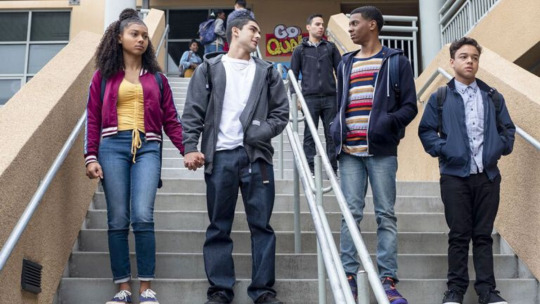
Last week Netflix released the third season of On My Block, a coming-of-age dramedy that follows a group of friends in South Central Los Angeles as they navigate everyday teenage life with the challenges that their neighborhood brings on.
The third season picks up right where season 2 left off, with the four friends (Monse, Cesar, Ruby, and Jamal) being kidnapped on their walk home from school. Once their kidnapper is revealed the four friends are roped into tracking down a former Santos gang member, Lil’ Ricky, who has been presumed dead for decades. The remaining seven episodes follow their struggles to find Lil’ Ricky while navigating their changing friendships and trying to have fun on their summer break.
Fans were shocked during the finale episode when all seemed fine until the show decided to give us a glimpse into these characters’ futures by jumping two years into the future. Many of them took to Twitter and other social media websites to vent their confusion and disappointment with the season 3 finale episode.
While I’ll admit the ending was shocking and tears were shed I completely see where the writers were coming from and am going to defend their decision. After all, if you watch the series closely enough you will see that the characters’ outcomes aren’t that shocking at all.
Don’t believe me? Keep reading and you will.
*Spoilers Ahead*
Monsé Finnie
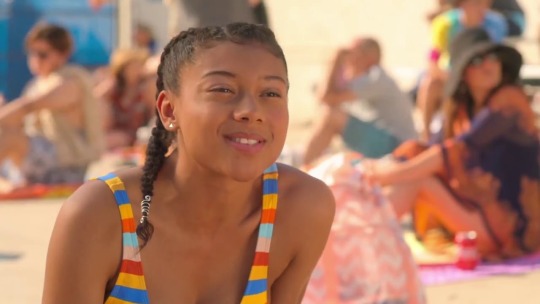
From the very beginning of On My Block, Monsé has been the de facto leader of the core four and the glue that holds them all together. As the only girl of the group she also takes over the reins as the “mom friend” who is forced to worry about her three best friends who are constantly getting themselves into trouble.
At the start of this season, she’s caught in the middle of wanting to get out of Freeridge to attend a boarding school and staying to keep her friend group together. Over the course of the season, we see her exhaustingly try to keep Cesar, Ruby, and Jamal together. She’s consonantly refereeing the boys and their countless arguments that sometimes get too personal.
On top of that, she’s trying to move on from her own grudges including forgiving Cesar for sleeping with someone else while she was away during season 2. And she also has to deal with the loss of her estranged mother this season which brings up and interesting array of feelings for her.
By the end of the season, Monsé is generally scared about what her future holds. On one hand, she’s just gone through an extremely traumatic experience with her friends and she’s seen them fight and nearly leave each other for dead. On the other hand, she’s mended her relationship with Cesar and finally has a girlfriend she can confide in. And yet, she has to give it all away to go to this new boarding school.
After everything is said and done, Monsé texts the core four asking when they can hang out again. We see each of the characters look at the message but no one answers. This is the beginning of the end of their ride or die friendship. Fearing this, Monsé begs her dad to let her stay in Freeridge but her dad and Cesar stand firm. Monsé was destined to get out of this place and this is her ticket out. We watch as Ruby, Jamal, and them on the curb to say one last goodbye.
Jasmine hands Monsé a homemade frame with her face decorating the edges and a picture of the core 4 inside. Monsé looks at it dearly and promises that she’s going to display it prominently in her new dorm room. The core four plus Jasmine share a group hug and for a moment everything is right in the world. But if you look close enough you can sense the tension and strain this is going through.
Eventually, Monsé gets in the car and drives off with her dad, the core four has officially split. And even though Cesar, Jamal, Ruby, and Jasmine watch Monsé’s car disappear together that sense of “everything is going to be okay” is lost now that the glue to their friend group has left.
And then the writers stab us in the hearts by showing Monsé two years later in her new dorm having a movie night with her new friends. The camera slowly pans to her nightstand and we see the beloved picture frame has been pushed to the back of her nightstand, overshadowed by pictures of her new friends and her new life.
Some might say it’s a classic case of teenagers growing apart and I think that’s part of the reason. After all, not everyone is destined to be best friends forever with their childhood friends. I think the other reason they grow apart is that Monsé can’t play her role as the mediator from towns apart. She isn’t there for the day to day arguments, to calm everyone’s nerves and remind each other why they’re all friends. In addition, she’s now living a very different life than her friends are. They don’t have the same problems anymore which means Monsé doesn’t have all the answers anymore.
More importantly, maybe she’s flat out tired playing that mediator role and with her new friends, she doesn’t have to. These new girls don’t force her to fix their problems, they don’t expect her to be the one constantly reaching out and checking in on them. Perhaps, they actually support her unconditionally which is something Monsé desperately needed not too long ago.
In the end, Monsé’s worst fear did come true — the core four disbanded but instead of being sad by it she almost seems relieved. And fans felt that was out of character for Monsé but is it? I don’t think it is. Monsé has spent years defusing arguments and we can see that’s she’s really fed up this time. She’s broken the vicious cycle of forgiving her friends (at least for now).
Of course, I don’t think Monsé purposely forgot about her friends, I do think they drifted away. And I don’t think this rift is permanent; after all, that’s what season 4 is for.
Cesar Diaz

Cesar has had a very tumultuous ride over the course of On My Block. In the first season is was forced into the Santos gang by his older brother and was instructed to kill a member of the rival gang. Unable to pull the trigger, the ramifications of his actions hurt those closest to him and jeopardized his future with the Santos. We saw those ramifications play out in the second season as Cesar struggled to live on the street and get back in his brother and his friends’ good graces. And by the end of season 2, he had succeeded.
Season 3 opens with Cesar being pulled back into the Santos life by the leader of the Santos herself. He and his friends are left with no choice but to help Cuchillos get what she wants or else their life is on the line — something Cesar is accustomed too but his friends are not. On top of that, Cesar’s estranged father, Ray, gets out of jail and wanders back into Cesar’s life. Having never had a relationship with him, Cesar jumps at the opportunity to get to know his father despite his brother’s warnings.
As time goes on Cesar begins to realize the severity of the situation he and his friends are in. After realizing how much Cuchillos has hurt his family, Cesar decides the only way he and his friends can win this war is if they kill her. As we get closer and closer to the end goal, we see Cesar tap into those gang mentality thoughts he fought so hard against in prior seasons.
After everything is said and done, we see the Cesar from prior seasons emerge as he comforts Monsé and pushes her to leave Freeridge. The old Cesar isn’t long for this world though. In fact, when we jump two years into the future we see Cesar’s worst fear has come true, he is now the leader of the Santos wreaking havoc on the rival gangs.
Out of all the time jump scenes, Cesar’s was the most jarring and the most heartbreaking. In fact, it’s the scene that got the fans most riled up because they felt it was wrong and uncalled for. Once again, though, if you watch the season closely enough you can see Cesar undergo this transformation from a teenager who wanted nothing to do with the Santos to a teenager who is ready to join them.
Cesar’s father returning is the first catalyst in his transformation from anti-Santos to Santos leader. That might seem silly since Ray is a new man after prison and is trying to have a better life now, but it’s the truth. Cesar has always known his father was part of the Santos but seeing him for the first time reinforces this idea that Cesar’s family lives, breathes, and dies because of the Santos gang. It’s their way of life. And even though Ray praises him for getting out and being smart, there’s still this undertone that Cesar is meant to be a Santos because it’s all they know.
If Cesar’s dad’s presence is the first catalyst to his transformation, his dad leaving is the final push Cesar needs. Why? Because it fills Cesar with rage and resentment and as Oscar said rage is how he survived in Freeridge for so long. Instead of channeling his rage into something positive, Cesar does what his family does best, turn their rage into violence.
When Cesar finds out Ray has left he tries to fight Oscar. He puts the blame for his shitty life on Oscar’s decisions. In fact, he utters the same exact words to Oscar that Oscar screams at Ray. One would think this would make him want to break the cycle of violence and his family’s need to be in the Santos gang but it only drives him closer to it.
We really see his transformation begin when the core four and Oscar decided its time to take Cuchillos down. After three days of not hearing from Oscar, Cesar begins to get worried and jumps into the action. The only problem is, he doesn’t want to put his friends in more danger than they already are so he turns to the only other family he has, the Santos. Cesar gets extremely agitated when he realizes the Santos aren’t looking for him. Worried that they’ve turned on him, Cesar confronts them and is ready to fight them but luckily he doesn’t have to. Oscar’s right-hand man steps up and defends Cesar’s wishes sending the Santos to the streets to find their leader. In doing so, Oscar’s right-hand man tells Cesar “We got you, Little Spooky,” which is the first time Cesar has ever seen the Santos truly protect him — and he likes it.
In the same episode, the core four is pulled together by Ruby after he receives a text from Cuchillos. This leads them to believe that Oscar has failed and forces Cesar to make the decision that he needs to be the one, now, to take Cuchillos down. Before the core four arrive at the hotel, Oscar’s right-hand man meets with Cesar to give him a gun. He promises to ride with Cesar no matter what, another hint that the Santos are willing to accept Cesar as their new leader if and when the time comes.
If you’re still not convinced that Cesar is beginning to accept his Santos lineage, the scene between him and Monsé should have you convinced. Monsé looks at Cesar holding the gun and asks him straight out, “this is just a one-time thing right? Because you have to.” Cesar has to pull his attention away from the gun to look at Monsé but his reaction doesn’t scream “one-time thing.” In fact, this really isn’t a one-time thing considering Cesar has held a gun to someone twice before. The difference is this time Cesar has the rage and motive to pull the trigger — and perhaps, he likes that power.
Because that’s the thing, being in the Santos means power. It means belonging. It means mattering. In the earlier scene with Cesar and Ray, Ray tells Cesar that he’s never needed anyone that he’s always known who he is and that Ray is jealous of that. But it’s not the truth. Cesar has struggled with his identity from the very beginning of the series. He’s struggled with finding acceptance within the core four because of his ties to the Santos. And for the first time, he’s seeing that maybe his place really is in the Santos where he can’t put his friends in danger anymore. Where he can be in control and be powerful instead of scared and helpless.
As if deciding to kill someone isn’t proof enough that Cesar is becoming a Santos, his willingness to fight Ruby when Ruby speaks the truth and “disrespects” Cesar. It only escalates when Jamal chimes in that being Cesar’s friend is a “liability.” Cesar’s fears have come true his friends have turned on him and the only one left for him once Monsé leaves is the Santos.
And the final knife into old Cesar happens when we watches Oscar make a deal with 19th Street to end the senseless violence and make things better for themselves. Instead of praising Oscar for this groundbreaking deal, Cesar tells Oscar he’s soft and that it’ll never work. As he watches Oscar give up his position in the Santos, Cesar sees this as his opportunity to take over.
Because even though everyone in Cesar’s life tells him that they’ve made them a better person and that he has the ability to be different and be better, Cesar doesn’t see it. He’s filled with rage. And the only way to take out that rage is to be the new leader of the Santos.
Jamal Turner

Jamal’s journey to the two-year time jump is a bit less intense than Monsé’s and definitely not nearly as intense as Cesar’s, but it was still a shocking twist for fans.
When we first met Jamal in the first season of the show he was the core fours goofy friend who was always up to something. He spent most of the first season trying to figure out a way to get out of playing football because he was afraid of getting hurt. After he finally quits the team, Jamal spends his time trying to find the rumored Rollerworld money. At the end of the first season, he does, in fact, find the money which is great considering the money becomes a key component of the second season.
The third season opens with the Rollerworld money gone and no puzzle for Jamal to solve, though that’s fixed rather quickly once Cuchillos gives them their new mission to find Lil’ Ricky. Jamal spends the rest of the season trying to be the leader of the group which is harder than he thinks given Jasmine’s new presence in the core four. In addition, he gets his first glimpse at high school romance thanks to a strange homeschooled girl who has taken to stalking him.
Jamal goes through a very emotional journey as he struggles to come to terms with his new role amongst his friends and how to juggle his new relationship with the rest of his life. In addition, he’s stuck trying to solve an unsolvable puzzle.
By the time the two-year time jump happens, Jamal has accepted he’s not the leader, fought with his friends, broken up with his girlfriend, and realizes that he doesn’t have a mystery to solve anymore. In turn, when we see him two years later he is now laughing and enjoying his life while wearing a football jersey. As Ruby passes Jamal and him share a look so many of us can relate to — they’ve grown apart.
A lot of fans were caught off guard that Jamal, who actively spent an entire season trying to avoid playing football, would suddenly join the football team again. But it’s not that shocking.
Think about it, the only reason Jamal was against playing football was that he was afraid of being hurt. By the end of the season, he’s literally been threatened by a powerful gang leader and cheated death on more than one occasion. He’s faced his biggest fear of getting hurt and being dead and now, with that fear gone he can enjoy the game of football without worrying what’s going to happen to him.
It’s not just his newfound bravery that makes football the perfect fit for him though, it’s also the fact that Jamal loves puzzles. He spent three seasons tracking down money, missing people, and trying to figure out how to get his friends out of trouble and he loved it. When you think about it football is a great place for someone who loves to solve puzzles because plays are puzzles. He would actually be a great asset to the team if he was able to dissever the opponent’s plays.
On top of that, Jamal’s always wanted to be a leader and yet, his friends have never taken him seriously. He’s never been a leader in the core four’s eyes and its something that has frustrated him for years. In that time jump, he has the undivided attention of the team, he’s the one telling the story that’s making everyone laugh with him and not at him. Jamal finally found a place where he could be a respected leader.
The most jarring thing for fans to come to terms with in regards to Jamal’s time jump scene was the fact that he and Ruby don’t talk. While I agree that we don’t see Jamal and Ruby growing apart from each other as much as we do with some of the other characters this season, the tensions in their relationship are still there. The fact of the matter is while Ruby was desperately trying to help his parents pay off his medical bills this season, Jamal was prioritizing finding Lil’ Ricky. So yeah, maybe they did just grow apart organically or maybe they truly needed time apart because they weren’t on the same page anymore.
Ruben “Ruby” Martinez Jr
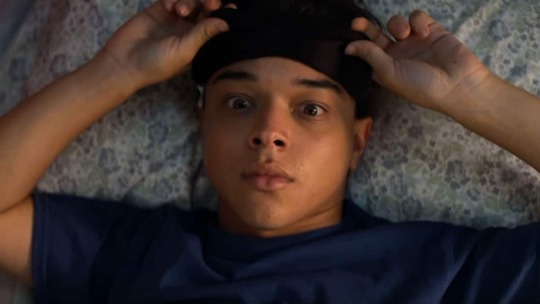
Out of the core four Ruby has the most heartwarming transformation.
When we first meet Ruby he’s a hopeless romantic who’s a little too obsessed with girls. He’s often the one friend who gets the core four out of trouble and he truly is ride or die even if he doesn’t always show it.
At the end of season one, Ruby ends up getting shot at a family friend’s quince which leaves the family friend dead. Ruby spends much of season 2 juggling his intense PTSD while also trying to help his friends get Cesar out of harms way yet again.
By the time season three rolls around, Ruby is somewhat better but he still suffers from survivor’s guilt and is a bit numb to the world. His one wish at the start of the season is to just be a normal teenager but of course, that’s impossible given the world he lives in and his friends.
He begins to have feelings for Jasmine, a girl who’s been obsessed with him since childhood that the core four have often brushed off as crazy. On top of that, Ruby learns that his parents are going through marital problems partly due to Ruby’s growing medical bills after being shot.
Ruby spends much of the third season trying to figure out a way to help their friends while also trying to survive his impending death for a second time. On a positive note, he’s also trying to discover if his new feelings for Jasmine are permanent or if they’re a stress reliever given their current life or death situation.
Ruby once again takes charge of the core four after Cuchillos leaves him a burner phone that allows her to communicate with the core four. He’s the one who pulls the group together after they realize that Oscar is probably dead and he’s the one who devises the plan on how to take down Cuchillos together. Even though his actions make him appear as the leader of the group, he doesn’t feel like that.
In fact, he feels alone even when he’s with his friends. Jamal is too caught up in his first relationship and the newest puzzle to help Ruby with his financial trouble. Ruby tries to bond with Monsé after her mother passes but even she ends up pushing him away by expressing her fear of being numb to pain and loss — something he has first-hand experience with. And he nearly comes to blows with Cesar after finally admitting that everything that’s wrong with him is because of Cesar.
After he utters those words, there’s no going back. It’s the crack in their foundation that makes Ruby distance from the core four make sense in the time jump.
Even though Ruby losing his friends is sad and not what viewers wanted, it’s what he needed to finally live a normal teenage life. And the time jump is the proof of that since we see Ruby and Jasmine walking the halls of their high school happy and in love for the first time in a long time.
Oscar “Spooky” Diaz
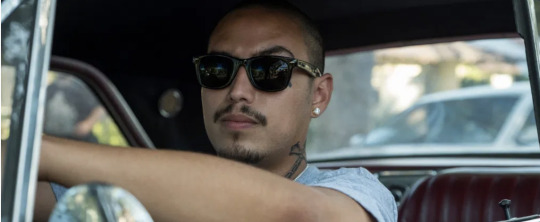
Oscar, or Spooky as he’s known for most of the series, has the most positive drastic change during the two-year time jump. And it’s the one fans welcomed the most.
When we first meet Oscar he’s fresh out of jail and back to reclaim his seat as the leader of the Santos. His first mission is to innate Cesar into the gang life which isn’t an easy task given Cesar’s hesitance. The two have a very tumultuous relationship in season one but they do manage to share a few heartfelt moments together. Most memorable is the scene on the beach where they both fantasize about what their life could be if they weren’t stuck in Freeridge and had parents who were actually capable of being parents.
Unfortunately, that closeness doesn’t last long and in season two, Oscar is forced to turn his back on Cesar after he puts the Santos lives in jeopardy after not killing a member of the rival gang at the end of season one. It takes the entire season for Cesar to prove himself to Oscar but eventually the two reunite and take down the Prophets once and for all.
Season 3 should have been an amazing season for these two brothers who are finally starting to heal but instead, their father, Ray, comes back into the picture and drives a wedge between them. See, Cesar doesn’t remember what his father’s presence is like but Oscar does and Oscar doesn’t want Cesar to go through any more shit than he’s already had to deal with. But Oscar can’t protect Cesar from himself — and that’s an important thing to remember as the season continues.
If season 3 for Cesar is about Cesar’s transformation into a Santo, then Oscars season 3 is about his transformation away from the Santos.
This shift becomes clear halfway through the season when Oscar confronts Ray about all the shit that he did to Oscar. Oscar blames Ray for everything that’s wrong with Oscar’s life. He blames Ray for forcing him to grow up and be the leader of the Santos even though it’s not what he wanted. Ray tells him he needs to let go of his rage and move on because he can’t fix the past. In a pivotal move, Oscar tells Ray that he can’t let go of the rage because it’s the only thing that’s kept him alive in Freeridge for so long.
The ironic thing is, in telling his father off, Oscar has let go of his rage. And from that moment on, we see Oscar take steps to distance himself from the Santos. The first move comes when he helps the core four plan to take Cuchillos down by sacrificing himself for them. For the first time, Oscar realizes that the Santos aren’t his family and that they don’t have his back the way he might have thought they had.
By sacrificing himself for Cesar and his friends, it’s the first step Oscar makes against the Santos. Thankfully, his mission pays off and he’s able to make a deal with 19th Street that would allow both gangs to live in peace without fear of being shot over meaningless issues. This scene is Oscar’s final act as a Santo and in turn, it’s the turning point Cesar needs to step into his brother’s role.
When Cesar confronts Oscar about being soft and being played Oscar can’t bring himself to care. He even goes as far as telling Cesar that he wants “adult problems” and that he’s done with this way of life. That he’s done living his life with resentment and missed opportunities. Instead of agreeing with Oscar, Cesar asks him “what if someone takes your power?” To which Oscar responds “let him.” And in that moment, it’s clear that while Oscar is done with the Santos life, Cesar is just beginning.
And so the two-year time jump shows the drastic reality that Cesar has taken over the Santos; while Oscar has finally gotten what he’s always wanted — a wife, a kid, and a normal life.
Now, many have criticized Oscar’s happy ending wondering why he didn’t get Cesar out of Freeridge too. They’ve been vocal about their issues with him leaving his baby brother to run a gang he knows will ruin his life.
But here’s the thing. You can’t help someone who doesn’t want to be helped. Oscar knows this.
He knows Cesar is still full of rage and resentment, especially towards Oscar. And at the end of the day, Oscar doesn’t want to be in charge of his baby brother anymore. He never wanted to in the first place. And even though we’ve seen Oscar be a good brother over the course of the season, we can’t forget the fact that he literally forced Cesar to sleep on the streets for nearly an entire season.
Oscar finally chose family over the Santos, but unfortunately, Cesar didn’t make that same choice and that’s no one’s fault but Cesar’s.
And that concludes my long rambling essay on why I stand by the writer’s finale decisions. Even though I support them, I know that this is not the end of the core four. And I can’t wait to see what season four has in store for us because I’m certain we’re going to get one.
Even though the season 3 ending might be realistic, it doesn’t match the positive tone On My Block has always given us. Which is why I know this is not the end of the core four’s journey.
Want more posts like this follow me here or on wordpress.
#on my block#omb#on my block season 3#monse#cesar#spooky#oscar#jamal#ruby#cesar x monse#ramblings#tv shows#tv
5 notes
·
View notes
Text
The Best Movies of 2020
https://ift.tt/34YpJ4d
Thank goodness that’s over, right?
To say 2020 was a challenging year is like announcing the Hindenburg had a rough landing. In a period that’s transformed how billions live their lives, there isn’t one person, family, business, or industry that wasn’t impacted significantly by upheaval. And that includes going to the movies.
Just 12 months ago, moviegoers were turning out by the millions to see their favorite space adventures in theaters. Now they’re watching them, and everything else, on streaming. It’s an astonishing journey we’ve detailed further here, but even if our relationship to how we experience films is changing, the fact remains cinema is as vital a form of escape and inspiration as ever. And even in 2020, as Hollywood studios largely abandoned multiplexes to fend for themselves, there also remained excellent motion pictures. Some were released on Netflix, some experimented with premium video on demand, and a rarified few still entered theaters.
Here’s 25 of them.
25. Host
This Zoom horror movie, completed from start to finish in 12 weeks during the middle of a pandemic, might be the movie that sums up 2020 better than any other. But it should also be noted that it’s genuinely very good. The feature debut of Rob Savage runs at just 57 minutes (how very 2020, as in any other year its halfway house runtime might have hurt the movie’s chances), and in that time it sees a group of friends attempt to carry out a séance over Zoom. However, something goes wrong (or is that right?) and a malign entity enters the call.
Performed by a group of women, and one man, who already know each other really well, it’s the easy shorthand of their friendship that elevates this and helps the audience to instantly care. Meanwhile it’s the ambition and inventiveness of Savage and writers Jed Shepherd and Gemma Hurley which increases the scale of this beyond a lockdown found footage movie and into territory where complicated stunt work was involved. First and foremost though, it’s scary. Like really scary. How very 2020. – Rosie Fletcher
24. Minari
There is currently a bit of controversy over the Golden Globes categorizing Lee Isaac Chung’s Minari as a “foreign language film.” If that stands, it will be a genuine shame, and a greater slight, for this is an all-American story. A semi-autobiographical reverie for its writer-director, Minari depicts a family of Korean-Americans who immigrated to the United States in the 1970s and are now trying to make it as farmers in rural Arkansas in the 1980s.
A beautiful ode to childhood, and both the hardships and joys of the immigrant experience, what’s most rewarding about Chung’s film is its quiet intelligence at working from first the perception of a child named David (Alan S. Kim), and then also from the vantage of his parents and their increasingly frayed marriage (a mutually raw Steven Yeun and Yeri Han). It even has a deep reservoir of understanding for the more complex sorrows of grandmother Soonja (Youn Yuh-jung). Minari is a sophisticated multigenerational snapshot of a distinct group of American lives, and it’s among the best films of the year, however you categorize it. – David Crow
23. Kajillionaire
Miranda July’s ethereal scammer dramedy carries the con-artist torch from Bong Joon-ho’s 2019 masterpiece, Parasite, and once again allows audiences to live vicariously through a scrappy family surviving on society’s margins. But unlike Bong’s Kims, Kajillionaire’s Dynes (Robert Jenkins and Debra Winger) are far from sympathetic; they’re poisoned by their warped take on the American Dream.
Evan Rachel Wood turns in one of 2020’s most stunning performances as their strange daughter, Old Dolio: fierce yet naïve, raised to regard all relationships as transactional and so utterly at a loss as to how to navigate her attraction to their new co-conspirator Melanie (Gina Rodriguez). Old Dolio’s roughness contrasts beautifully with the surreal wonder of July’s dreamy motifs—here, soap bubbles representing the fragility of a life that could change with one puncture.
No one could have predicted that this year would implode worse than a scam gone wrong, nor that even the most well-adjusted families would have to grapple with setting uncomfortable but life-saving boundaries with loved ones. Yet here we are, and somehow July’s hopeful story came to us at exactly the right time: We can delight in Old Dolio breaking toxic patterns, and the elder Dynes learning that letting go of something valuable can be more beneficial than squeezing the life out of it. – Natalie Zutter
22. The Assistant
One of the year’s most unassuming but devastating films is writer-director Kitty Green’s seamless foray from documentary (Casting JonBenet, Ukraine is Not a Brothel) into a classic “inspired by true events” feature. Those true events are the Harvey Weinstein scandal, as the film follows a day in the life of a low-level assistant (Julia Garner) in a prominent Hollywood executive’s New York City office. The Weinstein-like character is never directly seen, and Jane is one of many peons who sketch out the space around his considerable form, as they arrange his midday hotel reservations and restock his private stash of erectile dysfunction medication.
Read more
TV
The Best TV Shows of 2020
By Alec Bojalad and 9 others
Games
The Best Games of 2020
By Matthew Byrd and 3 others
Yet out of the whole office, Jane is both the most valuable and the least valued: first one in, last one out, she has devoted all of her waking hours to streamlining this powerful man’s day—which includes covering over his gravest sins with regard to the pretty, impressionable young women she ushers into his office.
Every phone conversation or behind-closed-doors meeting is intentionally muffled so that Jane herself can hardly hear it, let alone the audience. These murmuring pockets invite the viewer to fill in the blanks, imagining the worst possible scenario. The film never gets explicit, but Jane’s dawning realization and horror at her complicity is unsettling enough. Even more so when her attempts to flag this unimaginably inappropriate behavior get undermined by the self-protecting hierarchy of the company. The Assistant is more character portrait than anything else, and it treats its archetypal figure with more sympathy than her real-life counterparts might have earned, but its depiction of seemingly harmless eccentricities snowballing into an unconscionable abuse of power is a must-watch. – NZ
21. His House
This Netflix original horror movie took people by surprise when it landed on the service. The feature debut from Remi Weekes, His House is a clever, nuanced political movie that leans hard into horror tropes, working both as a commentary on the treatment of refugees in Britain and as a seriously frightening ghost story. Wunmi Mosaku (Lovecraft Country) and Sope Dirisu (Gangs of London) play a Sudanese couple who escape the violence of their own country only to find themselves hemmed in by the bureaucracy and judgement of the UK. Placed in a decrepit home that they can’t leave, they are haunted by spirits they brought with them while facing the nightmare of a country that pretends to care but barely sees them as people.
Read more
Movies
His House and the Horror of “Otherness”
By Rosie Fletcher
Movies
The Best Horror Movies of 2020
By Rosie Fletcher and 4 others
The performances across the board, including a supporting role from Matt Smith, soar, and the production design is unique, haunting, and at times very beautiful. This is a powerful first film from an exciting new voice, a must-watch for genre lovers, and a showcase for a strong, if not often told, social message that talks about culture, society, and gender. It’s about the demons we see and the ones we do not. – RF
20. Emma.
Jane Austen’s fourth novel, and the last published in her lifetime, has been filmed many times. But director Autumn de Wilde’s version is the best one, perhaps because she is the first woman to helm a straightforward adaptation. Leaning into Austen’s own designs for the book, where the author mused she would “take a heroine whom no one but myself will much like,” Emma. embraces the mischievous and sardonic side of Austen’s wit, and her heroine who was gifted with being “handsome, clever, and rich” from the word go.
Filmed with supreme confidence and a sumptuous color palette of bright pastels in brighter natural lighting, Emma. is vibrant and often veers cheerfully near screwball comedy. This approach is only buoyed by Anya Taylor-Joy, who began a strong year of work with this multifaceted and exceedingly rich portrait of Ms. Woodhouse, in the most magnanimous sense. She and her director searched for “questionable intent” in the material while still crafting a warm film that bubbles with life. It also enjoys a wonderful soundtrack thanks to a collection of actual 18th and 17th century English folk songs, and a puckish score by David Schweitzer and Isobel Waller-Bridge. – DC
19. The Father
Director and screenwriter Florian Zeller’s adaptation of his own stage play stars Anthony Hopkins as Anthony, an elderly English man suffering from the onset of dementia. Olivia Colman is his daughter Anne, who is planning a move to Paris to live with her partner, and is desperately trying to find a new caregiver for her father. People drift in and out of the narrative under different names, Anthony’s spacious apartment seems to change around him and time itself seems to bend before we realize we are seeing almost all the events from Anthony’s point of view—which means that none of what we see can truly be trusted.
Read more
TV
The Best TV Episodes of 2020
By Alec Bojalad and 8 others
Books
The Best Books of 2020
By Kayti Burt and 6 others
This makes what could have been a conventional drama about illness and memory into something brilliant and terribly heartbreaking, with Hopkins and Colman giving performances that are nothing short of titanic and Zeller’s cool, controlled direction making the emotional cost even more profound. The final scenes of this nearly perfect film will leave you devastated, even if this awful disease has never impacted your life personally. – Don Kaye
18. Sound of Metal
Sound of Metal gives us an up-close, immersive look at what it feels like to suddenly go deaf, and to realize that massive life changes don’t have to portend the end of what it means to live. Riz Ahmed is excellent as Ruben, a recovering drug addict who drums in a heavy metal duo alongside his girlfriend, singer/guitarist Lou (Olivia Cooke). The two tour the indie rock circuit in a beat-up but cozy RV that also serves as their home, but their gypsy lifestyle is upended when Ruben abruptly loses his hearing.
Director Darius Marder (who co-wrote the script with Abraham Marder) does not give into sentimentality even as Ruben moves through grief, loss, denial, anger, and self-pity, all the while clinging to the possibility that he may find a surgical way to restore his hearing. His journey also takes him to a home for deaf people in recovery (headed up by the marvelous Paul Raci, whose own real-life story involving deafness is remarkable), and eventually opens his heart and mind. The excellent sound design is the final touch on a captivating and highly original story. – DK
17. The Personal History of David Copperfield
After exposing the sheer absurdity of modern politics in films and series like In The Loop, The Death of Stalin, and Veep, Armando Iannucci found solace this year in creating this earnest, light, charming adaptation of Charles Dickens’ classic novel, David Copperfield. The film still tackles Dickens’ persistent themes of class, privilege, poverty, and human rights, although in far less scathing fashion than Iannucci is known for. Casting his project in colorblind fashion has also allowed the director to subtly modernize the piece while grounding it firmly in 1850s England.
Some of us may get a bit lost in the onrush of characters and events in this fast-paced film, as Iannucci breezes through a lot of the book’s events. But the story itself, and the multitude of vivid, colorful, oddball characters who are led by an enthusiastic Dev Patel as David, are so timeless and relevant to the human condition that only diehard loyalists to the original text may find something to grumble about. The rest of us can enjoy a delightful adaptation that we might not even know we needed. – DK
16. Bad Education
For his whole career, Hugh Jackman has been celebrated for his consummate showmanship. Whether it is as ambassador for a major superhero franchise or the song and dance man who can win Tonys at the same ceremony he’s hosting, his charm is irresistible. So imagine his delight when director Cory Finely presented him with Bad Education: the movie where his ability to ingratiate turns into something sinister and perfectly apt for the year it was released in.
Based on a 2004 New York Magazine article about the largest school embezzlement scandal in history, Bad Education plays like a dark comedy about American greed, as well as prologue for the 21st century hucksterism that was to come. Filmed with the same clinical nihilism found in Finley’s Thoroughbreds, this film is so much larger in its landscape of apathy of self-delusion. And at the center of it is Jackman’s affable Long Island school superintendent, a man who hides dark secrets and a bottomless pit of narcissism, both of which allow him to tell any lie that keeps him on top. Hence why watching his house of cards fall is pretty satisfying, especially these days. – DC
15. Small Axe
Steve McQueen’s latest effort, an anthology of short films set around Black communities in 1970s and ’80s Britain has been the source of some debate. Should these be looked at as individual films or can the work only be considered as a whole? We don’t have a satisfactory answer either, but Small Axe is as thoroughly compelling as the rest of McQueen’s work, and two films in particular, Mangrove and Lovers Rock are standouts.
Mangrove is the longest, most traditionally “feature length” entry in Small Axe. Gifted with urgent, authentic performances to tell the story of the Mangrove Nine, it’s also (like the rest of the films in the anthology) an effortlessly immersive recreation of its era, even as its subject matter resonates uncomfortably with today’s headlines. But while the other movies that comprise Small Axe are shorter than many features, they’re no less powerful. The immensely beautiful Lovers Rock, with its haunting reggae soundtrack and beautifully filmed party scenes, serves as a reminder of so much of what we’ve lost and taken for granted in this pandemic year, and the intimacy that can be found in crowds. It’s essential viewing, and both a snapshot of a moment in time and a reminder of something else we’ve lost to this pandemic year. – Mike Cecchini
14. Tenet (READERS’ CHOICE)
In a tumultuous year, no blockbuster has had quite as much controversy surrounding it as Christopher Nolan’s Tenet. The director was notoriously adamant that his film should be the one to lead moviegoers back to cinemas worldwide, a quixotic (some might say selfish) endeavor that might’ve undercut the ambition of a movie that blends the action and spectacle of the wildest James Bond movies with elements of time travel, quantum physics, and Nolan’s famed attention to detail.
But lost in all that controversy—and perhaps in its nigh-incomprehensible plot—is the fact that maybe, were the world not in the midst of a deadly pandemic, Nolan was right.
Perhaps more than any other blockbuster of the last year or more, Tenet was clearly designed with the cinematic experience in mind. Action set pieces, filmed in gorgeous locations that would be spectacular on their own, take on the quality of magic tricks as events and performances are “inverted” by the film’s central, mysterious technology.
Read more
Movies
Tenet Ending Explained
By Chris Farnell
Movies
Tenet’s ‘Inversion’ Logic Explained
By Chris Farnell
Even Nolan’s notorious penchant for emotionally distant main characters is undercut by performances from John David Washington and Robert Pattinson that bring this about as close to a buddy action movie two-hander as you’re ever likely to see from the director. Whether you ultimately view Tenet as a smarter-than-your-average thrill ride or a puzzle that can only be unlocked via repeated viewings, it still deserves, even demands, your full attention. – MC
13. One Night in Miami
Regina King has been in the business of making movies for nearly three decades. Who knew she could also be such an astonishing director? Yet with her first theatrical feature, she announces undiscovered talent in this sweltering, jubilant film that interrogates what life is like at the intersection of Black art and Black commerce in America.
With screenwriter Kemp Powers adapting his own stage play, One Night in Miami imagines a fictional account of an evening where Malcolm X (Kingsley Ben-Adir), Sam Cooke (Leslie Odom Jr.), Jim Brown (Aldis Hodge), and the man who would soon be Muhammad Ali (Eli Goree) walk into a 1964 motel room. Their conversations about the challenges of Black celebrity in a world that pulls them both toward the desperate need of social equity and the more comfortable appeal of white-friendly affability, is one that is still going on to this day. But it’s told here with bombastic performances and a visual flair that is so kinetic it overcomes the admittedly stagebound limitations of the film’s conceit. – DC
12. Soul
What does it mean to have soul? How do you feed it? Joe Gardner, the Jamie Foxx-voiced protagonist of Soul, thinks he has the answer in the keys of his music, but the beauty of this latest Pixar film is it lives within the ambiguous places that aren’t be so easily defined. As yet another sophisticated offering from co-director Pete Docter, who previously co-helmed Inside Out, Soul pushes Pixar back toward its ambitious best, finding a way to convey complex ideas in an adventure with universal appeal.
With dazzling animation that leans into abstract concepts about life, death, and a weird transient state between the two, the film asks big questions in a way a child can appreciate, if not fully understand. To be sure, it’s the rare kids’ movie that gingerly suggests there is happiness in the seeming pointlessness of existence. It also benefits from ascendant music by Trent Reznor, Atticus Ross, and Jon Batiste on the piano. In fact, realizing Nine Inch Nails penned one of the great Disney scores might be 2020’s most pleasant surprise. – DC
11. Saint Maud
The directorial debut of Rose Glass did the festival circuit in 2019 and was due to land in cinemas in the spring. Instead it was pushed back to October in the UK, mid-pandemic. So perhaps it didn’t get the fanfare it would have garnered in a normal year. Set in a rundown seaside town, the movie sees young palliative care nurse Maud (Morfydd Clark) become obsessed with her patient Amanda (Jennifer Ehle), who is dying of cancer. After a highly traumatic incident, Maud has found God—a God she believes talks directly to her and has made it Maud’s mission to save Amanda’s soul.
Read more
Movies
A24 Horror Movies Ranked From Worst to Best
By David Crow and 3 others
Movies
Saint Maud and the True Horror of Broken Minds and Bodies
By Rosie Fletcher
A nightmarish horror of shifting perception, where bodies and minds are in conflict, this is a movie packed with indelible imagery, not least the devastating final scene. Ehle is excellent as the former dancer whose body is letting her down, but Clark is a revelation as the tiny, fierce Maud, all self-flagellation and buttoned up piety until she’s not. – RF
10. Nomadland
Utilizing both actors and real people, director Chloé Zhao (The Rider and Marvel’s upcoming Eternals) chronicles the lives of America’s “forgotten people” as they travel the West, searching for work, companionship, and community in the years following the Great Recession. A brilliant Frances McDormand stars as Fern, a woman in her mid-60s who lost her husband, her house, and her entire previous existence when the town she lived in—Empire, Nevada—vanished off the map following the closure of its sole factory.
Zhao’s film quietly flows from despair to optimism and back to despair again, all while the hardscrabble lives of its itinerant cast (many of them actual nomads) is foregrounded against stunning, if lonely, vistas from the American countryside. Nomadland shows us both the best and worst of America at once: the cruelty of a nation that refuses more and more to take care of its own, juxtaposed with the decency and compassion one can find on an individual basis. Whether the latter is enough to overcome the former is one of Nomadland’s haunting, unanswered questions. – DK
9. Wonder Woman 1984
A movie about flying and lying (even to one’s self), Wonder Woman 1984 came onto the pop culture scene at the very end of a very bad year. For many, the film’s muddled superhero logic and lackluster third act action scenes were enough to ruin the experience. For others, including many of us, the big budget earnestness of Diana Prince won the day. The film’s delights include charismatic performances from Pedro Pascal and Kristen Wiig as complex antagonists Maxwell Lord and Cheetah; a breathtaking Themyscira sequence; and Chris Pine pretending to ride an escalator for the first time.
Ultimately, however, Wonder Woman 1984 warrants a spot on this list due to its unexpected thematic priority. While many storytellers use a 1980s setting as an excuse to blast Blondie (fair enough), give the costume department free rein on shoulder pads (yes, please), or to harken back to an imagined simpler time (sure, whatever), director and co-writer Patty Jenkins uses it as a way to rewrite American history.
Read more
Movies
Wonder Woman 1984: DC Comics Easter Eggs and Reference Guide
By Delia Harrington
Comics
The Best Comics of 2020
By Jim Dandy and 2 others
If the 1980s was an era that saw economic policies shifting the power from government to Wall Street, then here is a superhero flick that goes back in time to imagine a different path forward, one in which America is able to avoid the path that prioritizes the few over the many. It’s a fantasy, sure—and one that is understandably too porous for some to enjoy—but it’s a particularly cathartic one for 2020. – Kayti Burt
8. Ma Rainey’s Black Bottom
Adapted from August Wilson’s play by director George C. Wolfe (and not quite able to escape its stage origins), Ma Rainey’s Black Bottom is set during a heated recording session by the title artist–one of the pioneering blues singers of the 1920s–and her touring band. As tensions rise between Ma (Viola Davis) and certain band members, plus Ma and the white men, who of course own the record label, the band members find themselves at odds over the music they’re making and much more.
Read more
Culture
Ma Rainey’s Life and Reign as the Mother of the Blues
By Tony Sokol
Movies
Ma Rainey’s Black Bottom Ending Explained
By Tony Sokol
While Ma and the events of the story may be fictionalized, the issues that come up—race, religion, money, and art—are not just universal but as relevant as ever in terms of the Black experience in America. Davis is a supernova as Ma, and the rest of the supporting cast is just as terrific. Yet the spotlight undeniably belongs to the late Chadwick Boseman in his final screen appearance. As Levee, the trumpeter who wants to go solo, Boseman radiates rage, pain, and frustration in a performance as incendiary as it is tragic. – DK
7. Birds of Prey
Harley Quinn’s fabulous emancipation was just that—fabulous. As a fierce, funny, feminist ensemble piece with a quality cast that flipped on its head Harley’s dubious treatment at the hands of Mr. J in Suicide Squad, Harley herself, Margot Robbie, pitched the movie back in 2015. Birds of Prey shows a different side to Gotham City where a grubby underworld of people are trying to scratch together a living, and the only thing objectified in this female team-up is a bacon and egg sandwich (and what a sandwich it is).
Read more
Movies
How Birds of Prey Subverts the Male Gaze
By Kayti Burt
Movies
Birds of Prey’s Marilyn Monroe Musical Scene Explained
By David Crow
Working from a script by Christina Hodson, director Cathy Yan’s film has a totally different flavor from anything that had come before from the DCEU. R-Rated, rude, and colorful, the movie sees the whole of Gotham out to get Harley now that she’s no longer under the Joker’s protection. But a young pickpocket, a stolen diamond, and Ewan McGregor’s gangster bring together a mismatched bunch in a joyful slice of anarchy that hits exactly the right notes. Superhero movies don’t get much more fun than this. – RF
6. Mank
The authorship of Citizen Kane has divided critics and film scholars for generations. So you can almost sense the glee boiling up in David Fincher as Mank wades right into the middle of it with a stylized and exquisitely crafted love letter to Herman J. Mankiewicz—and proverbial middle finger toward Orson Welles. One sympathizes, as Mankiewicz (or “Mank”) has been an unsung figure in film history: a member of New York’s 1920s generation of literary writers and journalists who bought into the allure of easy money in Hollywood but never got the credit he deserved for selling his soul.
Well, Mank attempts to return it with interest. A film that basks in demolishing Old Hollywood nostalgia, even with its black and white photography and heightened melodramatic score by Trent Reznor and Atticus Ross, Mank recalls the ugly side of yesteryear, and the greed that slaughtered talent, be it for money as embodied by Louis B. Mayer, or ego as personified by the film’s vision of Welles.
Yet its elegy for Mankiewicz—portrayed with delicious self-loathing by Gary Oldman—and his generation of forgotten writers is what makes the film unexpectedly warm for a Fincher joint. As does Mank’s relationship with Marion Davies, an also overlooked movie star given spirited reconsideration by Amanda Seyfried in one of the year’s best performances. – DC
5. Palm Springs
There must be something hypnotic about the banality of time loops, because to date the concept hasn’t produced a bad movie. Harold Ramis and Bill Murray’s Groundhog Day remains the paterfamilias, and prime original day, for the form. Yet that film’s many imitators have still pushed other filmmakers toward genuine inspiration. And that may have never been truer than for Palm Springs, a millennial reimagining of Groundhog’s exploration of a romance stuck on repeat—but with an ingenious added wrinkle.
Instead of one half a potential couple being oblivious to her role in a cyclical love story, both Nyles (Andy Samberg) and Sarah (Cristin Milioti) are keenly aware of their shared Sisyphean hell. Worse still, they’re also trapped at a lame wedding. The small addition has massive creative repercussions, with director Max Barbakow and company lightly critiquing the implicit ickiness in Ramis’ film, as well as providing an opportunity for a true two-hander film between Samberg and Milioti. It’s Samberg’s best work to date, but Milioti is the real revelation as the woman who is our eyes and ears into a circular existence that is both horrifying and pleasant, romantic and exhausting. Like the film as a whole, this is a delightful nightmare. – DC
4. Da 5 Bloods
Hollywood’s great reckoning with America’s involvement in the Vietnam War may never truly end. But few films have gotten to the human cost of the war that lingers long after soldiers came home quite as emotionally as Spike Lee’s Da 5 Bloods.
Alternately a heartfelt tale of friendship and identity amidst shared hardship and a raucous action movie, effortlessly connecting the dots between the racial politics of the Civil Rights era during the Vietnam War and the Black Lives Matter movement of today, Da 5 Bloods may be the most clear-sighted movie about the conflict ever made. The film’s emotional power is bolstered even further by a rousing Terence Blanchard score, as well as a significant chunk of Marvin Gaye’s era-defining masterpiece album, What’s Going On.
Even at 156 minutes, Da 5 Bloods never overstays its welcome. Despite an action heavy third act that may seem incongruous with some of the film’s weightier themes, its characters are so powerful, and the performances so unforgettable, that nothing is ever lost. And while each of the film’s five leads (not to mention Chadwick Boseman’s almost ethereal “Stormin’” Norman Holloway, seen only in flashback) are terrific, none are more haunting than Delroy Lindo’s manic, tortured turn as Paul, a soldier still bearing the scars of war, both foreign and domestic. – MC
3. Promising Young Woman
Carey Mulligan plays against type in this candy colored fable of an avenging angel who goes to nightclubs and pretends to be wasted in order to shame the men who try to take her home and take advantage. It’s an ultra modern take on the rape-revenge subgenre with a very female gaze. Mulligan’s Cassie is a delicate clothes horse with multicolored nails who works in a coffee shop and lives with her parents—her brand of revenge is specific, personal, and highly female.
Despite the dark subject matter, this is an unashamedly fun film (um, until it’s not) with a killer soundtrack. It’s the directorial debut of actor Emerald Fennell (most recently seen playing Camilla in The Crown), who also wrote the picture, and she reveals an extremely distinctive style. A starry supporting cast also deliver uniformly excellent performances, including Bo Burnham, Christopher Mintz-Plasse, Adam Brodie, and Alfred Molina, which makes this feel big budget glossy.
Read more
Movies
Da 5 Bloods Opening History Montage Explained
By David Crow
Movies
What the Mank Ending Leaves Out About Orson Welles and Citizen Kane
By David Crow
But it’s Mulligan’s movie. It’s impossible to take your eyes off her, and she owns the screen as a powerful warrior, a vulnerable soul, and a heroine for our times. – RF
2. The Invisible Man
A Blumhouse redo of a Universal classic from the bloke who wrote Saw, on paper this wouldn’t be an obvious contender for a year-end best list. But then The Invisible Man isn’t an obvious movie. As the last film many saw at the cinema before lockdown landed, The Invisible Man is an incredibly smart take on the H.G. Wells story, which focuses not on the scientist who creates the suit that makes him invisible, but the woman he uses it to terrorize.
He may be “the guy who wrote Saw,” but writer-director Leigh Whannell has proved himself incredibly adept at a certain kind of action/horror with this and Upgrade—both include thrilling sequences of people who aren’t in control of their own bodies. Here it’s Elisabeth Moss who is being stalked by her abusive ex-boyfriend. Whannell uses the conceit to great effect: It’s a movie about gaslighting, which has the audience scanning the peripheries of the scene at all times, keeping us on edge, just like Cece, and wrong footing us all the same.
Top notch performances and serious subject matter handled with panache make this a scary standout for any year. We can’t wait to see what Whannell does with The Wolfman… – RF
1. The Trial of the Chicago 7
“The whole world is watching.” That is the chant shouted throughout Aaron Sorkin’s second directorial effort, The Trial of the Chicago 7, and it echoes in our 2020 ears like the Ghost of Christmas Past. A little more than 50 years ago, the United States government put eight men on trial for protesting the Democratic National Convention—and the Vietnam War its presumptive nominee supported. This legal circus occurred even though the riot that broke out during the protests was started by the police. It would be understatement to note it all plays as eerily prescient today.
Beyond the loaded political subtexts though, the movie’s placement on this list reflects what happens when Sorkin’s screenplays achieve their greatest alchemy: With words being deployed in a courtroom as ruthlessly as batons were on a summer night in Chicago, each dialogue exchange in Chicago 7 is kinetic. The film defies the seemingly stagey quality of its legal setting, and not by just inserting flashbacks to a recreation of the 1968 riots (though they’re here too), but by turning verbose monologues into thrilling set pieces. Defense attorneys duel prosecutors; defendants defy a shockingly biased and corrupt judge; and believers in the system, like Sorkin himself, stare into the abyss of what happens when it fails.
All of these elements amplify the film’s vision of protestors from “the far left” running into the hard wall of mainstream resistance to change. It’s a showcase for Sorkin, his editor Alan Baumgarten, and the whole ensemble, particularly in one grueling sequence between Yahya Abdul-Mateen II as Bobby Seale and Frank Langella as Judge Julius Hoffman. The Trial of the Chicago 7 can be horrifying in places, and yet always engrossing. And most miraculously of all, it’s never cynical. That might be why it electrifies most at this moment. – DC
Other movies receiving balloted votes (in descending order): Relic, The News of the World, Uncle Frank, Never Always Sometimes, Class Action Park, Freaky, The Way Back, The Old Guard, Synchronic, The Devil All the Time, I’m Thinking of Ending Things, Enola Holmes, Shirley, Unpregnant, Wolfwalkers, Rebecca, On the Rocks, MLK/FBI, Scare Me, The Lodge, Happiest Season, I’m Your Woman, Bill & Ted 3, The Platform, Monsoon, Possessor, Ordinary Love, Miss Juneteenth, Athlete A, How to Build a Girl, The Vast of Night, What the Constitution Means to Me, Muscle, Calm the Horses, Color Out of Space, Eurovision, Another Round, Misbehaviour, The Boys in the Band, Borat 2, Extraction, Midnight Sky, Zappa, The Half of It, Greenland, 7500, Onward, The Wolf of Snow Hollow, The Nest, Bad Hair, Capone, Project Power, New Order, The Gentlemen, Lost Girls, The 40 Year-Old-Version.
cnx.cmd.push(function() { cnx({ playerId: "106e33c0-3911-473c-b599-b1426db57530", }).render("0270c398a82f44f49c23c16122516796"); });
The post The Best Movies of 2020 appeared first on Den of Geek.
from Den of Geek https://ift.tt/2WXwaAc
0 notes
Text
Back when I used to type large essays on this website regularly, I always saved two until I was ready to post them. One was about Luke and his offspring, and how it was unfair of the show that he always had to prioritize Rory first. I may finish that one someday, but it’s hidden in my drafts. Suffice it to say that one of the things the S7 writers did right was make it clear that Luke was allowed to love other people as much as he loved Lorelai and Rory, and that his biological child was one of those people.
The other was that horrid plot twist at the end of Partings.
I’m not RTing the post this came from because I don’t want to clog it.
@fuckyeahgilmore said in this plot thread:
I still think Season 6 ending is well written; that final scene is heartbreaking and so effective. It is the face of a woman who is broken; void of feeling. She just gave herself over to him in an attempt to fill and unifillable hole in her heart. All of her self worth is gone because, in her eyes, the only man she’s ever loved had rejected her. The only person to ever always be there for her in gone. I think it’s well written and beyond heartbreaking.
Oh, no. Hell to the no. Fuck no. No fucking way.
There is no way that what Lorelai did to Luke at the end of that season comes anything close to being well written or is justifiable even in the most fucked up and twisted value system in the universe. Negan, Cersei Lannister, Angelus, and Mitchum Huntzberger combined could not formulate a moral universe in which that shit flies.
This kills me because according to that horrid interview that showcased ASP’s lame ass justifications for the crap she wrote that I am linking here as proof Amy wanted people to hand her ribbons and trophies and accolades for what she wrote. After it’s pointed out to her (by Michael Auseillo, of all people, and you know it’s got to be bad if he’s willing to criticize her) that the fans are really, really unhappy with her, she claims that she did it so that Lauren Graham could win awards. It disturbs me when people say that all of the awards that Mrs. Maisel won are retroactive awards for Gilmore Girls, because that is in effect rewarding ASP for this episode and telling her she was right. It’s also untrue (I don’t think the Emmy voters care about the WB dramedy the creator of their beloved Mad Men pastiche did ten years ago: they like what they like for a reason, and it’s got little to do with Gilmore Girls, and um, shouldn’t the people who actually worked on Maisel be allowed to enjoy the fruits of their specific labors?) and like it or not, by the time we got to the end of season six no one on this show should have been handed any awards. I don’t know who these characters were at the end of this wretched season, but they weren’t the people I knew and loved for years. Unless you are nominating Most Twisted and Soul Destroying Iteration of A Formerly Beloved Character, the acting nominations should have been way off limits.
The person at the end of Partings wasn’t Lorelai Gilmore. The Lorelai Gilmore I knew and loved for six years would not have done that to Luke. She would never have done that. The woman I respected would have remembered that she watched Luke throw himself in jail after another woman cheated on him because he was so upset he couldn’t handle it and told him to his face that he didn’t deserve it. She is in a relationship with him for two years, proposes to him, claims she loves him, and then runs away and sleeps with the person he hates and fears most in the world, fulfilling his worst nightmares and insecurities, all because he won’t put aside the other person he’s now responsible for and get married right that instant.
The Lorelai I knew would never hurt Luke like that. She would know that it was the worst possible thing that she could do to him, that it would emotionally devastate him, that it would wreck him. She would not do that.
Any writer who puts that rot into print isn’t worthy of the name.
It wasn’t just Luke that Lorelai hurt, though.
She goes to Christopher, someone who still pines for her and who she claims to actually care for. He misinterprets their night together as an indication that she actually might be interested in him, only to later find out that she’s using him. I despise Christopher Hayden and he should have told her no, but I don’t think he deserved this.
She put Rory in the middle of this accursed latethirtysomething love triangle and forced her to choose teams. She inflicted a huge blow on Rory’s relationship with not just one but two father figures. What makes this worse is that Rory was actually becoming closer with her dad and starting to form a relationship she had wanted for her entire life. You’re telling me that Lorelai Gilmore, who has spent her entire life sacrificing for her only child, never once considered the effect her actions would have on Rory? She didn’t think of that once?
That’s not Lorelai Gilmore. More than anything else, that is not Lorelai. Any decent writer would know this, instead of twisting her lead character into someone she never was, in order to get the result she wanted.
There is absolutely no justification for what Lorelai did that night. The claim that she was emotional or that she needed to do this to end her relationship is not fucking acceptable. What kind of moral compass do you have, what kind of putrid excuse for a writer do you claim to be to make her hurt the people she loves most in the most damging way possible and expect us to cheer it on? No way. No fucking way.
Screw you, ASP. You’re dead to me forever for this. I mean, it too: I will never, ever watch another one of her shows. I only watched the revival after reading spoilers to ensure that I what I feared would happen didn’t actually happen.
But let’s back up a minute and remember how exactly we got to this shitshow.
Luke turned into a complete pod person all season in order to prioritize his daughter. He keeps it a secret from Lorelai, initially claims he is not going to live up to any parenting responsibilities whatsoever (um WUTTTTT???), fumbles through caring for April for months despite the fact that he has already half-raised two teenagers already, seemingly forgets his engagement date, reassures Lorelai that they’ll get married but eventually reverts back to his bad behavior, claims he can’t let Lorelai meet April because he’s afraid she’ll like her more than him, lets Lorelai rescue April’s birthday party, and then goes back to keeping Lorelai away when his baby mama throws a tantrum.
None of this made any sense whatsoever. It wasn’t good writing. it was the opposite of good writing. You tell me you’re going to take Luke Danes, the most self-sacrificing, giving, quietly loyal person on this show and make him a deadbeat dad who can’t parent his kid? That he’s going to neglect Lorelai, who he practically worships? What the hell, Amy? WHAT THE FRIGGING HELLL???!!!???
Atrocious.
So Luke backs off because he’s terrified of his baby mama. Lorelai goes to see her to try to get her to change her mind, fails, and instead of doing the thing any sane, logical person would do in this circumstance, which would be to seek out her fiance and see if they can find a way to work this out because the situation is out of his hands, she runs away and convinces herself that it’s already over. She then encounters the most horrendously unprofessional therapist in all of recorded history, a woman she does not know and who does not know her and who is not qualified to be her therapist. I don’t know what kind of ethical guidelines exist that prohibit advising someone you’ve known for ten minutes about life-altering decisions, but I’m certain that all of them were broken during that backseat therapy session. That therapist didn’t know Lorelai, she didn’t know Luke, and she didn’t know what kind of reasons (and by this time there were some fairly significant real world reasons, and just because Lorelai was emotional doesn’t mean that those reasons don’t matter) Luke had for postponing the engagement. This woman was in no position to advise Lorelai of significant life decisions based on the little information that she had, and she certainly was in no position to advise Lorelai that her relationship was worth giving up on if she didn’t immediately get what she wanted.
You know, maybe I’m crazy and this thought just can’t be allowed to breathe in the advanced moral and intellectual universe that is Amy Sherman Palladino, but shouldn’t a therapist ideally advise a troubled couple to sit down and talk about their problems? Isn’t that the sort of thing that they encourage?
Isn’t that that what rational, sane people do when they have relationship problems? Sit down and figure out a way to solve them? There was no need to force Lorelai into this illogical decision so she could give Christopher a test drive. She loved Luke at that point and Luke only, and if she had only sat down and approached her problems like a grown-up, she could have found a way to solve them.
Running up to your fiance after you have been missing for days and insisting that you get married right that instant is not grown-up behavior. Luke kept trying to get Lorelai to sit down and talk to him because she had been missing for days and he was worried about her, but she wouldn’t have it. She insisted on screaming and ranting and having everything she wanted in life delivered right that minute. But there is no feasible way Luke could have given that to her right then. He had a daughter to take care of and he had to weigh his options carefully so that he wouldn’t lose all access to her.
Those were real things that Luke was concerned about, and he was right to be worried about them. Those things don’t immediately cease to exist because Lorelai is upset. He should be allowed to love April as much as he loves Lorelai, and the fact that he hadn’t been fair to Lorelai in the months ahead of time does not take that away.
It was horrendously cruel and savage for Lorelai to punish him in the exact way that she knew would hurt most. And for what? For not being able to pass this impossible test of proving how much he loved her by sacrificing the other things that were important to him. Luke didn’t deserve that. We didn’t deserve that. ASP twisted Luke and Lorelai into monstrous shapes so that they could do as much damage to each other as possible and expected us to applaud. This was nothing more than shitting on everything her audience loved and wanted. You don’t do that if you care about your characters or your audience. She didn’t fucking care, and she proved that by writing the worst possible outcome she could in the pre Shonda Rhimes era.
There is nothing about destroying the entire fabric of your show that is anything close to good writing.
So what was the reason for this disaster? My theories are well known on this website. It’s my own fault. I consumed too much press, and almost none of it is still around. But I’ll tell you why I believe what I believe.
Luke Danes was never supposed to be a main character. He was originally supposed to be a woman, and was only added to the cast because they needed an extra character. Jess was brought in as an obstacle to keep Luke and Lorelai apart. When ASP gave interviews about this, she would briefly talk about how she needed to keep Luke and Lorelai apart because she didn’t think she could write it properly, but she would go on and on about Christopher and Lorelai and how wonderful it would be if they could get their shit together and become a couple. David Sutcliffe (who plays Christopher) got another job, and ASP brought in Jason as added him to the main cast. The ratings went down. She was forced to break them up and get Luke and Lorelai together in order to save the show.
She later said that the only reason she got Luke and Lorelai together was because she knew that David’s show was canceled and he could mess things up for Luke and Lorelai.
That Holy Trilogy of Luke/Lorelai episodes in late season 4? ASP did them because she was forced to. She wasn’t willing to write Luke and Lorelai without Christopher as an obstacle. She never wanted them to be a stable couple.
I do not recall Amy Sherman Palladino ever saying a positive thing about Luke Danes or Scott Patterson. Ever.
In her post AYITL interviews, the Luke/Lorelai wedding was something that the fans forced her to do but she freely cooed about how gorgeous David still was.
(You know that this sounds like? It sounds like a woman who is having an affair with one of her actors, and ends up promoting his character because of it. I have no proof that this happened, of course).
So did she do all of this because she has the attention span of a toddler or because she has an irrational obsession with Christopher Hayden? Who knows? I believe that she wrote Luke and Lorelai because the fans wanted it, but that her real passion was Christopher and Lorelai, and that she ended up obliterating everything that many of us loved about this show to make her beloved ship happen. She thought it was in their best possible interest for them to rip each other to shreds so that Lorelai could fuck Christopher.
I even believe that ASP had Zach destroy Hep Alien’s musical career so that he could then propose and Christopher could escort Lorelai to Lane’s wedding. Think about how cruel this is for a moment. Even if you don’t believe that ASP ruined Lane’s hopes and dreams so she could set up a situation where she could sell Christopher as the better option, we had to endure an episode where Rory arranges Christopher to take Lorelai on a date to a wedding of someone Luke is close to while she is engaged to Luke so she can incorporate Christopher into a Stars Hollow event and Christopher can save from the indignity of sobbing over how upset she is over Luke. We had to witness all of that shit so Christopher could swoop in on his white horse with his bags full of money and save the day.
You know a good writer would do? She would know that if her side character is so impressive in his own right, he wouldn’t need that much help.
The more positive side of me believes that ASP only intended to have Christopher and Lorelai explore their relationship for a while, and then she would have Lorelai end up with Luke because she knew what the fans wanted. I view the speech Luke has in AYITL and Christopher’s comments to Rory and I suspect that those things were written a long, long time ago. However, in the end I know what happened before, and I know the history of Amy’s comments to the media, and part of me cant make myself believe that. I don’t think if ASP had started writing the Christopher/Lorelai relationship that she had dreamed of for years she would have been able to stop.
I also suspect that she only got Luke and Lorelai together because the fans took the ending of season 6 harder than she thought they would, and she knew her reputation wouldn’t survive both a Christopher/Lorelai endgame and Rory’s wretched fate. She initially planned something very different.
When ASP views someone like Luke Danes who is a redneck stereotype in almost every way but the political, I think he is something of an exotic creature to her. This wasn’t who she originally envisioned Lorelai with: all of Lorelai’s other love interests except for Alex were refined, upper-class, and somewhat well-off. It doesn’t escape my attention that towards the end of season 6 the show pushes both Rory and Lorelai towards the monied love interests who can make up for their personal failings with wealth and charm. Humble guys like Luke, Jess, and Marty are left in the dust. It also doesn’t escape my attention that they start to engage in increasingly selfish and amoral behavior, culminating in Lorelai’s huge betrayal at the end of the season that ASP wants us to believe is justified and Rory’s aborted attempt to cheat on Logan with Jess. As always, our more humble love interests and their unglamourous moral codes are left behind.
Those values of honesty, decency, integrity and respect for others that Lorelai attempted to raise Rory to cherish? They would eventually be abandoned for a richer, more cynical life, and so would Stars Hollow. I don’t believe that solid value systems are not endemic of any sort of lifestyle choice, but I do think that ASP possibly associated a small-town life with a coherent moral code in her mind, and found it insufficient. The life that Lorelai cherished in her humble small town would be found wanting, because ASP doesn’t really understand how it outweighs the appeal of a more cosseted life. If she could justify that ending, I don’t think she really values that moral code anyway, no matter who is practicing it.
If that sounds like a betrayal of what the show was about, so were the last 4 words, and we got them anyway.
All of this is to say that my cynical view of ASP’s worldview is not something I want to associate with personally, and much of it has to do with the horrid way in which this season ended. I don’t value a worldview that prizes characters treating each other this way, and there is nothing logical or coherent or emotionally purposeful about anything that was thrust at us with this plot twist. I know people hate season 7, but the reason I excuse that season for its shortcomings is that even after this major gulf has been opened up between Luke and Lorelai, they become responsible, compassionate people who are able to takes responsibility for their actions and eventually care for each other again. They aren’t twisted into shapes I don’t recognize.
I know some people don’t really see this the way that I do. There’s a deep split in the fanfiction community between those who view Lorelai’s actions as justified (or think that Luke saying yes to the elopement plot would have magically solved everything) and those that see them as the huge betrayal that I believe that they are. I’ve gotten eviscerated by a popular fic writer for Luke taking Lorelai to task for her part in it, and I’ve watched fic writers whose work I’ve loved defend what I believe is indefensible. I do believe there is a generational split here, and it’s not insignificant, but I think most of us are in agreement on one thing:
This bullshit should never have fucking happened, and there was nothing positive about the writing that delivered it.
1 note
·
View note
Photo

My Favorite Stuff from 2017
It’s been a tough one, but there was a lot of awesome stuff that made it easier. Here are some of my favorites in no particular order.
DAMN by Kendrick Lamar, Album - The World felt different once this was in it. Kenny’s 4th release proved he’s just as thoughtful, agile, and hungry as ever.
everyone’s a aliebn when ur a aliebn too by Johnny Sun, Book - You can go through this hybrid graphic novel/picture-book in one sitting, but there’s so much to chew on here that I recommend taking time with this story, which follows Jomny, a misspelling aliebn sent to earth to study human behavior. The brief, direct interactions simply, & hilariously reveal everything beautiful and tragic about what it is to be alive.
Abstract: The Art of Design, Series - This Netflix series drops you into the lives of 6 masterful creators moving through subcultures of artistry (i.e Footwear Design, Illustration, Stage Design). Each revealing their varying methods, ideas, and joys about creativity. The standout episode follows Christoph Niemann, an illustrator for the New Yorker, and his blue-collar approach to his work.
Game of Thrones: The Spoils of War, TV Series - Though this season was rushed, clumsy and arguably unrecognizable from the compelling and prestigious drama that has unprecedentedly impacted our culture, you won’t find a more gripping hour of television. You know a show is wilding out when you don’t know who the hell to even root for anymore (Get em, Drogo! Wait, not Bronn! Wait, not the incestuous child killer!)
Insecure: Season 2, TV Series - The show you didn’t know you needed. Issa Rae’s hilarious dramedy paints a picture of what it’s like to be young, ambitious, unapologetic, lonely, intelligent, sexy, successful, and losing.
Last Week Tonight with John Oliver: Season 4, TV Series - Oliver’s weekly recap simultaneously manages to be enlightening, funny, depressing, and hopeful. His takedown of Alex Jones was one of the most satisfying things I consumed all year.
Do Not Disturb by Drake, Song - the final track of More Life, a surprise ‘mixtape’, samples ‘Time’ by Snoh Alegra, and is one of his most personal songs to date. Without a chorus, he raps for 3 minutes about not needing romance, fear of irrelevancy, and the quickening passage of time. Gracefully shifting between insecurity and arrogance with dizzying fervor, Aubrey continues to capture the emotional woes of an entire generation.
Get Out, Film - Jordan Peele’s directorial film debut is the rare instant classic, and it’s not because it has one of the most crowd-pleasing endings of all time. The satirical, social commentary cloaked in the guise of a horror comedy, refuses definition, and peels back layers of race, and class previously untouched in cinema.
Melodrama by Lorde, Album - With a kajillion pounds of pressure on her shoulders to follow up one of the best pop debuts of all time, Ella delivers. She croons on top of Jack Antonoff’s unruly production about heartbreak, fame, and the feeble impact of acclaim. As one Twitterer put it “I gain an extra chromosome when the beat drops in ‘Sober II’.
mother!, Film - I can’t say I enjoyed this movie because it was the second most excruciating sit I had at the theater all year (kudos to Justice League), but it left me SHOOK. It’s clearly allegorical, but what makes it masterful is that the way you take this movie in is colored almost entirely by your own personal experiences.
Master of None: Season 2, TV Series - A perfect double-feature to Insecure (give me a shared universe where Dev and Issa are a power couple). Ansari’s relentlessly entertaining series accomplishes what every second season strives for. It tops the first, while redefining and expanding itself. The show is tirelessly committed to the experiences of ‘others’ (a deaf person, a lesbian, a non-believing muslim, service workers in NYC etc.) It’ll leave you crying, laughing, and hungry.
Split, Film - When we’re lucky, films hit ya with “SURPRISE, muthafucka” moments that Jesus himself would not see coming. Shyamalan’s second hit in a row (after a run of all time duds) ends with one 17 years in the making. The iconic villain terrifyingly played with razor-sharp swiftness by the world-class James McAvoy is the icing on the cake.
Isaiah Thomas, Athlete - If not for Russell Westbrook’s record breaking response to Kevin Durant’s betrayal, the “King in the Fourth” takes home the MVP. Watching him play through tears the day after his sister died in a car accident will stay with me forever. His 53 point performance on her birthday a few weeks later starkly reminded me of the unifying, powerful spirit of sport.
Moonlight’s Best Picture Win - I’ll begin by saying that I really liked La La Land. A month after we swore in Don, we got it wrong again… psych! I’ll never forget the roller coaster of emotion that came over me in this moment. Barry Jenkin’s tale told through 3 untraditional acts (titled ‘Little’, ‘Chiron’ & ‘Black’) was gorgeously shot, flawlessly acted, and supremely helmed. It arrived at a time we needed it most and Mahershala Ali FINALLY got his shine.
Coco, Film - We got one shot this year, and we NAILED it. This breathtaking portrait of Mexican culture demands to be seen on the big screen and illuminates the importance of dreams, family, and tradition. No manches!
‘No Man’s Land’ scene in Wonder Woman - There were two times in the theater this year that I felt that sinking drop of a roller coaster in my belly, this was one of them. Gal Gadot and Patty Jenkins must be emboldened and protected at all cost.
Woody Harrelson, Actor - The rare movie-star actor quietly had a phenomenal year, further etching the grooves of his name into Hollywood lore. His turns in The Glass Castle, The War for the Planet of the Apes, and Three Billboards in Ebbing Missouri prove he’s STILL at the top of his game. I’m shocked that his heartbreaking portrayal of a drifting, alcoholic yet whimsical and passionate father in The Glass Castle hasn’t gotten more attention.
S - Town, Podcast - The colder you go into this one, the better. All I’ll say is that you’ll step away from this one feeling some type of way about people, the feeble sustainability of the planet, and clocks.
The World Series, Sports - The. Best. Ever. After being devastated by Hurricane Harvey, the Astros grant Houstonians some restoration via their first World Series Championship in a thrilling 7-game series that was literally witnessed by the World.
The Keepers, Documentary Series- This 7 episode series documenting the varying controversies surrounding the Catholic Church left me epiphanized about what it means to remove the seemingly impenetrable powers of institutions. Targeting one single individual, or a group of individuals or an organization won’t get it done. We must take down the viral ideas themselves.
Bladerunner 2049, Film - Aside from being wondrously constructed technically (you won’t see better production design or cinematography - give Deakins his Oscar now dammit), this story about a robot serves up a surprising amount of soul. Denis Villeneuve, solidifying his auteur status, delivers a nostalgic yet entirely unique follow up to the beloved sci fi classic.
‘Throne Room’ scene in The Last Jedi - This was the other time I felt like I was falling in the theater. Despite considerable problems, Rian Johnson showed us stuff we’ve never seen before in the SW universe. It’s the showdown you dream about as a kid.
The Big Sick, film - Kumail Nanjiani’s autobiographical story of how he met his lover is sorta the woke edition of Meet The Parents. Like Dev on MON, Kumail struggles to blaze trails while upholding loyalty to family and falls in love for a white girl along the way. Ray Romano and Holly Hunter turn in a pair of the year’s best performances.
Big Little Lies, Mini Series - I resisted the marketing for this one initially: dissatisfied, rich folk in Monterey. But the re-teaming of Jean-Marc Vallée (Wild, Dallas Buyers Club, Demolition) & Reese Witherspoon seemed promising. Momentum grew with each weekly installment (I overheard people theorizing whodoneit in restaurants), which is refreshing in the Netflix age. The leads are all stellar (believe the hype about Kidman) and Zoe Kravitz proves she should be working more.
Creature Comfort by Arcade Fire, Song - A painful examination of youth that’s equally heartbreaking and melodic.
Homecoming Season 2 - The fictional podcast about the remnants of a government coverup of a failed rehabilitation program for distressed veterans makes some questionable narrative choices in it’s second season and Oscar Isaac is absent throughout most of it (likely due to a loaded schedule). He does “appear” at the end of the second episode ‘CIPHER’, in a brilliant usage of audio storytelling, and it left me in puddles.
Mindhunter, TV Series - We all know Fincher is a technical maestro, but I don’t think he gets enough credit for being a complete storyteller, which he clearly is. The 13-episode made-to-binge Netflix series based off the book by the same name follows Holden Ford, an idealistic FBI profiler, and Bill Tench, played by Holt McCallany subverting every macho character role he’s ever taken on as a highly intelligent, hardened fed, as they attempt to break ground on our understandings of serial murderers. All of Fincher’s trademarks are there with sprinkled elements of Seven, & Zodiac.
Tyler the Creator’s Tiny Desk Concert, Podcast - I enjoyed ‘Flower Boy’, but didn’t find myself returning to it. That all changed after this. In a year of fantastic TDCs (i.e: Thundercat, Chance the Rapper) Tyler’s stands out. With help from a pair of stellar background singers, his array of talents are on full display, namely: composing and orchestrating melody and harmony.
Colin Kaepernick, Athlete - it’s not about the flag or the military don’t @ me.
20th Century Women, Film - Released wide in January, it remains one of the year’s best. Set gorgeously in 1970′s Santa Barbara, Mike Mills’ deeply personal tribute to motherhood, women, & outcasts overflows with heart.
Kamala Harris, (D) CA Senator - She is so bad, can we get started on the 2020 bumper stickers now?
What Now by Sylvan Esso, Album - ‘Hey Mami’ from their 2014 debut popped up on my Pandora one day and I was IN. Amelia Meath’s angelic vocals layered over Nick Sanborn’s unpredictable production is sublime. The “Echo Mountain Sessions” include dope af live recordings of the album’s standout tracks.
Logan, Film - The Wolverine movie we deserve also features a star-making performance from Dafne Keen and an unrecognizable Professor X. With a decade between the last time he inhabited his iconic portrayal of Charles Xavier, Sir Patrick Stewart strides (wheels?) back into the role with award worthy tact.
Fargo Season 3, TV Series - The best season yet and that’s really saying something. David Thewlis is haunting as Varga, the creepiest, most frightening villain in the series’ history and a collection of top-tier thespians rounds out the rest of the cast. There’s also a moment in one of the later episodes similar to the ending of ‘Split’ that’s a real delight.
Mr. Robot Season 3, TV Series - Showrunner Sam Esmail moves us through this complex dystopia, which has begun to bear resemblance to our reality lately, with complete CTRL. We see Mr. Robot AND Bobby Canavale like never before. That oner episode is pretty cool too, but it’s not even the season’s best.
Other Notables: Patton Oswalt: Annihilation, Girls Trip, The Leftovers Season 3, Glow, Twin Peaks: The Return, Ingrid Goes West, BEAUTIFUL THUGGER GIRLS by Young Thug, Add Violence by NIN, Good Time, Stranger Things: Season 2, Legion, Dunkirk, Crashing, NO ONE EVER REALLY DIES by N.E.R.D, 4:44 by Jay-Z, Dirty John, Wind River, Dear White People
FYI: I still haven’t seen/listened to a lot of stuff, namely all the big award contending films.
6 notes
·
View notes
Text
My 25 Favorite Films of 2017
It’s hard to believe that 2017 is already coming to a close. Here’s my 25 favorite films from the year!
25. Girls Trip
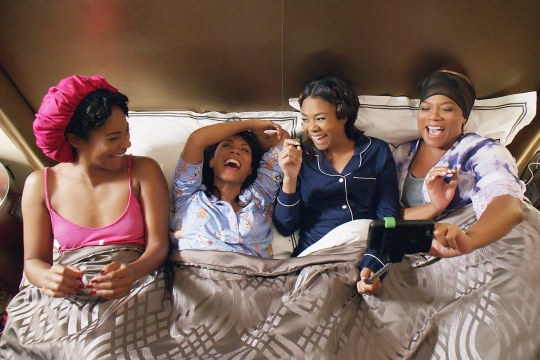
Perhaps it’s the Bridesmaids or The Hangover of 2017, Girls Trip is a fun, buddy comedy about a group of women who try to rekindle their friendship during a trip to New Orleans. Queen Latifah and Jada Pinkett Smith are always reliable and Regina Hall is an underrated lead, but it’s breakout star Tiffany Haddish that gets the biggest laughs.
24. All The Money in the World

All The Money in the World is a good film on its own, but what makes it historic is what went on behind the scenes. Ridley Scott pulled off the impossible by replacing its disgraced star Kevin Spacey with Christopher Plummer with only roughly a month ahead of its original Christmas release. The film is based on the events of the 1973 kidnapping of John Paul Getty’s grandson. All The Money is a highwire thriller, but it’s Plummer’s brilliant, cold-hearted performance that steals the show.
23. Okja

Korean director Bong Joon-ho behind such films as The Host and Snowpiercer debuted this gem. Okja follows a girl’s battle to protect her “superpig” from a juggernaut company that plans on turning her pet into food. This action adventure was easily one of Netflix’s strongest original films to date. The stellar cast includes Tilda Swinton, Paul Dano, Jake Gyllenhaal, Steven Yeun, Lilly Collins, and newcomer Seo-hyeon Ahn.
22. Battle of the Sexes

Emma Stone and Steve Carrell face off as Billie Jean King and Bobby Riggs in the most historic tennis match in history. Battle of the Sexes is a fun, empowering, nostalgic sports dramedy from Little Miss Sunshine’s Jonathan Dayton and Valerie Faris.
21. Stronger
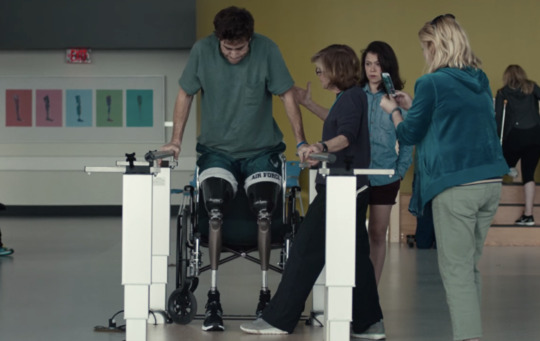
Based on the incredible true story, Stronger follows Jeff Bauman and his struggle for normalcy after surviving the Boston Marathon bombing. Time and time again, Jake Gyllenhaal proves to be one of Hollywood’s most under-celebrated actors today as he arguably gives the most challenging performance of his career. Tatiana Maslany (Orphan Black) also deserves praise for her raw, emotional supporting role. Stronger is a powerful, moving biopic that reminds us that there’s always hope even in the darkest moments.
20. Split

After releasing numerous duds, it appears that M. Night Shyamalan is finally making a comeback. Split kicked off 2017 with a wild psychological thriller surrounding the kidnapping of three young women who’ve been imprisoned by a man with multiple personality disorder. James McAvoy gives a memorable performance as he channels well over a dozen personalities.
19. Wonder Woman
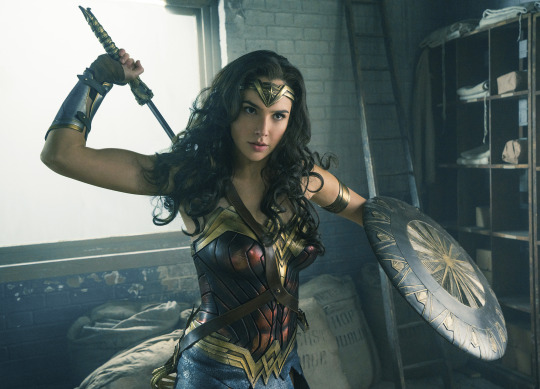
Wonder Woman broke the glass ceiling on many fronts: one being the first female-lead superhero blockbuster and such a blockbuster was directed by a woman. Gal Gadot made her big-screen debut as the Amazon princess in Batman v Superman: Dawn of Justice, but she absolutely nails it in her first solo flick. Many have considered this film to be the strongest film in the DC Cinematic Universe yet.
18. Alien: Covenant

Ridley Scott certainly kept himself busy this year. In the latest chapter of this deep-space horror franchise, a colony ship makes a fatal detour on a planet filled with our favorite aliens. Accompanied by an all-star cast, Michael Fassbender is on double duty with two fantastic performances. While Prometheus settled the groundwork, Alien: Covenant returned to its heart-pounding roots that made these films such a big success.
17. It

Very rarely do remakes exceed its predecessors, but the 2017 remake of Stephen King’s It really deserves praising. Bill Skarsgård managed to make Pennywise his own with his terrifying interpretation of the murderous clown. That being said, the film heavily relies on the tremendous cast of young actors including Jaeden Lieberher, Sophia Lillis, Finn Wolfhard, Jack Dylan Grazer, Wyatt Oleff, Chosen Jacobs, and Jeremy Ray Taylor. Filled with good scares and disturbing imagery, It will have a new generation afraid of clowns.
16. Darkest Hour
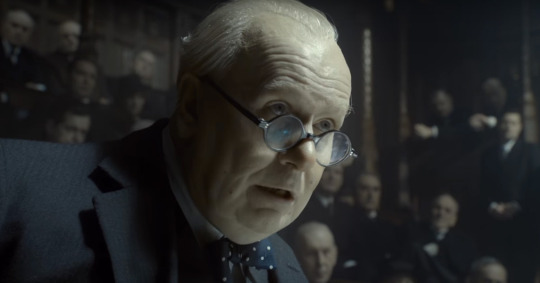
Gary Oldman gives a transformative, Oscar-worthy performance as British Prime Minister Winston Churchill in Darkest Hour. The film takes place during the chaotic transition period the United Kingdom face in the midst of WWII and gives a glimpse of Churchill’s bumpy start to his successful era of leadership. Darkest Hour is a captivating drama with sprinkled humor throughout.
15. Get Out

Part horror, part thriller, part social satire, Get Out marks the directorial debut of funnyman Jordan Peele. An interracial couple is put to the test when the black boyfriend visits the white girlfriend’s family, but once he gets there, he’ll learn that her family may have something sinister planned for him. While it’s sort of hard to explain it, Get Out is a unique, thought-provoking, movie-going experience unlike any other in 2017 that’s carried by a strong cast and an intriguing plot.
14. The Wedding Plan

Chances are you haven’t heard of The Wedding Plan, but it’s one of the most relatable films of the year. This Israeli romantic comedy follows an anxious bride-to-be who decides to keep her wedding date after her fiancé dumped her just weeks before and literally relies on faith in order to find a groom before she walks down the aisle. Yes, the plot’s that zany, but Noa Koler’s heartwarming and heartbreaking performance truly carries the film.
13. Dunkirk
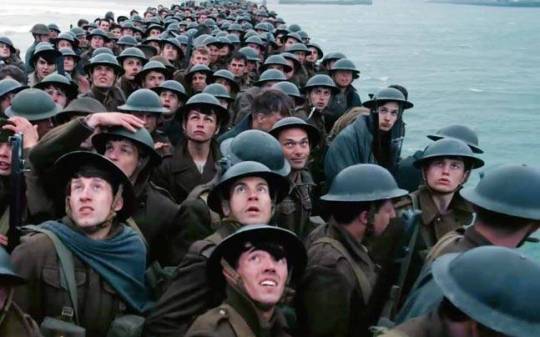
It’s been three long years, but Christopher Nolan returned with an immersive war flick Dunkirk, which depicts the underdog WWII rescue effort of the British military that was surrounded by German troops. While there isn’t exactly a straight-forward plot, the incredible cinematography, editing, and sound design keep audiences on the edge of their seats.
12. War of the Planet of the Apes

An epic conclusion to one of the strongest trilogies in recent memory, War of the Planet of the Apes was a rare reboot that actually exceeded its predecessors. For three films, Andy Serkis brilliantly humanizes the lead ape Caesar as the climax escalates the brutal battle between human and ape.
11. The Shape of Water
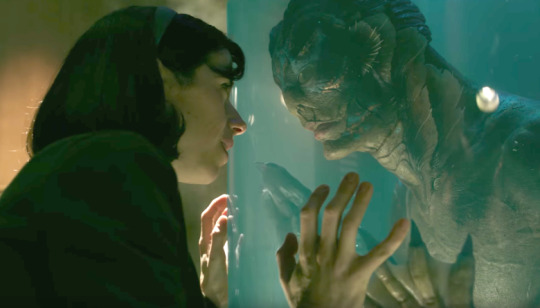
If Beauty and the Beast and Creature From The Black Lagoon had a beautifully weird baby, it would be Guillermo del Toro’s latest film The Shape of Water. The story surrounds a mute janitor who forms a relationship with a creature trapped in the laboratory she works at and her personal mission to help him escape. She doesn’t even speak a word, yet Sally Hawkins gives one of the best performances of the year and she’s joined by a spectacular supporting cast including Octavia Spencer, Michael Shannon, Richard Jenkins, and Michael Stuhlberg. Visually stunning and emotionally enthralling, this is del Toro’s best film since Pan’s Labyrith.
10. Call Me By Your Name
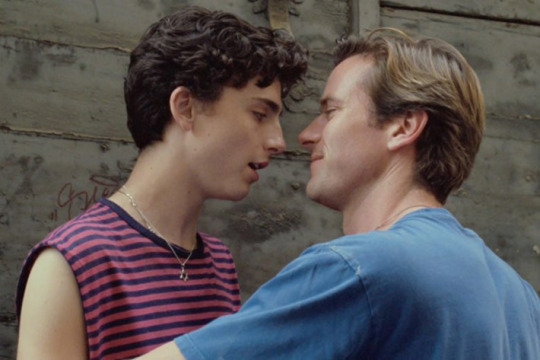
An emotionally complex film, Call Me By Your Name tells the story of a romance that blossoms between a 17-year-old boy and his father’s 24-year-old research assistant. In the wake of the #MeToo movement, such an inappropriate relationship would/should be frowned upon, but as viewers, you sympathize with Elio and Oliver not just because they’re likable characters but for the powerful performances that came with them, particularly from breakout star Timothée Chalamet.
9. The Killing of a Sacred Deer

The closest thing to an Alfred Hitchcock film in 2017, The Killing of a Sacred Deer is a suspenseful, psychological thriller that virtually no one saw. The film follows teenager who gets brutal revenge after a doctor failed to save his father’s life. Newcomer Barry Keoghan, who you’ve might have seen in Dunkirk, gives a unsettling, outstanding performance. Between this and his last film The Lobster, writer/director Yorgos Lanthimos is proving to be a filmmaker Hollywood should watch out for.
8. The Disaster Artist

If you haven’t seen The Room, it’s a 2003 film that has earned a cult following because it’s so incredibly bad, it became unintentionally hysterical. The Disaster Artist is about the making of that film with James Franco starring, producing and directing the film. Franco manages to earn big laughs and also give a transformative performance as the infamous Tommy Wiseau. With tons of A-list cameos and a brutal glimpse of the film industry, The Disaster Artist made the making of a painfully bad film painfully funny.
7. The LEGO Batman Movie
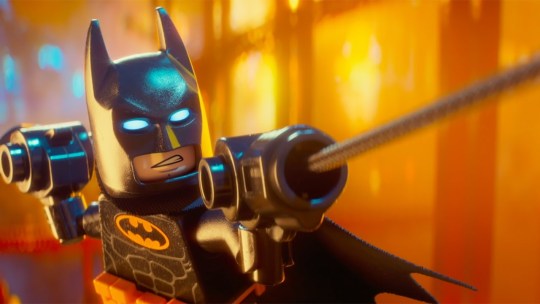
Not only was this a great animated movie, it was also a great Batman movie. The LEGO Batman Movie allows its self-awareness to drive the narrative that examines Batman’s relationship on a psychological level. Filled with tons of fun Easter eggs and references to previous Batman films, this LEGO movie will leave you nostalgic and laughing til it hurts.
6. Lady Bird
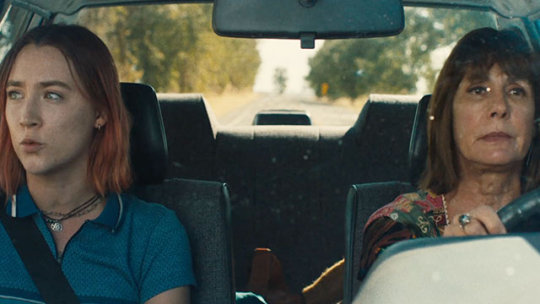
Actress Greta Gerwig makes a strong directorial debut with this down-to-earth coming of age comedy about a Sacramento teen transitioning into adulthood. In film after film, Soirse Ronan shows that she’s one of the best actresses in the millennial generation and Laurie Metcalf, who may win the Oscar playing her heartfelt but judgmental mother, shows that she’s one of the most under-celebrated actresses of our time.
5. The Big Sick
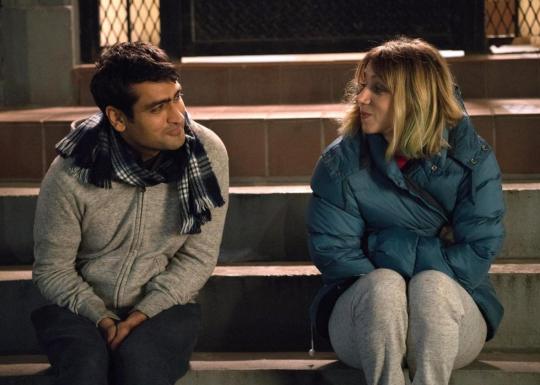
The greatest romantic comedy since Silver Linings Playbook, The Big Sick is a rare film because it feels authentic and real... and that’s probably due to the fact that it’s based on the stranger-than-fiction true story behind Kumail Nanjiani and Emily Gordon’s relationship. Nanjiani essentially stars as himself (which he does a terrific job) and has great chemistry with his co-star Zoe Kazan. Ray Romano and Holly Hunter give hilarious, heartwarming performances as the parents who meet Nanjiani as their daughter is in a coma. From the culture clashes, the comedy industry, to the modern era of dating, The Big Sick feels more relevant than ever and can resonate with any audience.
4. Coco
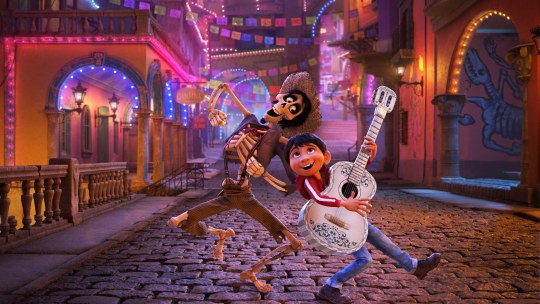
Disney/Pixar has a gift of continuously melting people’s hearts. And they do so again with their beautifully-animated latest, Coco. Miguel is an aspiring musician in a family that has banned music after his great grandfather abandoned them for pursue stardom. And after being transported into the Land of the Dead, Miguel must track down his ancestor in order to return home. The importance of art is obviously a theme, but the heart of the film is about family, pursuing our dreams, and the significance of leaving a legacy. Coco is rich with a cast of lovable characters, great music, and a satisfying ending that may leave you in tears.
3. Three Billboards Outside Ebbing, Missouri
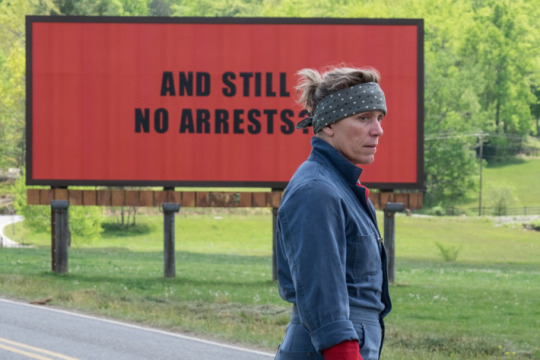
Three Billboards Outside Ebbing, Missouri may be a mouthful, but it’s also masterful work from writer/director Martin McDonagh. Frances McDormand gives an Oscar-bound performance as grieving, no-nonsense mother determined to pressure the police to solve the murder of her daughter. She is accompanied by a strong ensemble cast which include strong supporting performances from Sam Rockwell and Woody Harrelson. Three Billboards is the only film this year that will make you laugh, cringe, and anxious all at once. It’s the closest thing to Fargo since Fargo... and the Fargo TV series.
2. Baby Driver

Edgar Wright, the mastermind behind Shaun of the Dead, Hot Fuzz, and Scott Pilgrim vs. The World, finally found commercial success with Baby Driver, a terrifically-edited heist film with the greatest film soundtrack in recent memory. Aside from the uncomfortable fact this will go down as Kevin Spacey’s last great film, Ansel Elgort proves he’s got the chops for a leading role. With lots of well-choreographed action sequences and even some laugh, Baby Driver is absolute fun and is why we go to the movies.
1. I, Tonya
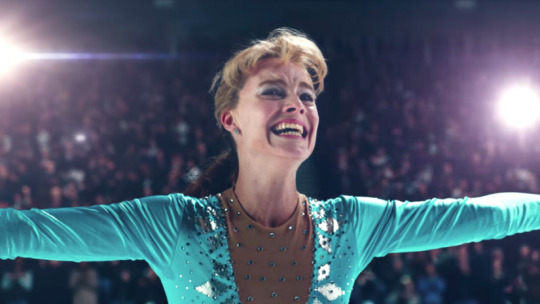
Who would have thought that it would take a dark comedy to make Tonya Harding look sympathetic? I, Tonya is a unique, Goodfellas-like biopic that gives multiple, not entirely reliable perspectives surrounding the infamous attack of Nancy Kerrigan. Margot Robbie offers a layered, grounded depiction of someone who was painted as a cultural villain. Allison Janney also knocks it out of the park as her cruel yet hilarious mother. The works of director Craig Gillespie and screenwriter Steven Rogers have spanned decades, but their collaboration here is the best of their careers. Combined with great editing and an awesome soundtrack, I, Tonya is a rare film in 2017 that isn’t just another remake, sequel, or ripoff; it skates on its own.
#Margot Robbie#Wonder Woman#Gal Gadot#Call Me By Your Name#Baby Driver#Girls Trip#Tiffany Haddish#Jake Gyllenhaal#Coco#the lego batman movie#The Big Sick#Lady Bird#The Disaster Artist#James Franco#the killing of a sacred deer#Dunkirk#The Shape of Water#I Tonya#Get Out#It#Okja#Emma Stone#James McAvoy#Steve Carell#Michael Fassbender#Saoirse Ronan#Batman#Guillermo Del Toro
5K notes
·
View notes
Text
Everybody Loves Raymond: 10 Moments When The Show Broke Our Hearts
For over nine years, Everybody Loves Raymond lit up TV screens with its signature humor. Based on the comedy of Ray Romano, the series aired from 1996 to 2005 and is still widely regarded as one of the most hilarious sitcoms of its era.
Almost a decade and a half after Everybody Loves Raymond stopped airing new episodes, it lives on in reruns and is as hilarious as ever. Every sitcom offers its share of less-than-hilarious moments, though. Some more than others; Friends had very few poignant moments, while How I Met Your Mother was so riddled with upsetting, emotional scenes that it became regarded as a dramedy.
Everybody Loves Raymond, like every sitcom, broke a few hearts during its nine-season run. Being a show that focused completely on the Barone family and their everyday life, the sadder moments on the show were usually quite emotional.
Let's take a look at the 10 times this beloved series broke our hearts.
10 WHEN FRANK AND MARIE SHARE A TOUCHING MOMENT

Frank and Marie's marriage is unusual by today's standards, and they have at least one argument every episode. The majority of Frank and Marie's issues and bickering are played for comedic purposes, but on rare occasions, one of them goes too far.
RELATED: 5 Sitcoms That Should Be Revived (& 5 That Shouldn't)
Sometimes, this leads to a touching moment. Whenever Frank and Marie are being emotionally intimate together, Everybody Loves Raymond manages to tug at its audience's heartstrings.
9 MARIE AND DEBRA'S FOUR-EPISODE LONG FIGHT

Marie and Debra's bickering is a major part of the show. The plots and/or subplots of most episodes usually have to do with one of their fights or issues with each other. The payoff for this usually ends up with the two of them (sort of) making up, but in the season 6 episode "Mother's Day" this was not the case.
This episode was the first of four in which Debra and Marie engaged in an emotional, extremely drawn-out fight. They took turns giving each other the silent treatment and Everybody Loves Raymond flirted with a more poignant side to this relationship during those episodes.
8 THE DANCING EPISODE

In an extremely fun and entertaining episode of Everybody Loves Raymond, the whole gang (including Amy) are holed up at Frank and Marie's house during a neighborhood-wide blackout. This episode is not only hilarious, but it has a lot to offer emotionally.
RELATED: Early 2000s Sitcoms Which Defined That Era Of TV
One of the focuses in this episode was Frank and Debra's relationship. In a moment where Frank and Debra are dancing, she comments that she didn't think he could be this fun, which surprisingly hurts Frank's feelings. The two eventually make amends, and the entire episode is equal parts funny, heartwarming, and heartbreaking.
7 AMY AND ROBERT'S TUMULTUOUS RELATIONSHIP

Robert went many seasons being Raymond's unfortunate, painfully lonely brother who longed for a wife and family of his own. His journey was one of the more complex on the series, and it shifted when Debra introduced him to Amy McDougall.
Robert and Amy would go on to become happily married, but the road to this payoff was a rough one, with the two being a notorious on-again-off-again couple for several seasons.
6 "A LOVELESS MARRIAGE!?"

In an episode where the family starts to notice that Marie is struggling with her vision, she hilariously dons a ridiculous-looking pair of glasses and is given a new lease on life. Marie begins to see things that she hasn't before, mainly several of her family members' "glaring flaws".
RELATED: 10 Things That Make No Sense About Everybody Loves Raymond
She causes them to get self-conscious, but her nitpicking evokes a different reaction in Frank. In an emotional moment, Marie tells Frank that she now sees she's in a loveless marriage, causing Frank to lose it, screaming, "a loveless marriage?!" in one of the most emotional scenes in the series.
5 ROBERT'S EXISTENTIAL CRISIS
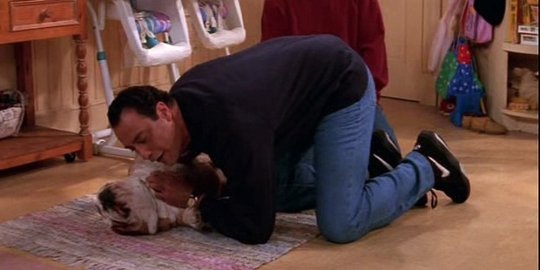
Robert was always portrayed as being a down-on-his-luck kind of guy, forever longing for a different life and desperately envying Raymond's good fortune. Not only did Robert have a dysfunctional marriage and messy divorce, but he was never the favored child in the Barone family.
After some bad break-ups, Robert reevaluates his situation and becomes extremely depressed. He confides in Marie that he believes he'll be alone forever, which is completely heartbreaking.
4 RAYMOND TELLS ROBERT TO GET A LIFE
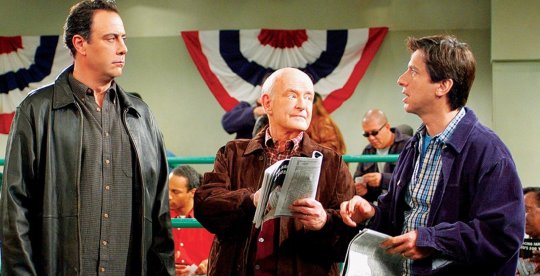
On the topic of Robert, his relationship with Raymond was always a complicated one, since Robert envied his young brother so much. Robert loved Raymond's kids and enjoyed being their uncle, but in one episode, Raymond becomes jealous and gets tired of "Uncle Robert".
RELATED: The 5 Best & Worst Episodes Of Everybody Loves Raymond According To IMDb
Robert just wants to take his niece and nephews to the zoo, but Raymond harshly tells him to "get his own life".
3 FRANK REVEALS HIS PAST
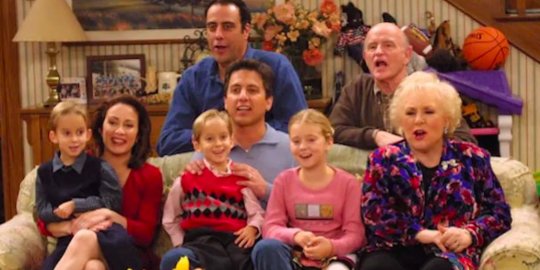
Frank had always been an unapologetically gruff, crass, and sarcastic character. He rarely - if ever - showed affection or emotional vulnerability to his loved ones, because this was a concept he considered to be utterly ludicrous.
RELATED: Everybody Loves Raymond: 10 Jokes That Have Already Aged Poorly
In one episode, though, Frank reveals that he got hit all the time as a kid. This heartbreaking revelation is made all the more profound when Robert states, "but you never hit us".
2 ROBERT'S LUCKY SUIT

Robert's career in Everybody Loves Raymond was primarily the sergeant of a police department, but there was one episode where Robert set his sights on a position in the FBI. Being extremely nervous about his interview, Robert insists on wearing his "lucky suit".
But Marie has other ideas. While ironing Robert's suit, she puts a very noticeable burn hole in it. Whether she did this on purpose or not remains unknown, but Marie did not want Robert to get a job at the FBI because the thought of this stressed her out. This episode offers some emotional insights to Robert and Marie's relationship.
1 RAYMOND'S BRUSH WITH DEATH
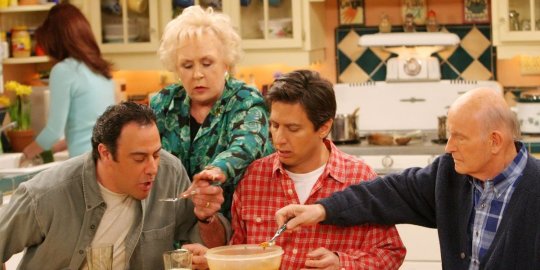
The series finale of Everybody Loves Raymond was arguably the most emotional, tense episode of the series. The show presented a good balance of comedy with many touching moments, but the episode was obviously a sad one for fans of the show and the cast and crew themselves.
The plot of the series finale revolves around Raymond's surgery to get his tonsils removed, in which he momentarily stops breathing, evoking panic in the family. Everyone envisions what like would be like without Raymond in an emotionally charged scene, and the Barones ultimately realize how lucky they are to have each other.
NEXT: Everybody Loves Raymond: 10 Storylines That Were Never Resolved
source https://screenrant.com/everybody-loves-raymond-moments-broke-hearts/
0 notes
Photo

Kevin Cage of @spotlightsaga reviews... Orange is the New Black (S05E09) The Tightening Airdate: June 9, 2017 @oitnb Ratings: @netflix original Score: 8.5/10 **********SPOILERS BELOW********** And suddenly #OITNB5 becomes a horror film in 'The Tightening'. It's a fitting name and it certainly sounds like either a horror film or some sort of off-brand porno you might find in someone else's secret stash that makes you question just exactly what they're into. However, the latter is definitely not the feeling 'The Tightening' evokes. The opening scene even plays to horror roots with shaky camera work and first person perspective as Piscatella (Brad William Henke) watches the inmates and makes his cat-like moves (as an oversized bear) amongst the darkness along the hallways and corridors of Litchfield Prison. The music, the editing, the slamming of the cage door as he takes Blanca (Laura Gomez) as his first victim... It's all very 'Halloween or 'Friday The 13th', most definitely in the key of a psycho-slasher film in the late 70's and 80's. He even delivers a one-liner that most likely sounds like 'Judge Dredd' in his head. Blanca slowly turns around and I immediately think of Bruce Campbell in 'Maniac Cop'. Bare with me, the horror references are going to be real with this one. The music highlights the horror homages that are running rampant throughout 'The Tightening' and only elevates the terror in our first abduction of the episode. Piscatella has fn' lost it and we all should be terrified. Red (Kate Mulgrew) looks a bit out of her mind... She's certainly doing better than she was when Nichols (Natasha Lyonne) found her with a pencil with human flesh stuck to the end of it, a crowning moment of S5 for sure, but I definitely see why people would have a hard time believing anything that spawns from her brain and connects to words that escape her mouth in the state that she's in for most of the episode. People are going missing and trust me, even in a half revved up/half crashing state, clues are everywhere (whether they're truly there or not)... And if there's actually something to really follow those clues to, the whole hunt can become even more intense than it already is. But who's going to believe the old woman who's out of her mind for the first time ever in her life? A hard boiled Russian who's always had control, or at least always grasped for it in impossible situations as we see in her flashback. Suddenly, she looks like she's slipping from any real state of reality... Out of all people tho, I can't understand why Nichols wouldn't at least act as Red's play-along 'Shaman Guide'. I would think she at least owes her that. Nichols feeds her a 'I'll be right back' line... OMG, they are really going for Horror Tropes in every way they possibly can and I absolutely love it. This is a dream come true for me... A women's prison dramedy turns total Horror Slasher. Somebody pinch me, it's all my favorite genres melted into a hodgepodge of totally off-kilter episode. Piscatella has spent 8 episodes being emasculated and dismissed. His plan may seem half baked, and it totally is, but it does seem like a logical plan (or at least next step) for someone who has control issues. Parallels to that theme with Red can be traced and drawn to multiple points throughout the series, but this isn't the same kind of control. Red has shown that she adapts and makes the best of her situation, always moving, always finding a way to either stay on top... Or as we've seen in previous seasons and as we see in this very flashback, she finds ways to bide her time until a real, honest to God, time to strike comes along. Piscatella is basically having his male ego crushed in a trash compactor, an extremely fragile male ego that already he already intensely struggles with juggling and maintaining his own masculinity due to his sexuality and position of power... A power he clearly no longer has. However, Piscatella is still very much also like Red, in the sense that he's looking for the right time to strike, and that right time is now. Due to this very situation being the closest thing a man like Piscatella can come to 'Ego Death' brushing his shoulders (because he sure as shit isn't smoking DMT anytime soon), he recognizes his opportunity and he seizes his moment, barreling into the prison strapped, complete with riot gear and a full arsenal of weapons. He believes he's acting as a hero, but really he's the 'Michael Meyers' of Litchfield... And let's not forget, he's still under the umbrella of MCC. So whatever happens in there, it could possibly hurt MCC in the end, or at least work against them in some fashion. I personally refuse to believe this show will allow Piscatella to penetrate the walls of this prison during a full on 'Hostile Takeover' and walkout unscathed. Unlike Michael Meyers, or other ghoulish 'Horror Icons' Piscatella is mirroring at the moment, he's still human, he can still be hurt. He can still be killed. He's rogue, and the horror is being played to a beautiful key of irony, but in the end Piscatella is just a man... One man against a hundreds and hundreds of some of the most ruthless women around. I would say, 'Good Luck, Piscatella' just out of habit... But I want to see this mother fucker burn! I'd love to close there, because honestly this is exciting, uncharted territory for OITNB to explore, but unfortunately with this series... Even as great as it is, it can never leave well enough alone. The whole 'Slasher Homage' is a huge plus and for me a great way to keep it fresh and new for the series. Unlike most, I've also been enjoying Angie (Julie Lake) & Leanne (Emma Myles) play 'White Trash Villains Let Loose in Litchfield', they harness the same brand of evil that cartoon Siamese Cats would. Essentially they're just dicks, they are relatively harmless because of their daft intellect, but their wicked enough to cause mayhem and push all the right buttons. While the show means for there to be a layer of comedy protecting the duo in cade of a future face turn, it was straight heartbreaking to see anyone mess with Suzanne (Uzo Aduba) the way they did. Unfortunately for them, they are literally decaying via their own stupidity and consequences as the season charges on. Everyone hates them, but that's exactly what makes them two of the best handled characters of S5 so far. Even Lorna's (Yael Stone) exchange with Suzanne in this episode, as reckless as it was, is a true shot at brilliance as two beautiful mentally ill women empower each other... Just in the worst way possible. Surprisingly, It's Gloria's (Selenis Leyva) storyline I have the most trouble with. I know she's in a bad way right now, and I did appreciate her back and forth with Aleida (Elizabeth Rodriguez), who even in her total bitch mode maintained a level of heart and family values... Like, 'piss on you but good health to your kids' kind of way. Ending the conversation with, "I'm sick of being right about people," was fucking masterful. I just don't buy Gloria potentially risking everything for something she has to know in her heart is never going to happen. There are factors like Linda Ferguson (Beth Dover) leaving Litchfield with a change of heart and Piscatella's 'Jason Voorhees at Camp Crystal Lake' style rampage that act as variables that could create seriously unexpected results, but when I think of OITNB, I just don't think of happy endings... And Gloria is an OG. No matter how desperate she is, would she really risk it all just to be reminded the heavy truth of her situation? Just to have a tall, cold glass, of cold hard reality be thrown directly into her face? I just don't think so... Not Gloria... It just can't be.
#oitnb#oitnb season 5#OITNB Meme#OITNB5#Orange is the New Black#The Tightening#OITNB 5x09#uzo aduba#Kevin Cage#Spotlight Saga#Netflix Original#netflix and chill#Horror Homage#horror#horror comedy#TVTime
10 notes
·
View notes